 2024 Spanish Literary Magazine
2024 Spanish Literary Magazine
 Amanda Hubbard – El sabor de la tentación
Amanda Hubbard holds the copyright to uncredited artwork featured in this publication. Any use or reproduction of these images requires her explicit permission. For inquiries regarding the use of this artwork, please contact her directly at amandamchubbard@gmail.com
Amanda Hubbard – El sabor de la tentación
Amanda Hubbard holds the copyright to uncredited artwork featured in this publication. Any use or reproduction of these images requires her explicit permission. For inquiries regarding the use of this artwork, please contact her directly at amandamchubbard@gmail.com
Azahares 2024
Azahares is University of Arkansas-Fort Smith’s award-winning Spanish-language literary magazine. The primary purpose of this magazine is to provide students and community members with an arena for creative expression in the Spanish language, as well as a literary space for writing that presents the themes of the Latino experience. The azahar, or orange blossom, is a flower of special meaning. Representative of new life and purity, azahares form part of the iconic tradition of the Spanish-speaking world, embodying a freshness of spirit and perspective captured with this publication. Azahares highlights student work, as well as the creative endeavors of the greater Fort Smith community and beyond.
Executive Editor
Dr. Mary A. Sobhani
Editorial Board
Dr. Lynda McClellan
Madeline Martínez Santiago
Gray Langston
Susan Buchanan
Student Editors
Marlene Toledo
Contributing Illustrator
Amanda Hubbard
Supervising Designer
Colin McLain
Lead Designer/Cover Illustration
Ally Savage Design Team
Toni Cavillo
Emerald Baker
Alex Berherns
Special thanks to the following:
Dr. Terisa Riley, chancellor; Dr. Shadow Robinson, provost and vice chancellor for academic affairs; Dr. Paul Hankins, dean of the College of Arts and Sciences; Dr. Paulette Meikle, associate dean of the College of Arts and Sciences, and Dr. Linus Yu, associate dean of the College of Arts and Sciences.
The views and opinions expressed herein do not necessarily represent those of the University of Arkansas – Fort Smith or the Azahares Editorial Board.
This project is supported in part by a grant from the Arkansas Humanities Council and the National Endowment for the Humanities.
of Arkansas –
1
University
Fort Smith


Indice de Obras
Azahares – 2024 2
El sabor de la tentación .......... Portada interior Amanda Hubbard El Yunque Vistas – Puerto Rico..............................4 Katie Hughbanks The Cicada ................................................................5 Evan McClellan Hijos de la Chingada................................................6 Robert René Galván Daguerrotype 7 Daniel Ruis and his brother-in-law, Robert René Galván Language Shift ..........................................................8 Madeleine Silva For the Blood of a Poet, Octavio Paz .....................9 Allan G. Scherlen Vaqueros 10 Robert René Galván Melting the Rules 12-14 Jessica Arzola-Grissom Le damos gracias al cabrito .................................. 15 Gloria Lopez The Future of Language Learning .................. 16-17 Jake Linden Just Breathe ............................................................ 18 Jessica Arzola-Grissom A Fiesta on the International Bridge ................... 19 Allan G. Scherlen I Pledge Allegiance to Chicharrones ................... 20 Elizabeth Jiménez Montelongo Bailando bajo la luna ............................................ 21 Jocelyn Soriano Sin Amigos........................................................ 22-26 Fabián González González Untitled 27 Claudia Santos Ñandutí – Paraguay .............................................. 28 John L Bieber Ñandutí 2 – Paraguay ........................................... 29 John L Bieber Ñandutí 3 – Paraguay ........................................... 29 John L Bieber Mientras barre ....................................................... 30 Flor Ortega Punto de reunión .................................................. 31 Madeleine Silva Joipoipo: El primer pasajero 32-38 Alex V. Cruz Esta tarde contigo 39 Irene Cantizano Bescós Raining Down Oranges ........................................ 40 Roger Camp Auxilio .................................................................... 41 Rachel Nuñez

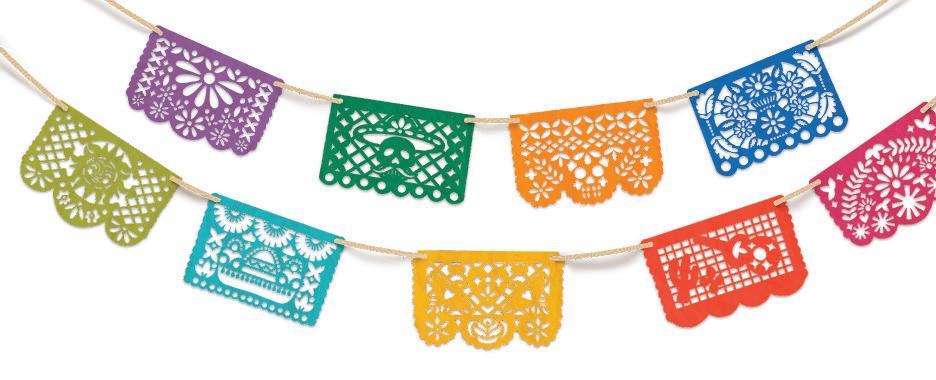
of Arkansas – Fort Smith 3 I Am Scared/ Estoy asustado .......................... 42-43 César Vladimir Brizuela Zelaya Lu Pi................................................................... 44-45 Diane Waite Los sentidos de mi patria chilena ................... 46-47 Jen Ross Laguna Cuba 48-49 Lázaro Gutiérrez El licenciado aprendió a llorar ........................ 50-52 Alex V. Cruz La oruga ................................................................. 53 Casandra Hernández Ríos En el calor ......................................................... 54-55 Carisa Musialik This Our Barrio ..................................................... 56 Alejandra Herández Mexican & American ........................................... 57 Alejandra Herández Quinceañera 58 Alejandra Herández Esta noche bailamos 58 Allan G. Scherlen La libertad – El Salvador ...................................... 59 Miroslava Arely Rosales Vásquez Los límbers ............................................................ 60 Gabriella Hernández Donato Los días en México................................................ 61 Athziri Romero Las Hermanas and Dad ................................... 62-63 Gloria Lopez La lucha de ser mujer............................................ 64 Lila Chapman De colores 65 Richard D. Mahoney Cauldron ................................................................ 67 Karina Guardiola-Lopez Margaritas on a Mysterious Island ................. 67-74 Steve Davidson Lista de contribuidores .................................... 75-78 The World Launguages Department at UAFS ............................................ 79 Call for Submissions ............................................ 80 Viejo San Juan Cobblestone –Puerto Rico ............................... Contratapa interior Katie Hughbanks
University
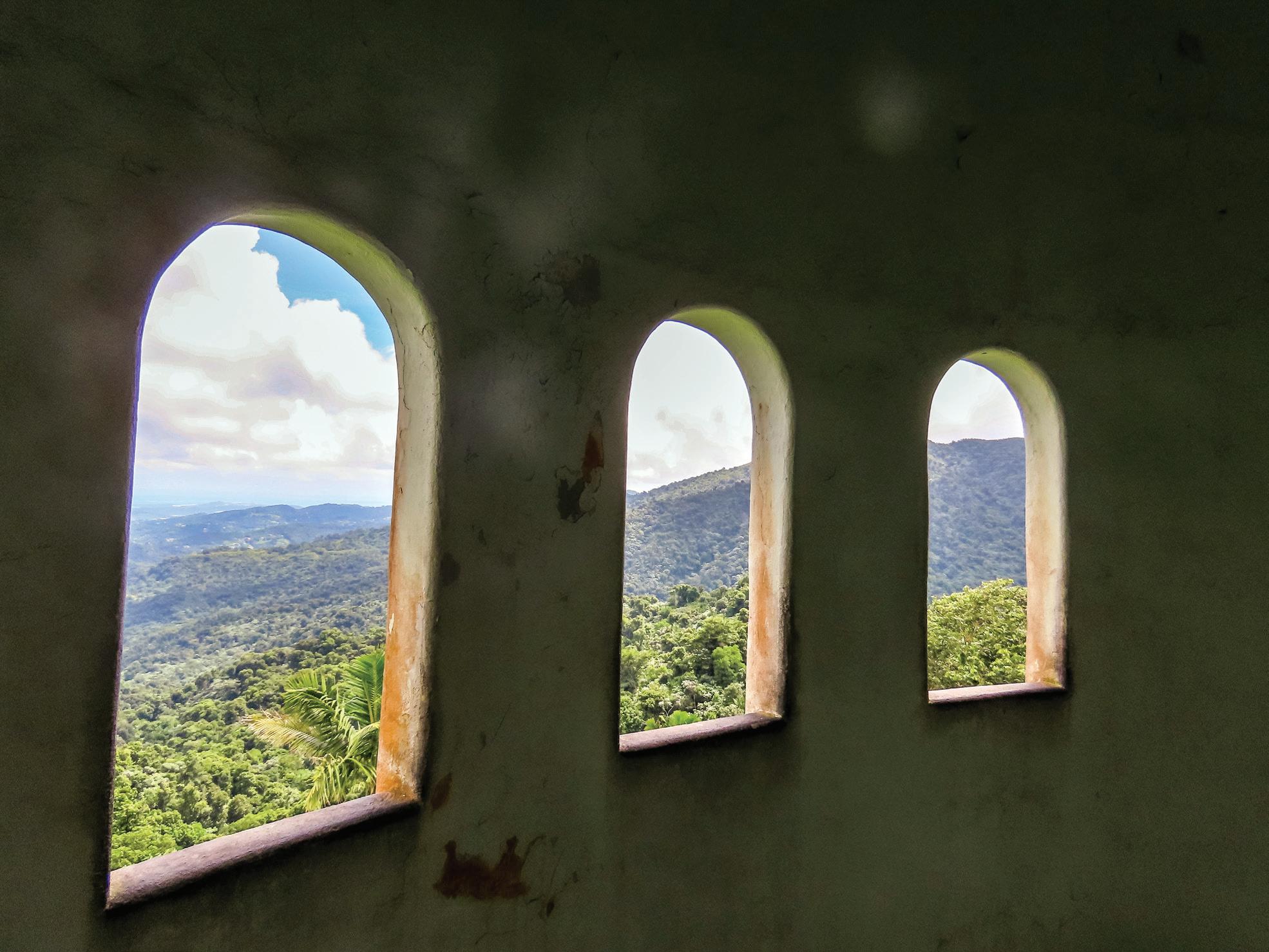
Azahares – 2024 4
Katie Hughbanks - El Yunque Vistas - Puerto Rico
The Cicada
Escondida de hasta rayita de luz de la arboleda arriba
Envuelta en raíces de un vientre cariñoso de un olmo
Una perla descansa de su aventura tan dolorosa,
Allí no se puede recibir daño ni angustia
Aunque a veces sólo lo puede sentir
Pero creciendo en una arboleda de luz es fácil
Con la ayuda de todas que vinieron antes
Veamos el pasado con solemnidad
Las grandes figuras como pilares de luz
Haciendo los cimientos al fin de apoyar los que llegan
Sin duda sigue creciendo la perla
Aumentada por la savia de amor
A un ser tan fuerte y sabio
A un ser tan débil con ceguez
Disminuido por la chafa de derechos
Con cáscara dura por los productos de su fe
La perla cava de su lugar para hacer su papel
De convertirse en un ser más capaz de pagar la deuda
Ella toma su posición y se pone a atención
por Evan McClellan
Para participar en una ordenanza para cambiar toda lo que era antes
Una metamorfosis ocurre, y con sus poderes nuevas ella vuela
A un lugar disimilar de todos los que conocía antes
A la tierra de muchos árboles, donde la primavera es eterna
Allá ella descubre sus fortalezas y sus debilidades
Pero al fin la chafa que estaba a su fundación le falla
Regresando de esa alegría ella cargaba algo nuevo
Un regalo lleno de su propia luz, su propia historia
A la arboleda de luz, donde enterrda está su familia
Para plantar y construir su propio pilar
De la semillita de la ceiba que carga ella
University of Arkansas – Fort Smith 5
Mother of us all –you who had no choice but to learn that twisted tongue from our father, that ladrón who infested your womb with his seed, drove us to the borderlands where we could not escape from ourselves, even as we crossed an open wound in the desert.
A diaspora in our own land, our blood cannot purge the plague of self-loathing, and now, another invader wants to build a wall where it has always been.
Hijos de la Chingada
by Robert René Galván

Azahares – 2024 6
Daguerrotype – Daniel Ruis and his brother-in-law
by Robert René Galván
We eat the white man’s food, and it makes us soft; we wear the white man’s heavy clothing and it makes us weak. Yes – we know that when you come, we die - Ciparoti, an old Yuma woman
My ancestors, dressed as dandies, only their dark faces and hands visible, imprisoned in lace-up leather shoes.
Daniel, standing, holds his overcoat and gloves, neck strangled by a stiff collar and cravat, hair bereft of feathers, neatly parted on one side with tortoise shell tines, his native eyes glare at the lens.
His brother-in-law, seated left, placid gaze unaffected by the flash of powder, fingers poised in a most delicate gesture, his hair swept back as if by the desert wind.
What brought them to this dim parlor with the Persian rug and grey walls, a respite from the dusty rancho and rough work?

University of Arkansas – Fort Smith 7
Language Shift
by Madeleine Silva
Understanding is a lie, a fool’s errand of my own undertaking.
To think that I’m sorry means the same this morning as it did last night
Lo siento does not directly translate But this is what I say To convey my regret
On my way does not mean I’ll arrive on time or that I’ve departed
Survival sometimes means hoarding clothes in your closet until they spill into the hall
And healing now means drawing a line in the sand, defending it with your life.
Limón, I try to explain, is both lemon and lime Depending on context.
Abuelita told me she smuggled one in her suitcase and planted it in her garden.
She used her hands to show the careful layers of clothing covering the contraband
In this context, I am the limón
She is showering me in words and phrases I ask for the translation, but the meaning slips away.
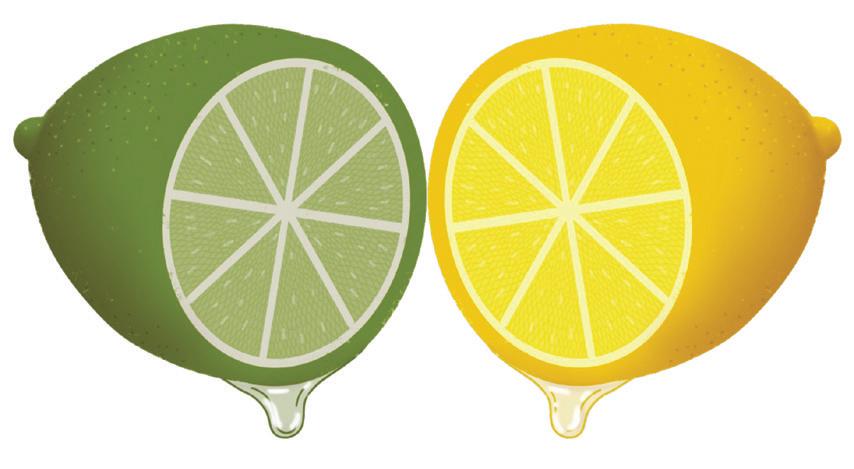
Azahares – 2024 8
For the Blood of a Poet, Octavio Paz
by Allan G. Scherlen
The Mexican poet, Octavio Paz, read his poems, in San Antonio, touching politics to poetry, poems in Spanish, well-advertised and popular with fans;
Paz encountered his loud crowd after his speech, As he stood with the forward marching fans, seeking a famous Paz signature;
some offered the poet a rolled ad poster to sign; I waited, slightly back from this pulsating crowd, As they pushed so hard, a guy in front jabbed
his pen into Paz’s finger, drawing blood. I saw its red dripping off the distinguished Mexican poet’s hand. Octavio Paz
pulled away to look at his hand, “¡Espere!” he commanded, stopping the mayhem of the crowd. They looked at the poet in silence,
and Paz seeing the ads waiting to be signed. The poet spied me, holding his book, “El Arco y La Lira,” a treatise, and he pointed
at the book, signaling me to come and step through the fans; Paz asked, “What’s your name?” and he wrote with his injured hand; Paz and I held this short time in the love of his poetry and his spilled blood; both holding El Arco for a moment.
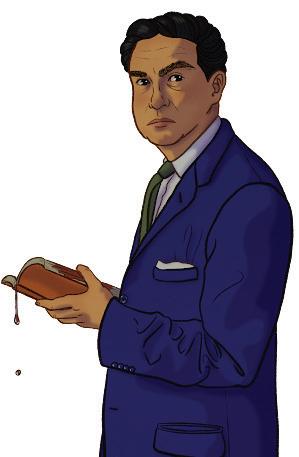
University of Arkansas – Fort Smith 9
Vaqueros
Inspired by the Moorish horsemen, the Castellanos set out in wooden ships across an alien sea with stalls of stallions treated better than men, fed and lovingly groomed for the day they would dance upon the land to the music of cruel spurs.
The Aztecas had never seen such a creature and thought it was an enormous, sweating stag of which the rider was a part – a mystical beast to be feared, and yet the indios became its master with lazos and chaparreras, estribos and botas, and when strays escaped to the north and multiplied masteñeros gathered and broke them for the gringos.
by Robert René Galván
Allá en el rancho grande, Grande Julio Mireles went out with his nine sons after a pot of café del campamento and cigarros, huevos rancheros.
He taught the Tejanos his craft, his charros begat Kings in the fields claimed by barbed-wire and rifles (to steal a horse meant hanging), and when the dueño learned all his secrets, vaqueros gave way to “buckaroos” with their chaps and lassos, stirrups and cowboy boots, mis parientes, mojados.
Azahares – 2024 10
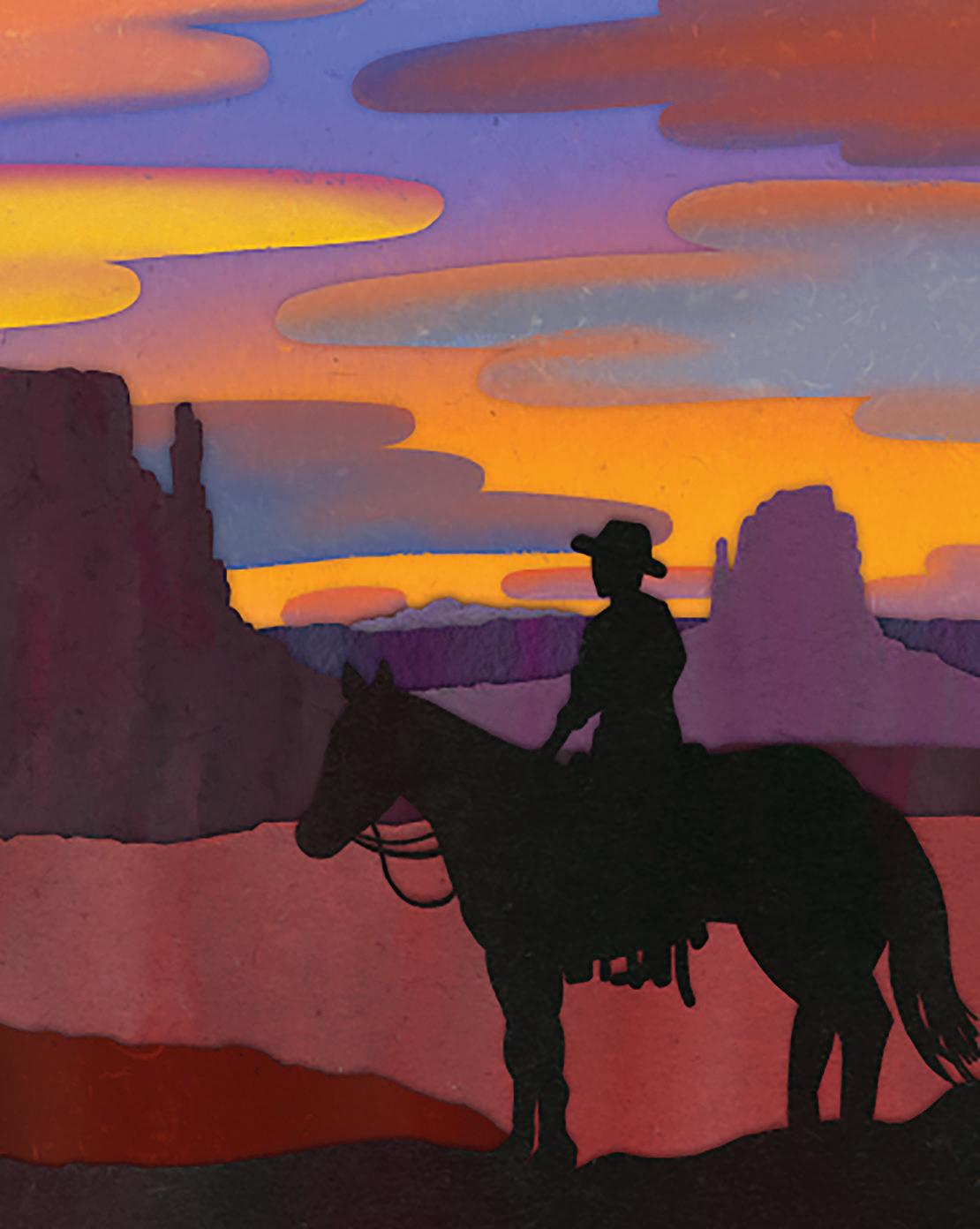
11
University of Arkansas – Fort Smith
Melting the Rules
We grew up in an apartment. Since we were there for such a long time, we sometimes bent the rules. Sometimes we’d break the rules. Other times, we simply melted them. Like the time we put nails in the walls to hang up the pictures. Or when we planted monkey grass along the sides of the building. Occasionally, we ran down the hall and disturbed our downstairs neighbor.
My favorite rule to break was when Mom painted our apartment windows from top to bottom right after Thanksgiving. She used some kind of washable paint and painted larger than life snowmen, snowwomen, and snow babies. They wore top hats, scarves, and buttons. On one of the patio doors, she painted a Christmas tree with ornaments in red, yellow, and white. The three of us kids were fascinated by the window décor, and it made everything look quite festive. The apartment managers didn’t love it, but they only sent letters and Mom assured them it was washable paint.
Unfortunately, Mom stayed in bed most of October, November, and December. She was pregnant with our sister, Olivia, and had horrendous morning sickness. The kind of morning sickness that caused her to throw up multiple times a day and later I found out she’d lost twenty-five pounds. She lay in bed or on the couch for almost three months with a bowl beside her.
by Jessica Arzola-Grissom
Our church brought us all the “fixings” for Dad who made Thanksgiving dinner by heating up a ham and making instant mashed potatoes. My memory is a bit foggy, but I am thinking I helped open the cans of sweet potatoes, green beans, and corn. He wasn’t a cook, but we had fun. He was quite proud of himself and those instant mashed potatoes.
Mom also managed to walk him through the process of making Bisquick pancakes for us kids. When he was growing up, it was the women who were supposed to work in the kitchen and take care of the babies. He was the third kid in his family, and got used to having his mom, older sister, and younger sister wait on him. He even admitted a few times that he was mean to his younger sister and said, “Hey, Patty. Get me a tortilla and Coke!” She got super mad because she wanted to watch the football game too, but she waited on him because that was the way life was then.
Of course, I tried to help as much as I could –being eight years old I could do things like scramble eggs (the smell sent Mom puking), make toast, and “teach” my younger siblings. Mallory was five and Stephen was three. I taught them whatever was on the preschool and kindergarten agenda. I’d pretend I was Ms. Beasley from Little House on the Prairie so it didn’t seem like work, but rather perpetually playing pretend.
Azahares – 2024 12
As Christmastime drew closer, I heard Mom and Dad talking about Christmas presents. She was in no shape to shop. Besides, Dad went every week to the washeteria to wash and dry our laundry. Most of the time, we went with him to help and view those quarters disappearing into the machine. I was fascinated by how that worked. I’d play with the kids and forget I was also a kid too because I felt quite responsible and in charge. It went well until we realized we’d forgotten to check the pockets in everything and we’d melted Dad’s cinnamon gum into all of our jeans.
About a week before Christmas, Dad went to a place called Traders Village –an outdoor flea market located about 20 minutes away from Dallas. All of us kids LOVED the place except for the port-a-potty experience and melting from the Texas heat. Mom couldn’t stand Traders Village (for the same reasons –sweltering heat and rank toilets) but told Dad he was welcome to go shop there if he could find stuff. He assured her he could find some good stuff, but hoped we would like it.
One time, I’d shopped there, and Dad bought me a beaded coin purse that had pink, red, and white fabric, and covered with what looked like tiny bubbles. It had a tiny little kiss lock and I’d store my special change in there. My favorite coin was the Canadian nickel because it had the Queen’s face on
it, and I couldn’t understand why our coins didn’t have women on them. I liked Canadian coins much better.
One morning when I woke up, the apartment was quite chilly. I looked out the window. It was overcast and looked cold. In the living room, the windows started sweating a bit due to having the heater turned on. I started getting upset when the snowpersons started melting. I thought Christmas might be ruined! Suddenly, I saw the presents under the tree.
Mom awoke from her doze, and said, “Ya’ll don’t touch those presents. Some of them might break. No shaking, no rearranging. Leave them there until Christmas.”
We grumbled a bit about that, but we were excited. On Christmas morning, we bounded out of bed and headed for the living room. As paper flung around the living room, we all gasped at the presents revealed. I was elated when I pulled out a burgundy box with a Scarlett O’Hara doll inside.
Mom and Dad told me I couldn’t have a porcelain doll until I was ten years old because they were expensive and might break. However, Dad found a good deal at Traders Village and went ahead and got one for me. He found Anna Karenina for my sister. I thought Mallory’s doll looked regal all dressed in green satin and fur, but I loved my doll so much.
University of Arkansas – Fort Smith 13
Now, I know it was supposed to be the BBQ picnic dress, but it was ecru trimmed with pink tulle. She wore a pink hat and had two perfectly curled locks of black hair. It was so beautiful, and I was so happy I almost cried.
Today, I look at my doll in the case and smile. Not long ago, Dad left this world. He wasn’t a man of many words, but I know he loved us kids. That year, he spent extra time making sure we were okay by making instant mashed potatoes, doing the laundry, and getting me
a porcelain doll. That was the year he learned how to break some of the rules too. Those are the moments I remember and melt into tears of remembering.
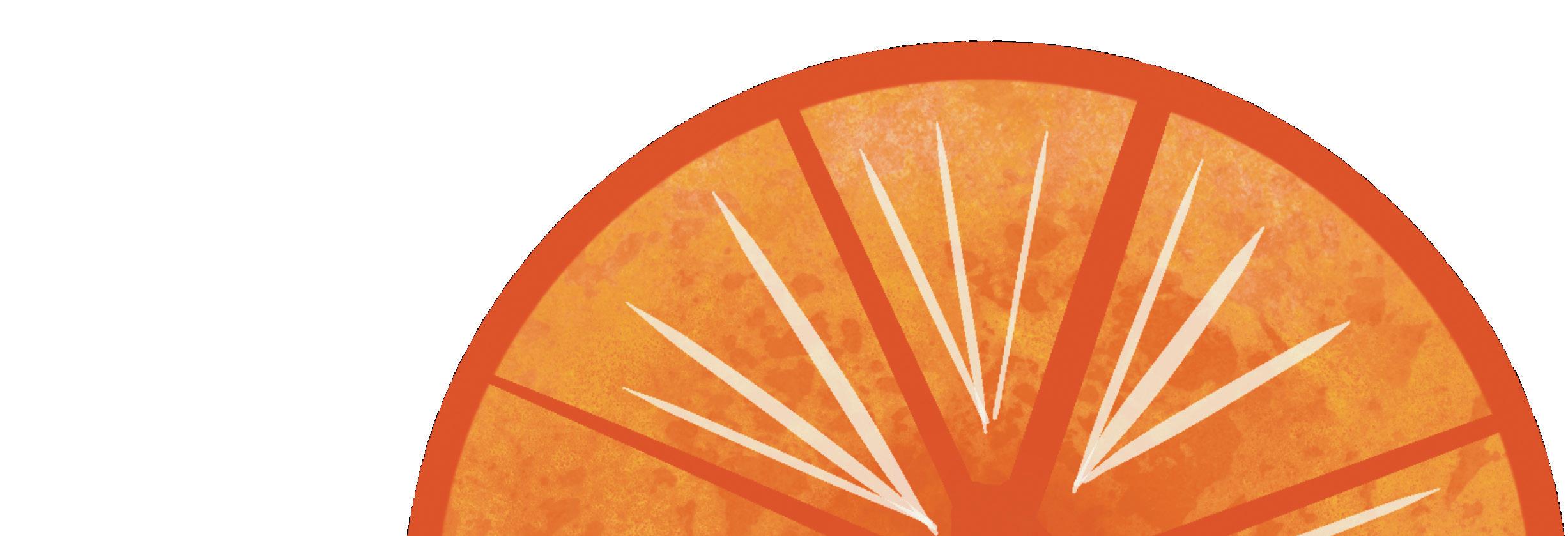

Azahares – 2024 14
Cabrito is a baby goat slaughtered in a specific manner then prepared as a stew in its blood— cabrito en sangre. Brown gravy is made from the blood of the baby goat, covering the bits and pieces of white tender goat and organ meat. The aroma of oregano and the holy trinity of Mexican cuisine: ajo, pimienta, y comino perfumes the air as the game and blood simmer in the pot. Each spoon holds gravy, pieces of goat, heart, and lung. This is not typical of every Mexican household, but my father grew up with goats as food. This was his way of sharing a small bit of his child-
by Gloria Lopez
hood. Cabrito was the only food that we saw prepared from beginning to end. The slaughter, the collection of the blood for the gravy, the bleating of the goat until there no longer was a sound. Then there was the reverence my mom gave the baby goat as she prepared the meal. Speaking to it, “gracias, Dios, gracias, cabrito — perdónanos, Dios y perdóname, cabrito.
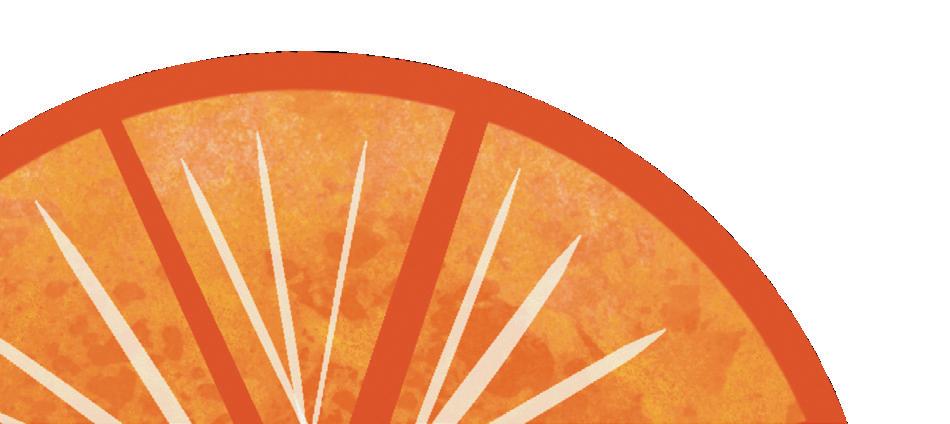
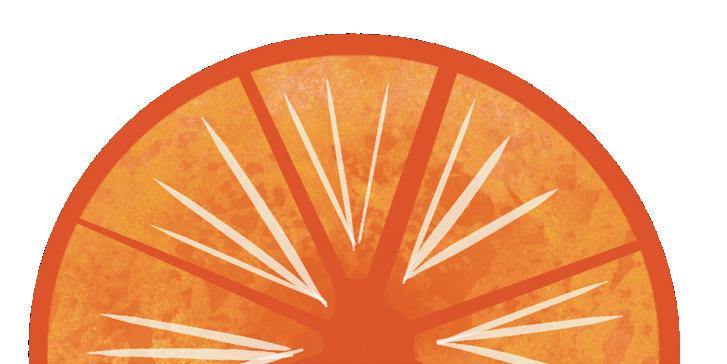
University of Arkansas – Fort Smith 15
Le damos gracias al cabrito
The Future of Language Learning
by Jake Linden
Está helao, weón conchetumadre.
“It’s cold, man, fucking Christ.”
Párate con traducirme, weón.
I have to. Otherwise they won’t understand what you’re saying.
Van a entender. No te preocupes.
How?
¿Cómo?
Sí, how?
No son idiotas weón. Tienen celulares, pueden usar un diccionario. ¿O no? Conchetumadre pueden entender.
They’re going to want to understand it right away. They don’t want to have to look up every single word on their goddamn phones. Trust me.
¿Confía en mí? ¿Qué tal si confías en mí? Es mi discurso. Puedo hacerlo como quiero. Si quieres contar tu propio cuento no te voy a detener.
I don’t want to tell my own story. My job is to translate your story. That’s what I’m being paid to do.
¿Y quién te está pagando?
I don’t know…I guess you are. Or whoever handles your finances. Your manager maybe.
¿Y quién le paga a la mánager?
You do.
Eso.
Eso, ¿qué? So what?
Azahares – 2024 16
Así es. Yo le pago a la mánager y ella te paga a ti. Entonces sigue que tu sueldo viene de mí. Puedo decirte si no quiero tus servicios.
But… But the people won’t understand then. If you want people to understand your ideas you’ll need––
¿Quién? ¿Quién no va a entender? Continúas diciendo que “ellos” no van a entender pero los que deben entender, entenderán. Estoy harto con tus excusas.
Fine. I’ll leave, is that what you want?
Sí conchetumadre, por último. Sí, es lo que quiero.
And what do I say when your manager asks where the English translation is? What do I give to the English-speaking audience?
Dales esto.
¿“Esto” qué? This what?
Esta conversación.
That’s it? Just whoever understands, understands? And the rest can scroll past? You’re supposed to be presenting the audience with an innovative theory of communication. A theory that, in your own words, “argues that every technique we use to teach foreign languages in the classroom is misplaced.” But you want me to just type up this conversation, slap your name on it, and call it “The Future of Language Learning?” Doesn’t that seem a little ridiculous to you?
No. No. That’s it. No. Sí.
University of Arkansas – Fort Smith 17
Just Breathe
The teapot on the stove whistles sharply causing me to quickly come back to the reality that haunts my dreams. I pour the steaming water over the strainer and watch delicate, blue flowers float to the surface. It’s easier to think about tea. Leaves and flowers are harvested, dried, and blended to make a perfect calming liquid. Cautiously, I sip the hot beverage. I don’t want to get burned again. Everything in my body screams against facing more pain.
My life is like the water in a teapot. I simmer, simmer, and simmer until I reach my boiling point. I spew over and leave splashes of the damage. I become a version of myself that I don’t want as I simmer too long.
They didn’t mean it. It was an accident. Of course, they weren’t being mean. They didn’t realize what they were doing. They’re simply ignorant of the harm. We all hurt each other from time to time. I can’t let this bother me. Why am I so sensitive? It’s not that big of a deal.
My co-worker noticed the change in my countenance. I wear my feelings on my face and sometimes despise myself for it. She asked what was wrong. She noticed things when I didn’t want to notice myself. Suddenly, the torrents of water spilled from the depth of my being. She looked at me kindly and with compassion, but firmly said just breathe.
by Jessica Arzola-Grissom
Some days I will myself to calm. I think about the women who pick the tea leaves. Many of the women return to work the day after they give birth. Laboring in the hot sun, with a baby strapped to their back. Their aching bodies are screaming for healing and rest. Instead, they hoist up their inner strength and get up. Day after day, week after week, they fight to provide for the little one on their back. They know the future belongs to their beloved children. They will not give up.
Maybe someday things will be different. Maybe someday they will be treated fairly. Maybe someday they will be equals in their society. Maybe someday it will happen with slow changes. Perhaps those changes will cause a ripple effect like the ones I’ve experienced. I know I am in a better place of agency. This is what I think about as I drink my tea and just breathe.

Azahares – 2024 18
A Fiesta on the International Bridge
by Allan G. Scherlen
That night the international bridge from El Paso to Juarez was closed because of an election dispute leading to Mexican protestors taking over the bridge.
I was in Juarez that day and had the honor of being sealed on the Mexican side of the bridge, standing with them in solidarity. A small TV, propped on a car hood, played the dramatic US news about a bridge takeover; at the center of the bridge, beyond the car with the TV, were multiple barbecues and music boxes playing;
US border patrol stood sternly guard, over an international boundary, shoulder to shoulder; for one night, I was a man locked out of the US, but experiencing the joy of resisting tyranny.
The protesters just sat and waiting in their lawn chairs or lounged on their cars, some chanting political slogans, others dancing to music of the crowded bridge.
“Helicopters are overhead,” I remember the newscaster reporting in English with gravity; but she ignored the upbeat mood of this night of protesters.
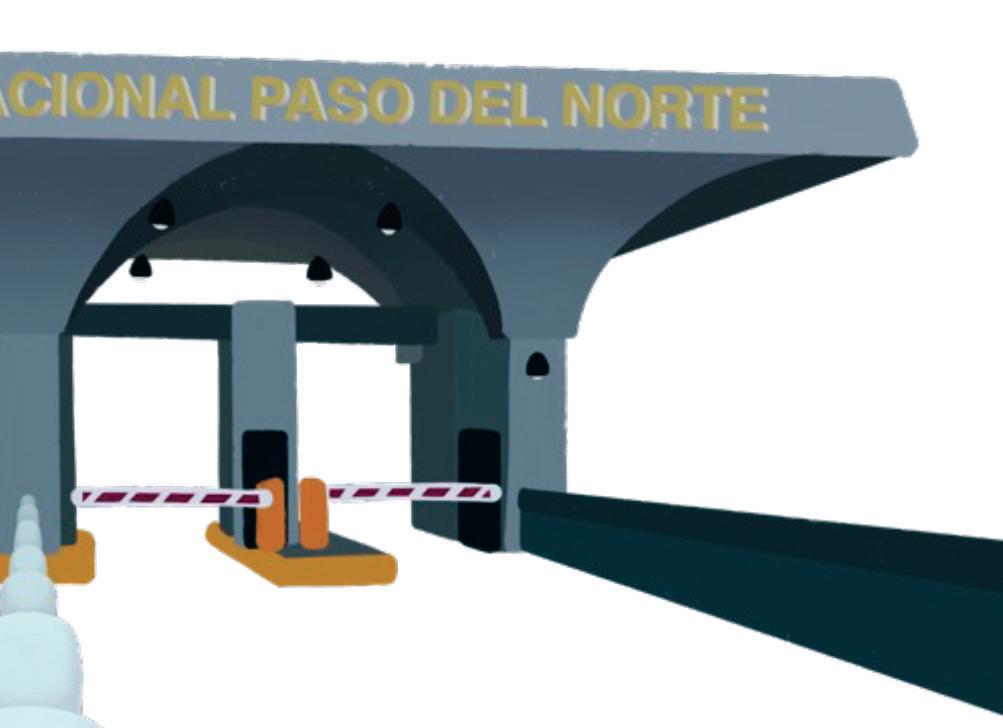
The smoke of fire-roasted tacos with the sounds of fiesta crossed the bridge and surrounded the border patrol – we had the honor of a joyful protest on the occupied bridge.
University of Arkansas – Fort Smith 19
I Pledge Allegiance to Chicharrones
by Elizabeth Jiménez Montelongo
I pledge allegiance to chicharrones
The ones with chile y limón
The crunchy ones
And especially the ones con carne
I solemnly swear to support and defend churros
The ones filled with cajeta, chocolate, o mermelada de fresa
I take you, tamales, to have and to hold
Always received with your hoja intact
I promise to love you, caldo de pollo
In sickness and in health
I will love and cherish you, tortillas
Redonda, amarilla tortilla
Until death do us part
I will serve and protect you, mole
So that you never burn as I stir
I hereby affirm that tacos
Unlike flautas, must never ever be frozen
That enchiladas are not the same thing as burritos
Drenched in salsa
That true tortas must include aguacate y queso fresco
Or at least a jalapeño
I believe in three types of pozole: Verde, rojo y blanco
Best made with maíz nixtamalizado
Yo juro que he comido sopes con frijoles
Enfrijoladas, tacos de frijoles, tostadas de frijoles
Gorditas de frijoles, pupusas de frijoles y corundas –
Rellenas de frijoles, por supuesto
I pledge to eat every camarón in the coctel
To the best of my ability
I hereby declare that I absolutely
Entirely eat huge quesadillas de carne asada
Washed down with agua de piña
Horchata, agua de jamaica o agua de tamarindo
I promise to love and obey
The urge to eat gorditas de milanesa con salsa
I will do my best to do my duty
To my plato and my panza
And to los dientes de mis descendientes
¡Provecho!
Azahares – 2024 20
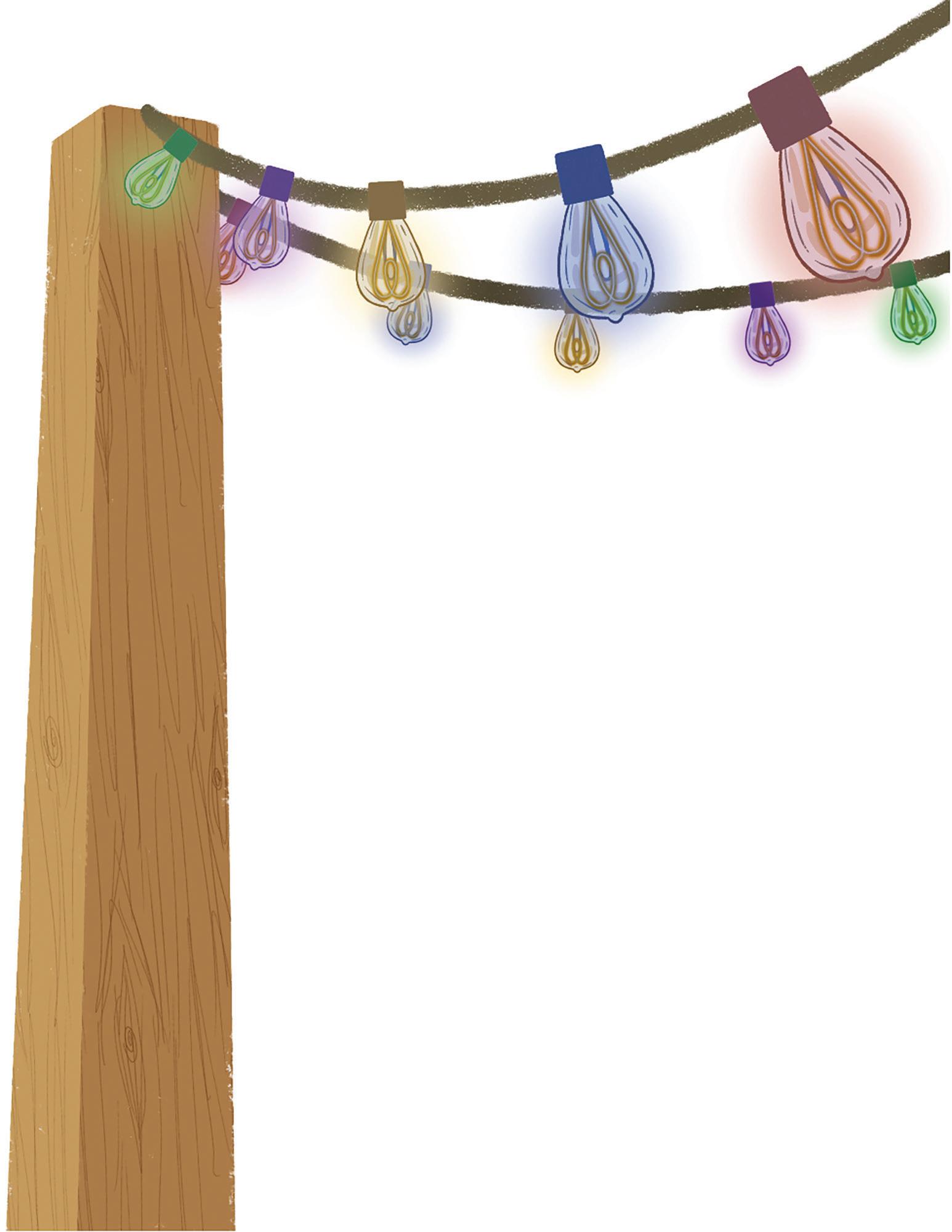
Bailando bajo la luna
por Jocelyn Soriano
Mientras bailamos bajo la luz de la luna fluyendo hacia la noche tu tono dulce me hace cosquillas en el oído
Me meces lentamente al ritmo y con tus delicadas caricias intento no pisar tus pies.
Tiras de la cuerda que conecta nuestros corazones atados, me acercas hasta que no hay espacio entre tú y yo. Miro hacia arriba para verte mirándome ojos verdes que me hechizan, me siento como atrapada en un ensueño.
Seguimos bailando bajo la luna y que este sentimiento nunca se desvanezca.
University of Arkansas – Fort Smith 21
Sin amigos
I immigrated to small town Cedardale, Northern California, the summer of ’98. My first day of summer school was also my very first day at an American school. I remember there were only five other Mexican kids at school that summer, and their little leader, Mini-Alpha or Alpha-Meany, decided he didn’t like me, the bastard. Our teacher had asked him to interpret for me during class, and he had complied without complaint, I dare say with a trace of enthusiasm. So, at recess I sought out his company, but as I approached him and his pack, he said, “¡ Ese puto, vete a la chingada, güey!” and he brandished a little knife, looked like a toy with its yellow-glitter handle, kid stuff pretty much, I nearly laughed. Nevertheless, I went to look for la chingada and felt like the loneliest kid in the whole wide world.
On the second day of summer school, I met a certain Jacob by the school’s jungle gym. I walked around the corner of the jungle gym towards the side that faced south, away from the school buildings, and the most hidden from yard duty supervisors’ views. That’s where I found Jacob, crouching, busy trying to undo one of the support poles’ nut and bolt.
“¿Qué haces?” I asked, and, as if he’d understood, he raised his feline green eyes and began a detailed explanation, pointing here and there to different places of the jungle gym. He ended with an exaggerated motion of his arms going slowly up then quickly dropping with a “Boom!” from which I gathered he wanted to see if he could collapse the structure by removing the nuts and bolts from the support poles.
I looked up at the jungle gym where a good number of children played. I then looked down at the gigantic and corroded nut and bolt he was trying to undo. I thought he was crazy,
by Fabián González González
but having nothing else to do, and no one to hang out with, I proceeded to assist him. I gave it my honest effort until my hands were pink from the strain and rusty.
“Es imposible,” I declared, showing him my palms.
“Impossible!” he exclaimed. “Sí,” I assured, “Impose-ball.”
“Im-pos-si-ble,” he repeated slowly. “Come on!” he motioned for me to follow as he ran and then climbed onto the monkey bars that led to the “castle” part of the jungle gym. I guess he figured if you can’t destroy it might as well enjoy it.
I was about halfway the length of the monkey bars, Jacob two or three rungs from reaching the castle, when all the kids inside started screaming and scurrying out. Jacob jumped out of the way just in time to avoid collision with the first kid who emerged.
“Rachael! It’s Rachael!” They all shouted, along with some other gibberish I didn’t understand. The last little girl who jumped out, probably a first grader, did so with such desperation that as she landed, she hit her face against the ground. Springing up, she looked at me with a wild face, a wood chip stuck on her left cheek, and warned, “It’s Rachael! Run before she eats you alive!” Actually, I didn’t know what the heck she said, but from the look on her face… man, oh, man.
I still hung there, halfway through the monkey bars, when I looked up at her; Rachael, who seemed like a princess in that castle with her shiny, long blonde hair and feline blue eyes. Well, this impression lasted for about a second, for Jacob came back and looked at me in confusion and distress.
Azahares – 2024 22
“It’s Rachael!” He frowned in disgust, as if merely saying her name was like chewing live worms. “Come on!” he said. Then in a cooler tone, “She is no bueno.”
I looked up at her again, gave a monkey smile and let go of the bars, ran alongside Jacob mimicking whatever he was screaming at the top of his lungs.
Before break was over, I think I became Jacob’s friend. As we sat on the ground, beneath an oak tree a few yards away from the jungle gym, we managed to exchange names. He ensured that I understood Rachael was “No bueno.” As he pointed at her, I’m sure she could see him, and I’m sure she very likely understood that she was being discussed in a negative light. When Jacob vociferated, she looked in our direction, then went out of view inside the castle for the rest of recess.
“Let’s hang out together,” Jacob said (I think) and tried to make himself understood by pointing at me, saying, “You,” then at himself, “and I.” He then crossed his right hand’s index and middle fingers. “Together.”
I nodded an acceptance, and when the bell rang, each left to his respective classroom. We met again during lunch break. I had the impression he had suggested we should be friends, therefore I erroneously concluded “together” meant “amigos.”
The next two days transpired similarly. I’d meet Jacob in the jungle gym to play. When Rachael came around, we’d dash like the rest of the kids, although we’d go back to bully her. I guess I was more of an accomplice, though, never bullied her directly, but I’d laugh when Jacob or others did. She always seemed on the verge of crying, but she never shed a tear, not even that Thurs-
day’s lunch break when Jacob shoved her up against the wall inside the castle and she hit her forehead, drawing reddish coloration against her pale skin.
When this happened, I was genuinely shocked, for I was raised with the maxim, “A una niña no se le toca ni con el pétalo de una rosa.” You don’t touch a girl even with a rose petal. This was my mother’s poetic wisdom, reinforced by the vow to cut off my güevos if she ever found out I lay even a finger on a girl.
I expressed my disapproval, very likely with my shocked facial expression, but also by grabbing Jacob’s arm (very, very gently, mind you) and saying, “No, no bueno.”
He looked at me in dejection, as if I’d hurt his feelings, and a silence came over us. The bell eventually rang, and we descended the castle, not excitedly hanging from the monkey bars as usual but quietly climbing down the ladder on the opposite side, the one Rachael always used.
This was the last time I would ever see Jacob, my first All-American friend.
On Friday of that first week of summer school, I was as lonely as on Monday. The oak tree became my solace. As I sat beneath its shade during lunch break, I noticed that the only kids who hung out in the jungle gym, or even its surroundings, were the very young kids, or the older ones, like Rachael and Jacob, who were not well liked by others. I didn’t realize it at the time, but by hanging out with Jacob, along with my immigrant status, I unwittingly labeled myself as a far-flung outcast.
As I leaned against the oak tree, I heard the usual commotion as Rachael took over the castle. All the fleeing kids ran past me onto the football field. Rachael took up her usual post, sitting with her feet dangling. And so, there we were, the two
University of Arkansas – Fort Smith 23 continued
loneliest kids at school merely yards away from each other. But it was until Monday of the following week that Rachael decided to approach me. She’d been at her post when she disappeared into the castle, then descended the ladder. It wasn’t long before I realized she was walking towards me. I became nervous. When she reached my location, she said something I didn’t understand. She extended her hand as if to help me up. She was tall, much taller than I was, and seemed overpowering as she stood, towering in front of me.
I looked towards the field and saw some kids sneering. I felt my face burn and a bit of nausea. My hesitation drew a downcast grimace from her. Just as she began to drop her hand, I reached for it. Some of the kids who saw jeered and said some stuff I was glad I didn’t understand. Rachael and I walked towards the jungle gym, which would become our hideout for the rest of summer school, until we got caught.
That day, we spent pretty much the entire time in silence, language being only one of the barriers to communicate. The next day, we spent recess and lunch break together again. I thought that it was actually nice to have the jungle gym all to ourselves. I suspected Rachael might’ve liked it this way all along. During lunch break, while our feet dangled from the castle, Rachael said, “Let’s sin together” in a hushed tone I hadn’t heard her use before.
At first, I didn’t respond, but then I recognized the word “together” when she repeated, “You and I, let’s sin together.”
With the preconception that “together” meant “amigos” and “sin” being the Spanish word for “without,” I thought she meant that both of us were “sin amigos” (without friends). I assumed the point she was trying to make was that, because of that condition, we should become each other’s
friend. I nodded an affirmation and smiled when she spoke other stuff I didn’t understand.
The next day, we sat inside the castle which was large enough and high enough that we were not visible to the kids or yard duty supervisors; they’d have to climb on the monkey bars or up the ladder to be able to clearly see us. As we leaned again opposite walls, Rachael kept fidgeting with her feet and glancing through the openings. At one point, she stood up and spied on the outside by poking her head out of one of the openings.
When it seemed the rest of the children were on the field, and the attention of the yard duty supervisor in charge of this area had been diverted towards that larger crowd, Rachael sat again. She pulled her panties down to her thighs and pulled her knees towards her chest in such a way that her skirt lifted enough that I could see her private parts.
I was shocked, but absolutely curious. I couldn’t lift my gaze until she spoke and motioned for me to sit beside her.
As if hypnotize, I moved towards her, and she whispered, “Show me yours,” as she tried to undo the zipper on my jeans.
This became our game for the next few days. We’d only do it during lunch break because it provided ample time to ensure it was safe to do so, so that we wouldn’t get caught.
The first time, we only looked at each other’s parts, but the next day, Rachael took my hand and placed it against her warmth, and she touched me as well.
On Wednesday of our third, and final, week of summer school, after only a few days of exploration, which, actually, even included my first kiss, we got caught. We had undertaken the usual precautions, but an additional, unsuspected yard
Azahares – 2024 24
duty supervisor stealthily snuck up the ladder and loudly gasped when she saw us. “Let’s go!” Rachael said, springing to her feet and pulling up her panties in the same motion.
We jumped out the other side of the castle, and the yard duty supervisor blew her whistle as she attempted to chase after us.
Rachael was ahead of me, hair trailing behind her as she entered the football field. I guess her idea was to reach the end and jump over the fence. That’s what I thought we were doing.
We easily ran past the other yard duty supervisors (They were middle-age and elderly ladies), but soon they yelled commands and three or four of the faster boys chased us while the rest of the school cheered them on.
Our escape scheme was thwarted as we had to abort our linear path to the end of the field. We had to zig-zag and jump out of the way multiple times to avoid getting caught, as if playing tag. We ran north, south, east, west, all directions, and at each turn, I realized I was getting farther from Rachael. At one point, still in shock at our precarious situation, eyebrows still rising up all the way to the back of my skull, I looked at her in the distance. Her face, too, was full of shock and adrenaline, but when we locked glances, she smiled wide. I smiled back, and soon we were laughing out loud as we gasped for breath and ran towards each other.
When we did reach each other, we stopped running, fully aware we had no chance of escape. She was flushed; her rosy cheeks and smile made her look like a different Rachael, more wholesome, princess-like once more if only for a moment. A second later, one of the boys reached us and grabbed Rachael firmly by an arm while Alpha-Meany himself tackled me to the ground, the bastard.
At the principal’s office, we were instructed to stay away from each other for the last two days of summer school, and so we did.
This is, pretty much, the end of our story, except that when the regular school year started, we found each other on the third day. She was wearing black jeans and a dark Metallica t-shirt that almost reached her knees. Not her usual dress or skirt, no pastel colors, either. I nearly didn’t recognize her. She was a seventh grader now. I was in sixth.
The seventh and eighth grade playground was separated from the elementary’s by a buffer zone about fifteen feet wide, marked by distinct yellow lines we were not allowed to cross. As if by design, though mere coincidence, the yard duty supervisor in charge of the buffer zone was the same that saw Rachael and me fondling each other’s private parts.
Irreverent to this, for the next three to four weeks (can’t remember exactly how long), we would sit facing each other across the buffer zone during lunch breaks; loners, losers, rejects, outcasts, whatever the term, we seemed to be the only two of our kind now.
One day, while the yard duty supervisor scanned her periphery, Rachael sneakily sent Kisses to me across the buffer zone. Not real kisses, but the chocolate ones. The next day, I brought her a Duvalín and she a Laffy Taffy, next a Bubu Lubu in exchange for a Milky Way, Borrachitos for Sour Heads, and so on. It got to the point that we were throwing the candy across even if the yard duty supervisor saw us. She didn’t say anything. Rachael and I looked closely to see each other’s reaction at the foreign confections meeting our taste buds for the first time. We’d give each other a thumbs up or thumbs down. She didn’t like Borrachitos (which were my favorite). When I tasted Sour Heads for the first time, she started laughing out loud at my facial reaction. She dropped against
University of Arkansas – Fort Smith 25 continued
the black top and lay on her back, placing her hands on her stomach to stop the laughter spasms.
On another day, near the end of the lunch break, she stood up and walked across the buffer zone. I looked over at the yard duty supervisor, expecting hell to be raised, but she looked away, pretending she hadn’t seen Rachael come across.
Once more, Rachael extended her hand as I sat, and this time, without hesitation, I reached for it. When I stood, she gave me a zip bag containing all the types of candies she had given me over the last few days and some other types, too.
She said something, and her face looked grave. To indicate I didn’t understand, I shrugged my shoulders. She released a heavy sigh and, unexpectedly, hugged me. The bell rang and we left. At this point, I was still undecided if she was heavenly beautiful or ugly as hell. But I liked her either way.
The next day she wasn’t there or the day after or the next, until it was clear she wasn’t coming back.
Over the years, once I could understand English, I heard rumors about what occurred those few weeks before Rachael left. While there were many incidents of Rachael getting bullied my classmates liked to reminisce about as if they were “the good old days,” there is one I remember most.
It was said that on the first day of school, Rachael got her first period during P.E., but she wasn’t the first to notice. One of the girls, Kelsey, noticed a stain on Rachael’s P.E. uniform sweatpants and managed to tell most of the class before Rachael or the teacher realized. She went home early that day and didn’t come back the next. When she returned on the third day, students made fun of her new dark outfit, and everyone refused to sit next to her during the first class, some demanding to be sat at least two desks away because “she stinks,” and “needs to close her legs,” they claimed.
The new math teacher, not a genius at solving problems, I guess, unable to handle so many students demanding the same bizarre thing, decided not to punish them as the bullies that they were, but rather to isolate Rachael from the rest of the class. He separated a desk and placed it, not inconspicuous at the back, but right up front, next to the chalk board, where Rachael was instructed to sit. For the first time anyone could remember, Rachael cried.
I wish I’d never heard about this incident, for it is the thing that comes to mind whenever I think of her. While a youth, I remembered her mostly for the other stuff we did, but as an adult, I cannot avoid thinking about the pain that was inflicted on her, the suffering, and those tears that I remember as if I had witnessed them myself. I cannot avoid thinking that at one point during that memorable summertime, I laughed along with others at her.
I never saw Rachael again. The rest of our classmates? Of course, I’ve seen them. I’ve seen them all; at the grocery store, the gas station, by the river, at malls in neighboring towns… Even people who left around the same time as Jacob and Rachael have come back. But not Rachael, not Jacob. It’s as if the town itself rejected them. As if there were no public place for people like them in this quaint small town in America.
I wonder what I would say if I saw her again. We had a good run that day? I loved her smile? She was my first experience in more aspects than one? Certainly, she is the first person who enabled me to see beyond my selfishness, to see and feel what others felt and empathize. I’m glad I was a reject, just like her, for the better part of my school days. Wherever she may be, I hope she’s running ahead, out of reach of the pack, rose-petal smile, rosy cheeks, and tearless eyes, boundless like the blue skies.
Azahares – 2024 26

of
–
27
University
Arkansas
Fort Smith
Claudia Santos - Untitled
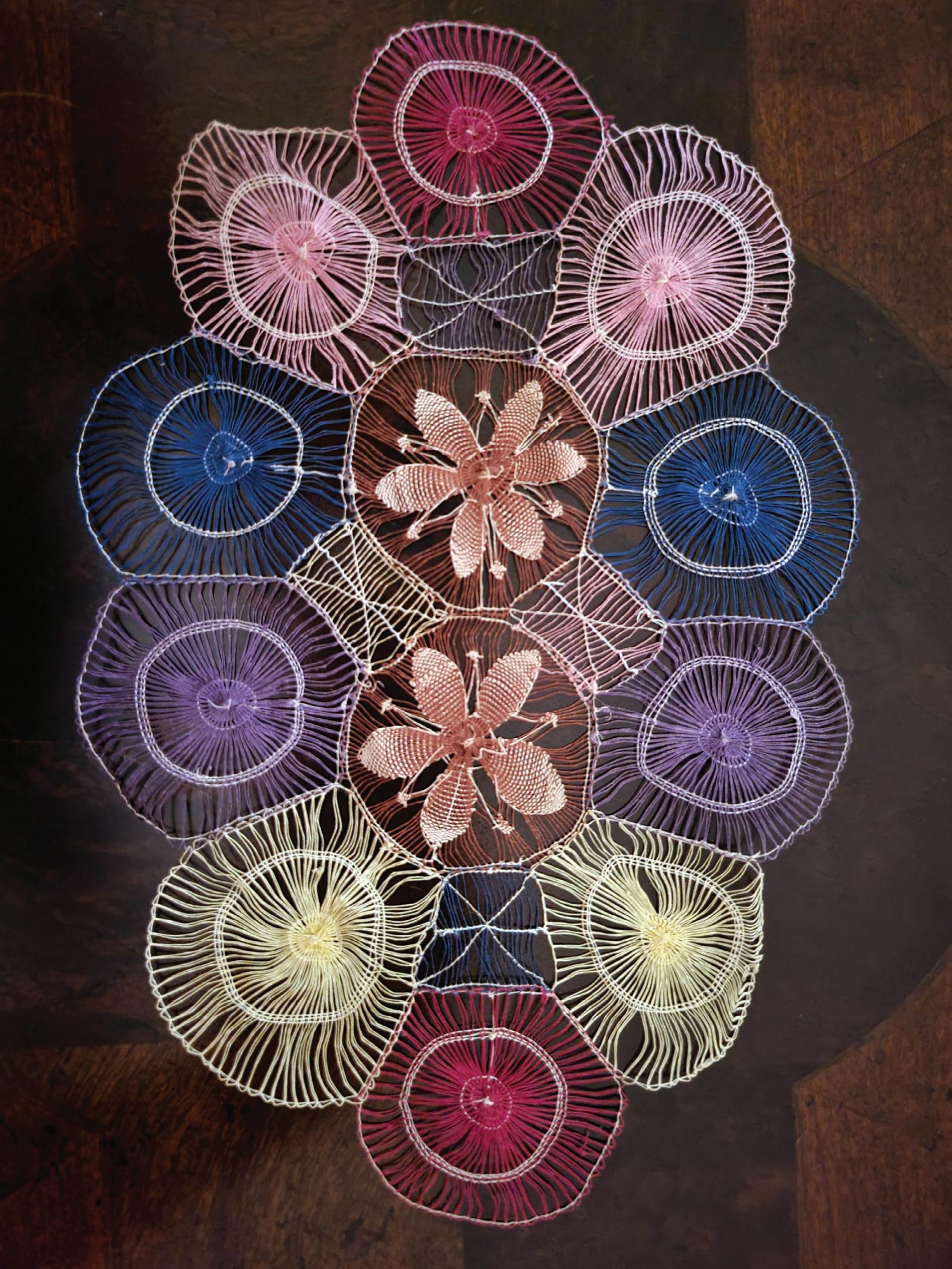
Azahares – 2024 28
John L Bieber – Ñandutí-Paraguay
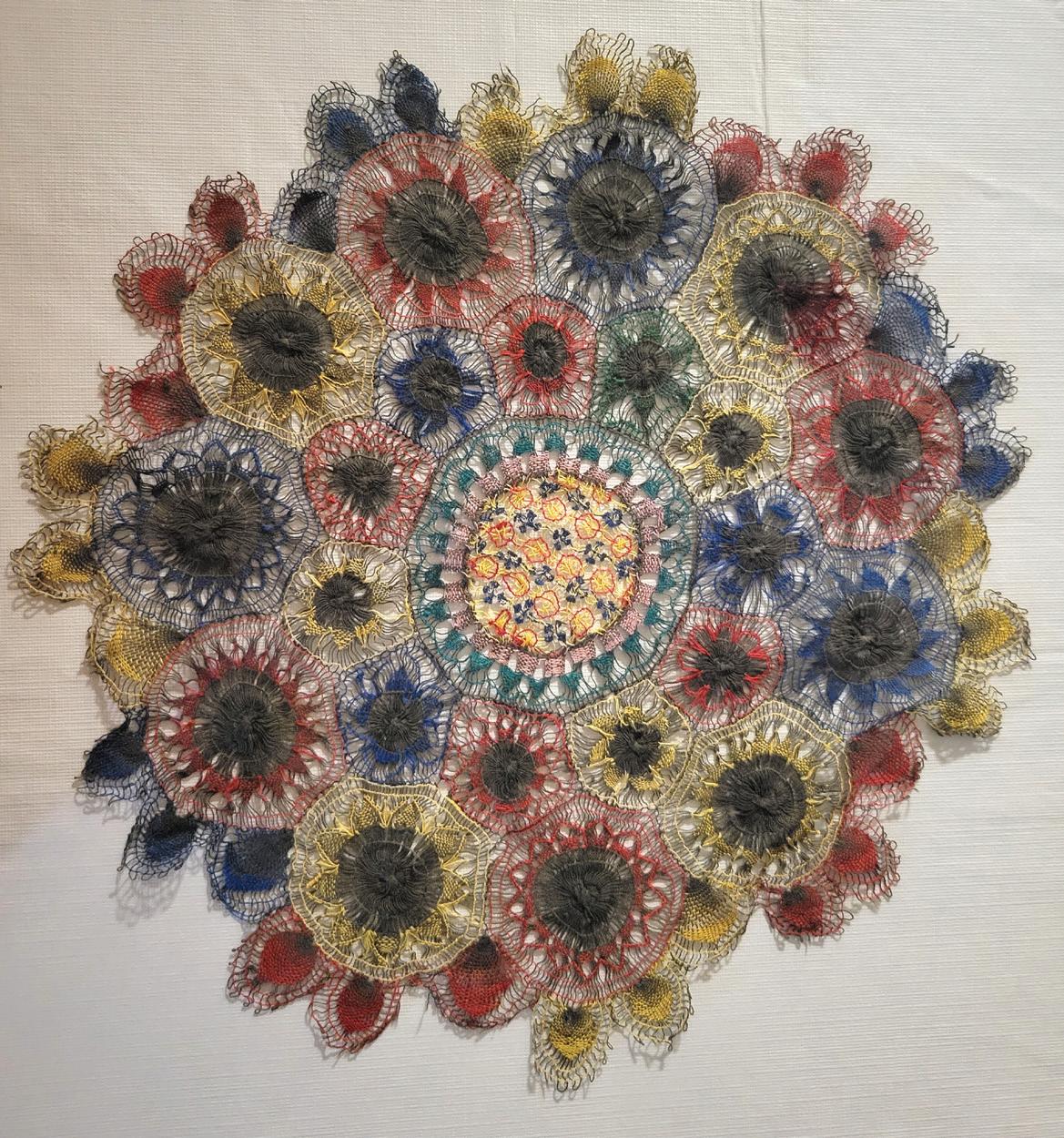
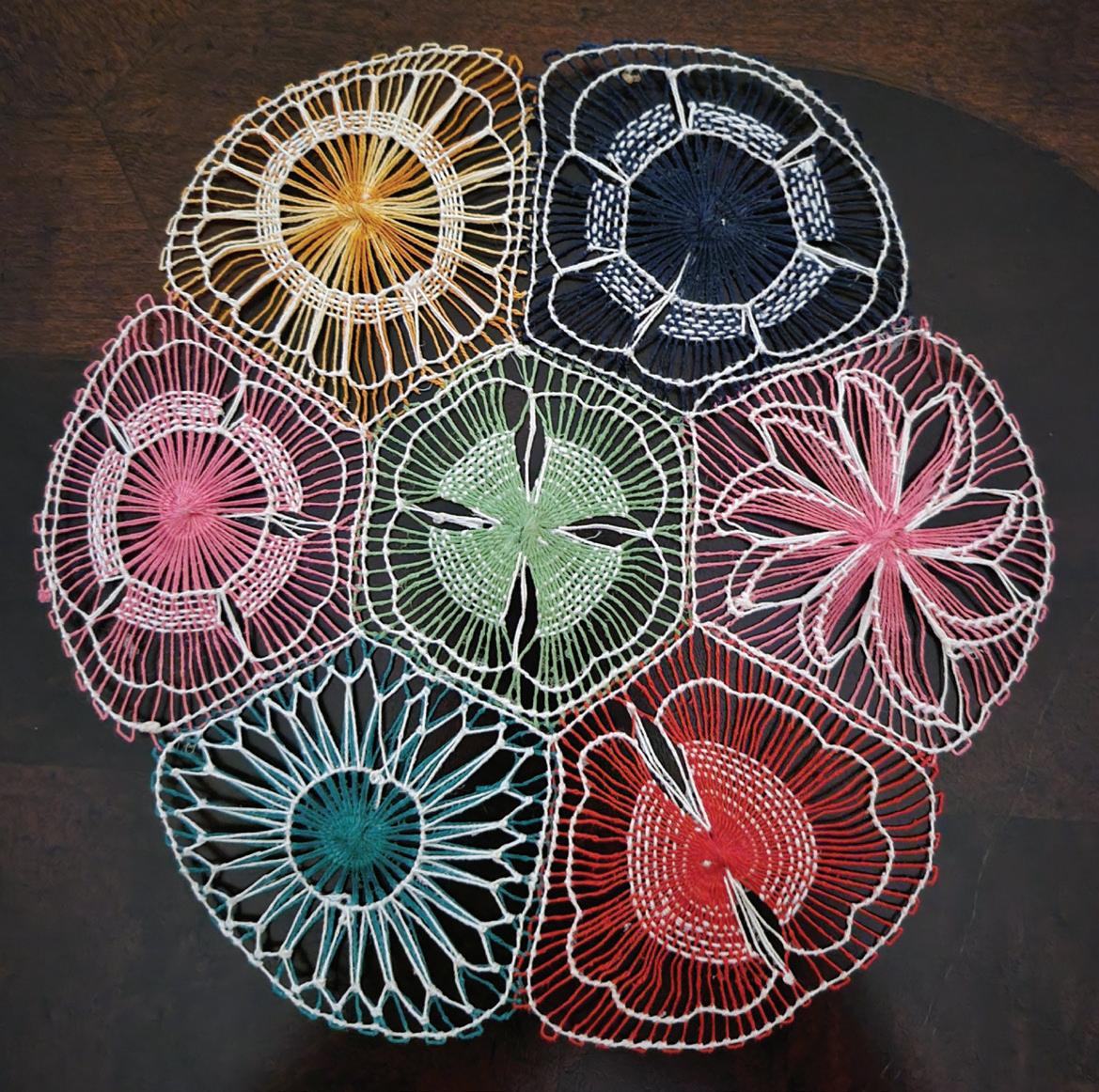
Ñandutí is a type of embroidered lace art created in Paraguay. The word comes from the indigenous language of the region, Guaraní, and means “spider web.” The spokelike structure of foundation threads are typical of the art, resembling a spider web or the rays of the sun. The art form dates back to the 1700s, an adaptation by the indigenous artisans of Paraguay of the ornamental garments introduced by the Spanish during the colonization of America. John L. Bieber obtained these pieces of ñandutí when he and his wife lived in Asunción, Paraguay, under the Alfredo Stroessner dictatorship of the 1970s.
University of Arkansas – Fort Smith 29
John L Bieber – Ñandutí 2-Paraguay
John L Bieber – Ñandutí 3-Paraguay
Mientras barre
Mientras barre el pasillo vacío ¿sabe que la envidio?
En su melanina me veo a mí misma mi herencia en su pelo, pero una vez que abre la boca todo nuestro parecido desaparece. Esta barrera se forma entre nosotras, una Torre de Babel que me aleja de la gente que no me acepta una mirada a mi piel, una mirada a mi nariz y ya no soy una de ellos
¿Sabe que la envidio?
por Flor Ortega
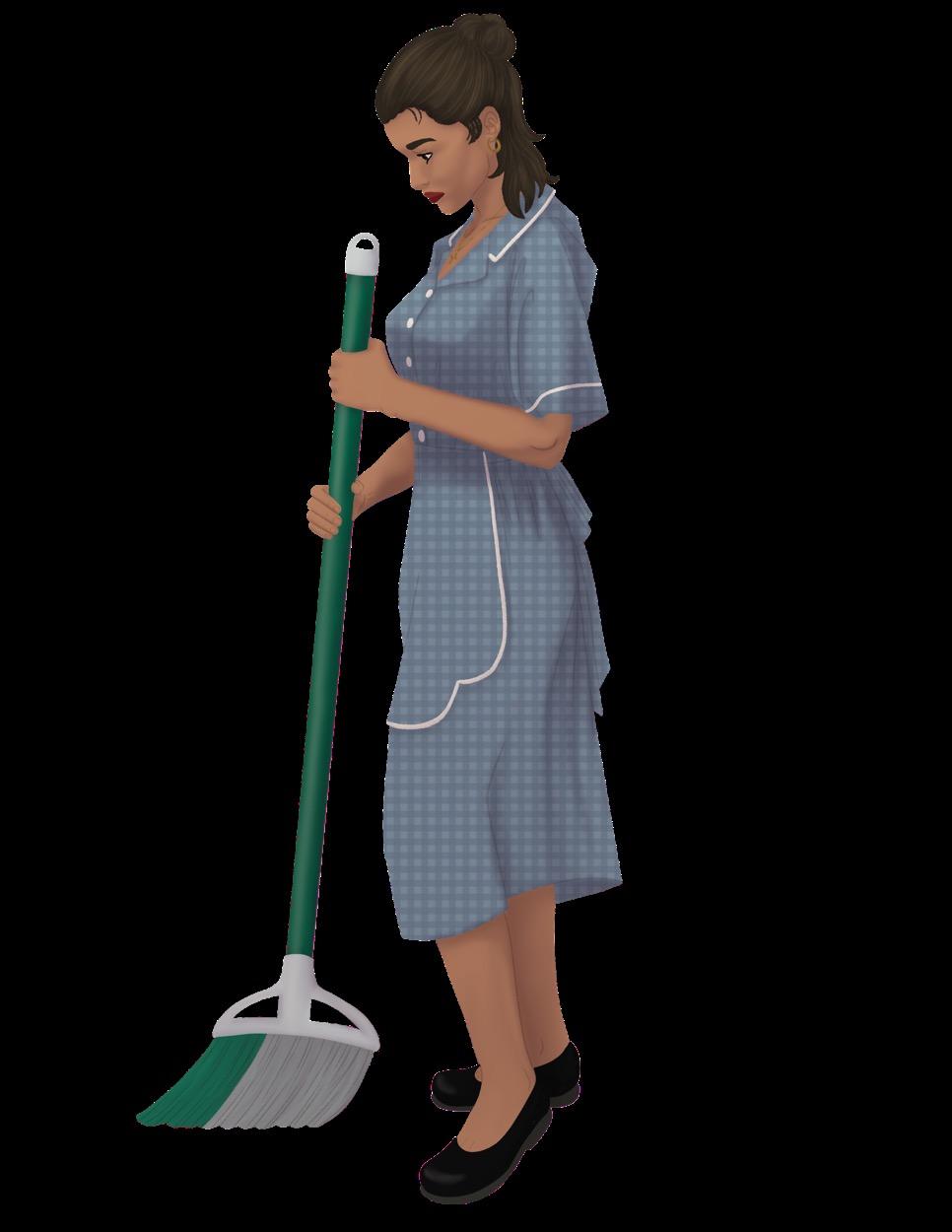
Azahares – 2024 30
Punto de Reunión
we promised to have and to hold as wind rattled the olive branches and rippled your ruffled hair.
we grazed on sliced oranges and drank wine while frescas flowed and families tangled like the roots of the lengua de suegra i killed.
your aunts would gossip while your mother smoked.
i held my grandmother’s hand as she tried to tell me something i didn’t quite understand.
we wept through the day and into the night
we danced under the moon in my parents’ backyard.
carrying our promises on little slips of paper and giggling, gasping in wonder and relief at our divine and disastrous unity
our souls have carried us here un punto de reunión
by Madeleine Silva

University of Arkansas – Fort Smith 31
Joipoipo: El primer pasajero
“Tienes un corazón de piedra,” dijo mi madre, colocando su mano artrítica en mi pecho. “Ese es tu boleto para salir de este planeta moribundo.”
*
En el fondo de la piscina olvidada, entre las algas, gusarapos y la flema verdosa, escuché el tiguerito decir: “Ese tipo se ajogó.”
“¡No!” dijo su compañero. “Mira cómo no’ta mirando.”
Yo estaba sentado en el fondo, con las piernas cruzadas, tratando de comprender cómo mi corazón, que zumbaba en vez de latir y fabricado del meteorito Joipoipo, podía tragar esta agua sucia y convertirla en oxígeno para mi cuerpo. Mis pulmones no eran nada más que dos globos de arterias y venas inflados para mantener mi corazón equilibrado. El único uso de mi nariz era oler si la comida estaba lista, o si los huevos estaban podridos.
Hope of the World.
Así llamaron al meteorito que no quería nada que ver con nuestro planeta, y que fue obligado a caer en las aguas del mar Caribe, donde era “más seguro” el aterrizaje. El agua azul cristalina de las playas hirvió sin parar por un mes completo, acabando con toda vida marina y avanzando el calentamiento global unos cuantos siglos. Pero todo estaba bien, porque las potencias mundiales que minaban el metal de energía propia no sintieron los síntomas de tener una piedra gigante entre sus aguas.
Santo Domingo, el corazón del Caribe, como anunciaba la televisión, creció repentinamente,
por Alex V. Cruz
rompiendo récords mundiales en cuestión de progreso. Laboratorios americanos, rusos y chinos eructaron en cuestión de semanas. Progreso. Hoteles de infinitas plantas prometiendo vistas hacia Joipoipo. Progreso. Un hospital inmenso reemplazó el Parque del Este. Progreso. El parque nacional Los Tres Ojos colapsó entre sí. Progreso.
Los trasplantes de corazón comenzaron mucho antes de que yo naciera. Fueron comercializados como procedimientos salva vidas y la verdadera razón por la que el meteorito fue arrastrado hasta nuestra costa. Todo el Caribe se benefició de los nuevos corazones de piedra, como se conocían popularmente. Los caribeños llegaban por carro, avión y embarcaciones a recibir el procedimiento gratuito que les salvaría la vida. Y así siguió por más de una década, hasta que los nuevos corazones, los que no explotaban repentinamente; los que no dejaban de funcionar sin motivo alguno; los que no se sobrecalentaban y hacían que los motores corrieran con tal fuerza que la sangre brotaba por las narices de los dueños, sustituyeran a los viejos.
Una tarde, a mis doce años, con los labios morados y mi piel moribunda, los doctores de mi pueblo le dieron la mala noticia a mi madre: “Miocardiopatía dilatada.” El ventrículo izquierdo, ancho y desfigurado, no tenía la fuerza para exprimir la sangre y enviarla a todo mi cuerpo. ¿El tratamiento? Un trasplante de corazón: la técnica barbárica de sacar el corazón y trasplantarlo de un cuerpo agonizante a otro. Una técnica olvidada en el caribe por la falta de uso en dos décadas.
Azahares – 2024 32
“¿Pero, y los corazones de piedra?” preguntó mi mamá.
“Ya ese procedimiento no es gratuito,” dijo el médico. “Y el precio es mucho más que solo dinero.”
Dejamos el hospital sin entender las palabras del médico. Pero esa noche se anunció una programación especial para ese fin de semana, donde presentarían el nuevo modelo de corazón de piedra y una gran sorpresa final.
“M’ijo,” dijo mi madre después que pasó el comercial. “Vamo’ p’allá.”
No teníamos suficiente dinero para el tren que partía de Santiago, y con los pesitos contados tomamos la vieja guagua que transportaba a los obreros de hoteles y casinos. Apretados como sardinas, llegamos en una cuantas horas nauseabundas a un mundo totalmente desconocido. La parada estaba llena de vendedores y de gente empujándose entre las guaguas con destino a toda la isla, pero en la distancia se veían edificios que parecían gigantes contemplando el mar en un mundo de hormigas. Caminamos hacia los edificios dejando la congestión a nuestra espalda. Pronto llegamos a ver el mar, y en la distancia, se podía apreciar el gran meteorito Joipoipo.
Después de muchas preguntas y miradas de asco, terminamos en un centro de convenciones con mesas altas de manteles negros, donde las personas de todas partes del mundo conversaban en cantidad de idiomas extraños. Nadie hablaba español. Yo ya estaba sin aire, pero mi madre, pequeñita y adolorida, continuaba con su jornada empeñada a encontrarme un corazón de piedra.
“Joipoipo,” le decía a las personas con semblante extranjero. Su mano temblorosa plasmada en mi corazón y en la otra copias de mi diagnóstico y todos los exámenes. “Joipoipo, plis.”
Tras un anuncio por bocinas escondidas, todas las personas se trasladaron en masa, arrastrándome con mi pequeña madre, a un salón inmenso, pantallas gigantes, y un escenario de piso negro y brillante como si fuera de vidrio. Entre choques y empujones, mi madre y yo terminamos parados contra la pared, desapareciendo completamente en el momento que bajaron las luces.
Un hombre viejo, flacucho y despeinado, tomó el escenario y el salón se explotó en aplausos. El hombre comenzó su presentación dándole las gracias al presidente dominicano, el más odiado de mi pueblo, y quien se encontraba en la zona VIP de la audiencia, ya que el progreso con el que tanto hacia campaña, aún no llegaba a nuestros pueblos ni nuestros campos. Me tuve que sentar en el suelo, el bullicio y la falta de aire me estaban mareando.
“And here it is,” dijo el viejo, con las luces enfocadas en él.
“Y aquí lo tienen,” dijo el traductor, un joven médico de pelo rubio y ojos verdes que hablaba el español con un fuerte acento.
“What you’ve been waiting for.”
“Lo que estaban esperando.”
“Our perfected mechanical hearts.”
“Nuestros corazones mecánicos perfeccionados.”
University of Arkansas – Fort Smith 33
“Ready to be distributed worldwide and transplanted to the new generation of humans. The next step in our evolution.”
“Listos para ser distribuidos mundialmente y trasplantados a la nueva generación de humanos. El próximo paso en nuestra evolución.”
Mi corazón moribundo, el que casi nunca sentía por su débil andar, latía fuerte en mis oídos y cada vez me faltaba más el aire. No sentía mis labios y un hormigueo cosquilleaba las puntas de mis dedos.
En la pantalla enorme detrás del viejo giraba un modelo del corazón nuevo, el cual era el doble de grande que el antiguo. Los nuevos corazones no tenían necesidad de los pulmones ya que estaban compuestos de múltiples cámaras que se encargaban de oxigenar la sangre. Parte del pulmón se removía para hacerle puesto al nuevo aparato. Estos eran más grandes en tamaño porque había una cámara extra que los hacia aún más especiales: estos corazones podían convertir el agua en oxígeno.
No me di cuenta cuando mi madre dejó mi lado, pero vi como sus pasos cortos se hicieron camino hacia el traductor, agarrándole suavemente por el brazo.
“Mi hijo,” le dijo, su voz retumbaba por las bocinas. “Mi hijo necesita un corazón.” El traductor, nervioso con la no atención indeseada, trató de zafarse del agarre de mi madre, pero lo único que logró fue llamar más la atención. “Plis, ayuden a mi hijo.”
“Señora,” dijo el traductor cubriendo pobremente el micrófono. “Estos corazones cuestan un millón de dólares.” Mi madre quedó hecha
piedra en el escenario. Los guardias de seguridad ya se hacían camino a removerla cuando el hombre viejo y despeinado alzó la mano y con sus dedos llamó a mi madre. Ella caminó despacio, aún con sus papeles apretados en su puño. Se los entregó al hombre quien los ojeó.
No sé si por buena voluntad o porque el programa estaba en vivo en todo el mundo, pero pidió que me subieran al escenario.
“And here you have him,” dijo el viejo. “Our very first passenger.”
Todos en la audiencia estaban confundidos.
“Y aquí lo tienen,” dijo el traductor con la voz partida. “Nuestro primer pasajero.”
“Prepare the patient for surgery,” ordenó el viejo a alguien detrás del escenario. “This is happening live.”
Cuando volví en mí, con el pecho cocido y enrojecido por la operación, estaba en una habitación totalmente blanca y rodeado de caras extrañas que esperaban ansiosos mi despertar. Aplaudieron y se felicitaron unos con los otros al ver que mis ojos se enfocaban en cada uno de ellos. Todos salieron, y fue en entonces que noté el zumbido en mi pecho que me acompañaría por el resto de mi vida. Entre las costillas había un círculo de metal como cabeza de ducha con agujeros bien grandes. “Como vaina de loto,” escuché a alguien decir una vez. “Por esos agujeros es que sucede el intercambio de aire o agua.”
Unos momentos después, entró mi madre con su cara maquillada y con una ropa distinta. “¿Como te siente, mi niño?” dijo mi madre, con una sonrisa que no veía hace mucho tiempo.
Azahares – 2024 34
“Bien raro,” dije. “No tengo que repirar pero como quiera lo hago.” Paré de respirar voluntariamente, pero mi cuerpo seguía como si nada. “¿Y u’te, por qué tan bonita?”
“Taba en la televisión,” me contó. La entrevistaron. Le preguntaron que se sentía ser la madre del primer pasajero.
“¿Qué pasajero?” pregunté. Escuché al viejo hombre llamarme el primer pasajero antes de la operación, pero aún seguía sin entender.
“Mira pa’ fuera,” dijo mi madre, dirigiendo su vista hacia la ventana del hospital. En la distancia, y mucho más alto que el cielo. Mas allá de las nubes, como encaminado hacia la luna, se encontraba una enorme estructura parecida a un cilindro rústico de metal y gigantes tornillos.
“¿Qué es eso?” pregunté.
“La nave pa’ viví en el epacio,” dijo mi madre. Sus ojos brillosos de esperanza. “El corazón que tú tienes ‘ta hecho pa’ eso. Pa’ viajai al epacio.”
La nave espacial. Fabricada en los últimos veinte años con el fin de viajar infinitamente en el espacio con la esperanza de que algún día encontrara un nuevo planeta que colonizar.
“El futuro de nuestra tierra es incierto,” explicó el viejo despeinado, con ayuda de su traductor, después de mi operación. “Este corazón es el futuro de los humanos.”
“El corazón era capaz de convertir en oxígeno un sin número de gases que de otra manera serían letales para los humanos. También es capas de extraer oxígeno de varios medios, como el agua. Además el corazón es inteligente
y puede interactuar con la nave, lo que es importante para mantener constante el oxígeno y el dormir y despertar de cápsulas de criosueño. Joipoipo avanzó la tecnología de siglos, en un par de décadas.
No pudimos regresar a nuestro pueblo en el Cibao. Nos instalaron en un pequeño apartamento no muy lejos del hospital. Desde nuestra ventana podíamos ver a Joipoipo en la distancia, bañado por las aguas muertas del mar Caribe. Fui la cara del nuevo corazón por los primeros meses y aparecí en muchos programas de televisión y noticieros internacionales. Pero cuando las celebridades norteamericanas empezaron a recibir el trasplante todo cambió. Ya no querían escuchar de mí, sino de los grandes actores, actrices y cantantes que estarían llamando hogar a la gran nave en el espacio. Regresé a la escuela y mi madre encontró un trabajo limpiando las habitaciones de recuperación, trabajando hasta que su joroba y diabetes descontrolada se lo permitió.
Pasaron cinco años y mi madre había envejecido veinte. Ya no podía moverse de su mecedora y ahí veía los días pasar. Yo trabajaba de maletero en el aeropuerto Las Américas, ayudando con las maletas a los gringos multimillonarios que llegaban por su corazón de piedra. Muchas veces no me daban propinas.
Llegué a casa una tarde, después de andar por las mansiones abandonadas de la ciudad y ganándoles los pesitos a niños que nunca habían visto corazones de piedra, apostándome que es todo una mentira, un montaje de la televisión y que los corazones de piedra no existen y que la nave que vemos rondar en nuestro espacio no es nada más que el invento
University of Arkansas – Fort Smith 35
del demonio. Mi madre seguía en su mecedora con las piernas hinchadas y las plantas de los pies agrietadas. Pero esta vez tenía una sonrisa en su rostro.
“Te llamaron poi teléfono,” dijo.
“¿Quién?” pregunté.
“Lo de Joipoipo. Ya llegó el día.”
Ya hace unos meses se rumoraba que la nave estaba lista para aceptar a los pasajeros. Se esperaba que tomara unos cinco años en transportar a todos los habitantes que dejarían atrás al planeta, y que después tomaría otro año en empezar su travesía.
“No la puedo dejar sola,” le dije a mi madre.
“Yo estaré bien,” me respondió. “Tienes un corazón de piedra. Ese es tu boleto para salir de este planeta moribundo.”
Fui al refrigerador y saqué la imitación de carne molida, fabricada por una planta de Joipoipo, la misma que estaba a bordo de la nave y que fabricaría los alimentos que se consumirían en el viaje. Después de cocinarla, la serví con arroz y las habichuelas que quedaban del día anterior. Aún era temprano, así que decidí visitar el hospital donde me encontraría con el hombre viejo y despeinado de mi operación. Dejé a mi madre comiendo y mirando la nave por la ventana de nuestro pequeño apartamento.
Me recibió el traductor quien vestía una bata blanca de médico. Su ojos verdes estaban rodeados de muchas más arrugas de lo que recordaba y su barba casi estaba totalmente gris. Sin decir mucho, me pidió que lo siguiera.
Caminaba rápido y a veces parecía andar sin rumbo exacto.
“Vine a hablar del viaje,” dije en mi mejor español y tratando de no quedarme muy atrás. “No creo que pueda ser el primer pasajero. Mi madre está muy enferma y no la puedo dejar sola.”
“Está bien,” dijo el traductor. “Solo queremos hacer unos tests.” Me dirigió a un cuarto de exámenes y me pidió que tomara asiento en la cama de chequeo. Escribió unas cuantas cosas en su tableta y de su bolsillo sacó una inyección con un líquido amarillento. Lo colocó en una bandeja de metal con ruedas y la acercó a mi lado. Continuó mirando su tableta y tocando la pantalla.
“Escúchame bien,” murmuró sin quitar los ojos de la pantalla. “Continúa mirando en mi dirección y no me quites la mirada por nada. En este cuarto hay una cámara. Sin dejar de mirarme, dime si entendiste.”
“¿Está hablando conmigo?” pregunté.
“Sí,” respondió bruscamente. “No hay tiempo. Dime si me entendiste.”
Mi corazón empezó a zumbar más rápido, la reacción de cuando me ponía nervioso.
“¿Me entendiste?” questionó, levantando la vista de la pantalla. Asentí con la cabeza. Regresó la vista a la tableta y empezó a tocar la pantalla.
“Nunca ibas a ir a la nave. Todo era mentira. Te llamaron para quitarte el corazón.”
“¿Qué--”
“Pero si quieres vivir, te tienes que ir bien lejos y nunca regresar.”
Azahares – 2024 36
“¿Pero mi madre?”
“No puedes regresar a tu casa nunca más. Al menos no hasta que la nave se vaya. Te estarán buscando hasta encontrarte. El corazón que tienes es muy valioso y no van a perder su inversión. Debes desaparecer o vas a morir.”
“¿Nunca iba a ser el primer pasajero?”
No me respondió. Solo continuó lo que estaba haciendo en la tableta.
“Cuando te dé la espalda, clávame la inyección en brazo. Voy a intentar detenerte, pero la inyección va a hacer efecto. En ese momento sal caminando. Me arrastraré a el botón de seguridad, y cuando lo presioné vendrán los guardias, pero tendrás tiempo para escapar. No corras hasta que estés fuera del hospital o llamarás la atención. ¿Entendido?”
Asentí de nuevo. El zumbido del corazón respondiendo a la adrenalina que corría por mi sangre me ensordeció por completo.
El traductor médico giró y tomó unos guantes de una gaveta y empezó a ponérselos. Hice como me pidió. Tomé la inyección sin hacer mucho ruido y se la clavé en el brazo con una fuerza que no conocía. El giró repentinamente con los ojos a punto de estallar en asombro actuado, agarró la inyección que estaba vacía y la sacó de su brazo, lanzándola hacia el suelo. Yo quedé congelado en la cama del cuarto y él agarró mis hombros y me sacudió fuerte, lanzándonos a los dos al suelo. Pude levantarme, pero él se quedó tirado allí y entendí que era el momento en el que debía escapar para poder tener tiempo de salir del hospital antes de que el traductor avisara a los de seguridad.
Salí con las manos entre los bolsillos, con la mirada baja, y con el zumbido que no me dejaba escuchar nada. Caminé por los pasillos siguiendo la línea de salida y sin esquivar a los de seguridad para no parecerles sospechoso. Llegué hacia la salida y después de cruzar las puertas corredizas, corrí tal como me dijo el traductor médico. No había girado la esquina cuando empecé a escuchar las alarmas del hospital.
Me adentré a la ciudad dejando a Joipoipo y el mar Caribe a mis espaldas. Llegué a la zona más congestionada de todo Santo Domingo, con vendedores ambulantes, marcas falsificadas en las aceras y la parada de guaguas, donde mi madre y yo llegamos por primera vez hace tantos años. Aquí, entre la muchedumbre, iba a ser difícil de encontrar. Aquí, donde no entran los ricos, yo solo soy un dominicano más. Compré una gorra de las Águilas Cibaeñas y busqué refugio dentro de la sala de espera, donde solo estaban las personas de gran edad y mujeres embarazadas. Tomé asiento a esperar que mi corazón dejara de zumbar en mis oídos para poder pensar claramente en mi próximo paso.
Cuando se tranquilizó mi corazón, decidí comprar un boleto de regreso a mi pueblo, ahí por lo menos conocía personas que me pudieran esconder hasta que se fuera la nave. Me levanté y saqué de mi bolsillo lo que me quedaba de dinero. Conté los pesos entre mis dedos y me dirigí al cajero. “Un boleto a La Vega,” le pedí a la chica detrás del mostrador.
“¿Se siente bien, joven? Está bien pálido y respirando muy duro.” Con el ajetreo no me había dado cuenta, pero tenía razón. Mi respiros, los cuales aunque inflaba mis pulmones no tenían
University of Arkansas – Fort Smith 37
ninguna conexión con mi sangre, eran rápidos y cortos, como si acabara de salir del agua tras un largo tiempo sin respirar. Mi visión empezó a ponerse borrosa y sentía el mismo hormigueo en los dedos que cuando era adolescente con un corazón humano y defectuoso.
“Me estoy asfixiando,” le dije a la chica. En ese momento entraron unos paramédicos con el logo del hospital de Joipoipo. Intente girar y correr, pero solo logré desplomarme en aquel suelo sucio.
Los paramédicos me alzaron en la camilla, y dentro de la ambulancia lo vi, al viejo despeinado de la convención de los corazones de piedra, sentado a mi lado, contemplandome morir.
“You thought you could escape,” dijo, pero no entendía lo que decía.
“You thought I would create a one-million-dollar heart and not add an off button and a tracking system?”
Mi visión oscureció por completo, y lo último que escuché fue:
“How else would I rule the new space civilization?”
Azahares – 2024 38
Esta tarde contigo
por Irene Cantizano Bescós
Y hoy es diferente, estoy contigo y quiero contarte por qué sonrío, tengo un secreto: te voy a ver, nadie lo sabe, todos caminan, alguien me mira y quizás sospecha de mi alegría, y me doy prisa, bailando las calles mientras imagino lo que vendrá
porque
la tarde es nuestra, desnúdame, dame la mano, cuéntame, mis miedos son agua en tu presencia, la luz te busca en cada rincón , te miro y pienso: enciende el invierno, haz magia otra vez, cántame un cuento, duerme en mi piel y ríete, ríete siempre y recuérdame el milagro que esconden los días contigo, tú dibujando Madrid, tu forma de sonreír lo imposible que haces no ser feliz.
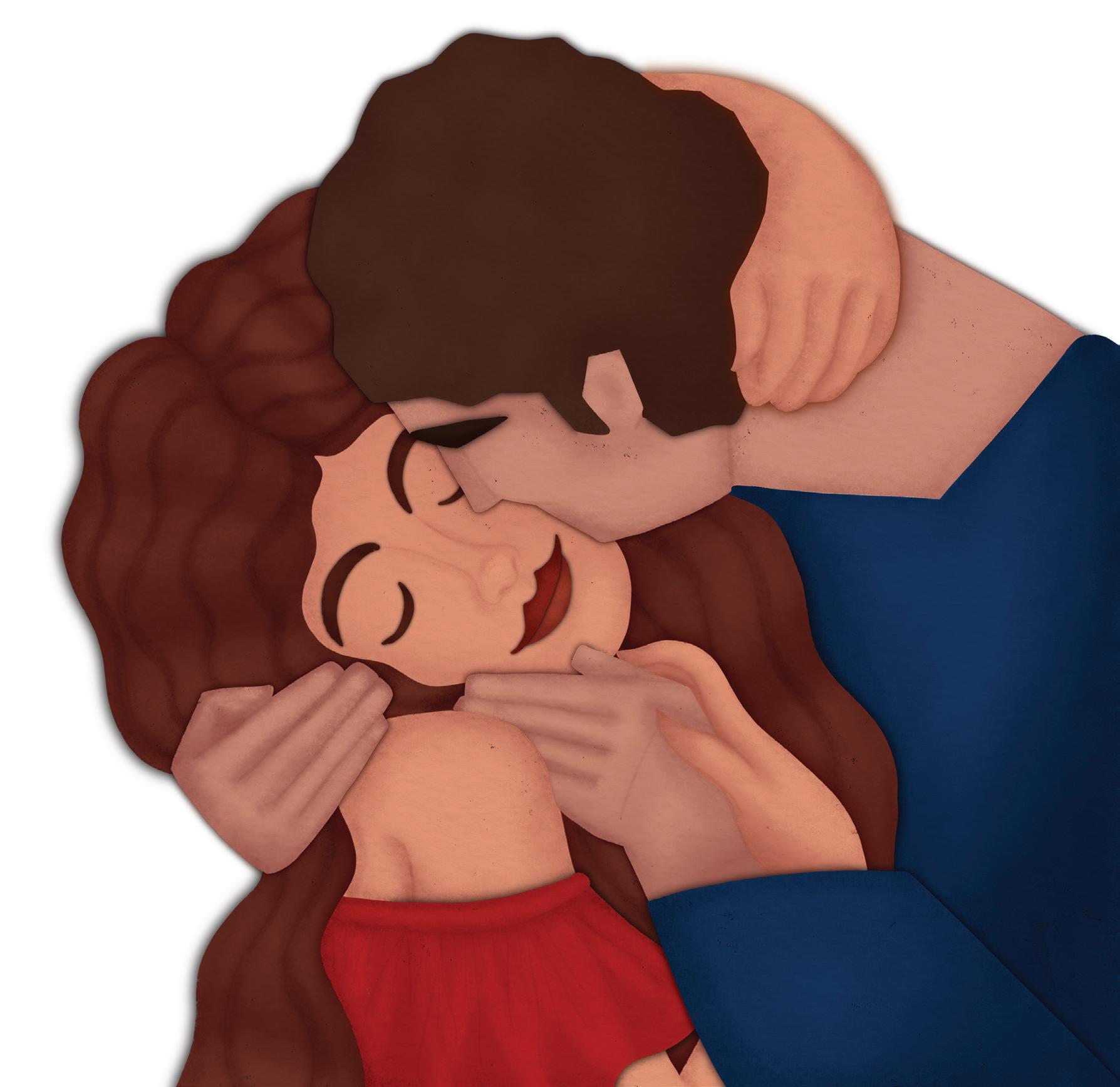
University of Arkansas – Fort Smith 39
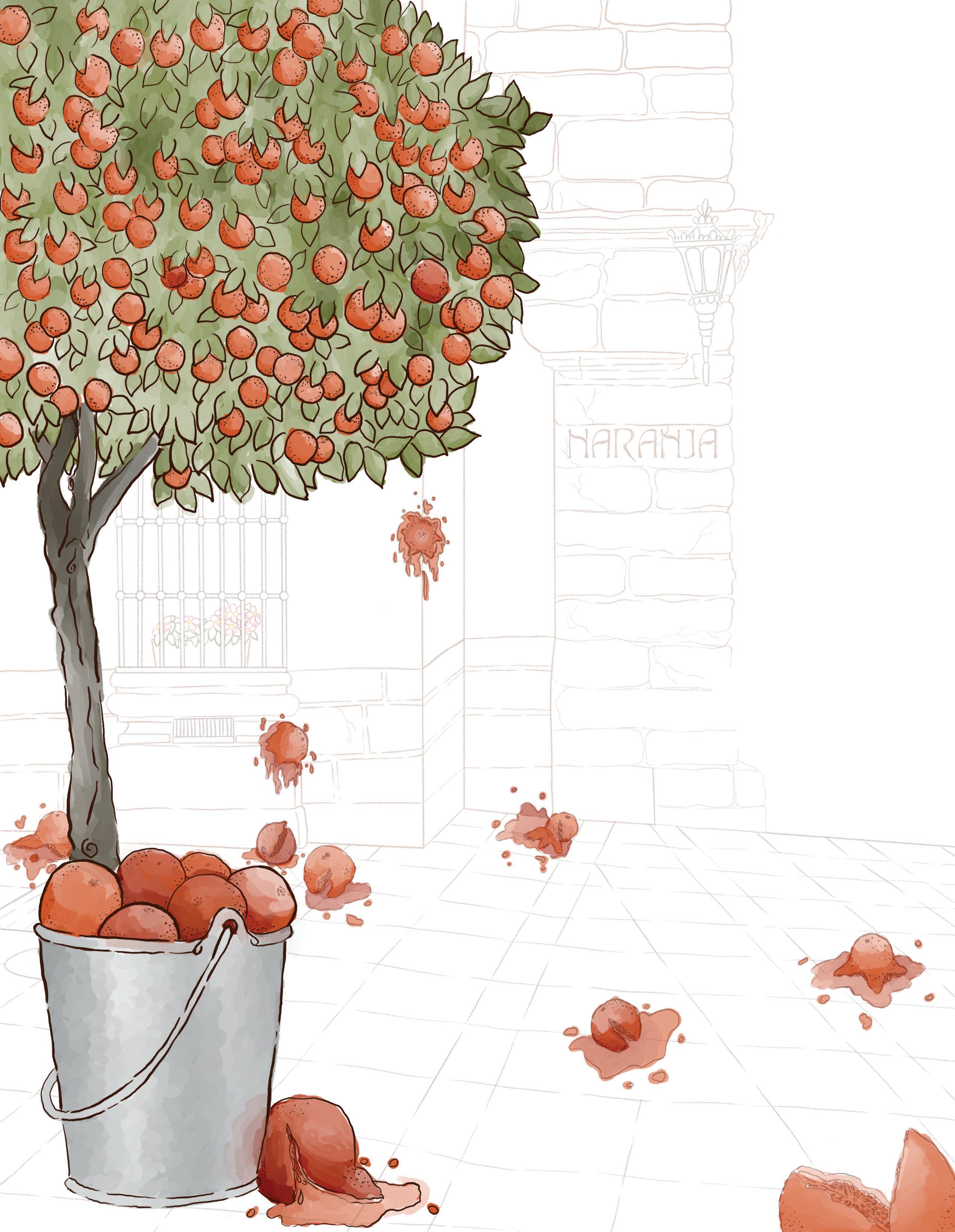
Raining Down Oranges
by Roger Camp
Strolling a boulevard in Barcelona the scent of an unseen cloud of orange blossoms envelops me.
Bowing to the fragrance careful to avoid the bees
I inhale memories of childhood
in a city named Naranja. Hemmed in by orchards orange fights a way of life
the fallen fruit the perfect projectile ––a rotten missile bursting harmlessly against our tree fort
high in the eucalyptuses. Under siege we rained down oranges bombarding our attackers by the bucketful.
At day’s end pulped tee-shirts, zesty hands and juiced bare feet.
A boy’s lust for battle exhausted our wet tracks wound us home.
Azahares – 2024 40
Auxilio
¡Échale ganas, mija!
I am.
Eres bien trabajadora.
Esperamos que tengas buenas calificaciones. Cuando seas una abogada, no te olvides de nosotros.
Nadie me entiende.
In English
Ni siquiera en español.
Vinieron a los Estados Unidos para darme una vida mejor.
Para que no se repita su generación.
Pero,
I am doing my best to break barriers.
As I try to heal my first-generation trauma.
¡Mamá y papá ayúdenme!
Soy humana.
I wish it were that simple. Todavía no sé si lo puedo lograr.
Por favor no esperen mucho de mí.
Porque sus esperanzas, Me van a matar.
¡Mamá y papá ayúdenme!
por Rachel Nuñez
University of Arkansas – Fort Smith 41
I am scared/Estoy asustado
by César Vladimir Brizuela Zelaya
I am scared.
I do not know how to speak the language. Everyone is watching me.
And their mouth is moving.
It only sounds like the noise.
I try to smile, but my heart is racing. I’m scared, I want to go home.
I want to go back to my father’s house.
El Salvador is my house, not this strange place.
They want me to go to school.
How can I learn?
I do not even understand a word.
Will they hate me?
Will they call me names?
Am I going to be stupid?
Fear is an ugly very real nightmare.
Today I am a college student.
I have been here for 7 years.
Yes, I’m still scared, but now. I also have confidence.
I am intelligent.
I am learning a new language.
My father would be proud of me.
I will continue forward so that my family of El Salvador would be proud of me.
I am here to learn many things. And someday I will go back.
When I grow up, I will be a professional person, and one day I will be able to return to El Salvador to see my family again and visit the people I was with when I was a child.
And to feel the old times when I was a little boy.
And maybe live like in the old days and visit my friends from my past or be with my family.
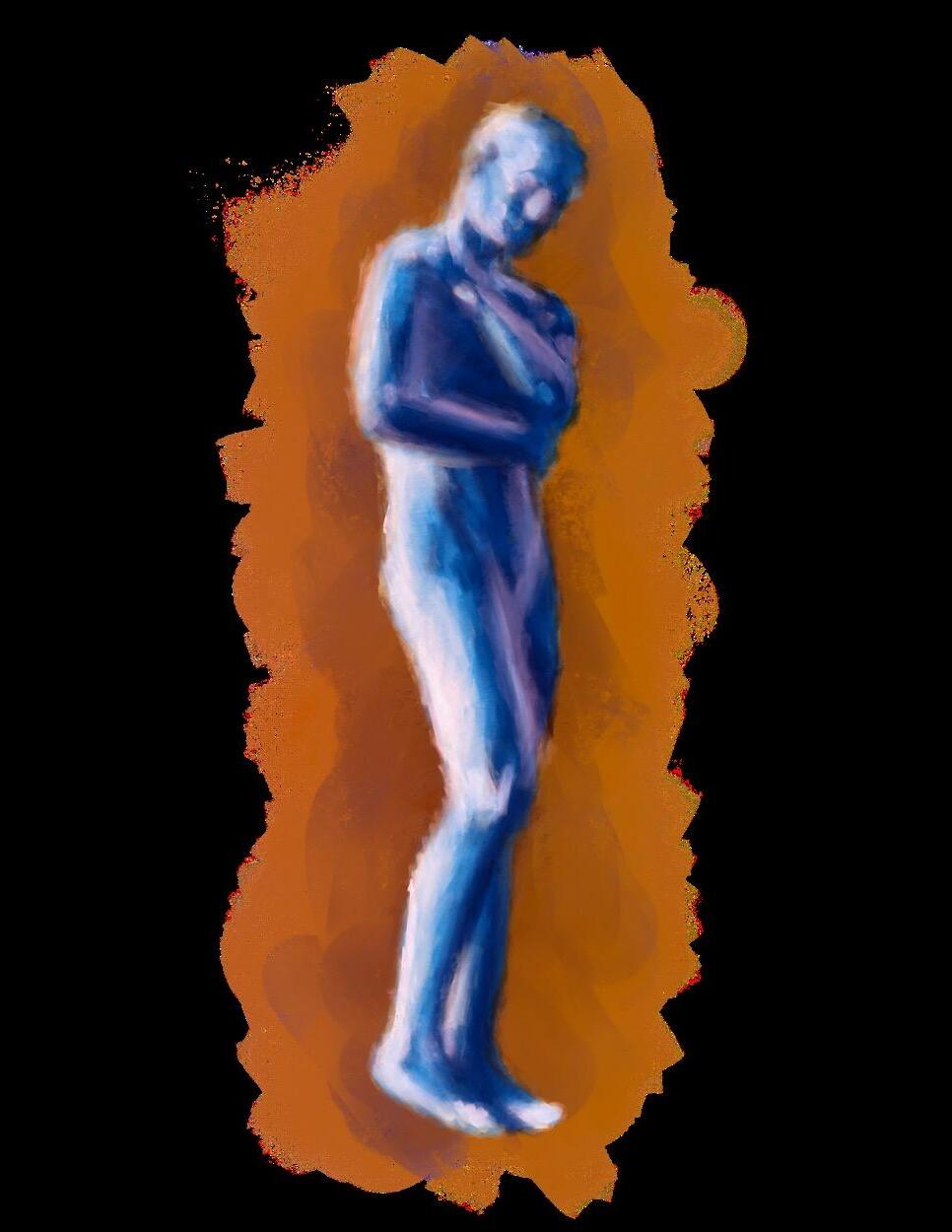
Azahares – 2024 42

Estoy asustado. No sé cómo hablar el idioma. Todo el mundo me está mirando. Y su boca se está moviendo. Solo suena como el ruido.
Trato de sonreir, pero mi corazón está corriendo.
Estoy asustado, quiero ir a casa.
Quiero volver a la casa de mi padre.
El Salvador es mi casa, no este lugar extraño.
Quieren que vaya a la escuela.
¿Cómo puedo aprender?
Ni siquiera entiendo una palabra. ¿Me odiaran?
¿Me llamarán nombres?
¿Voy a ser estúpido?
El miedo es una fea pesadilla muy real.
Hoy, soy un estudiante universitario. He estado aquí por 7 años.
Sí, todavía estoy asustado, pero ahora también tengo confianza. Soy inteligente.
Estoy aprendiendo un nuevo idioma. Mi padre estaría orgulloso de mí. Lo seguiré adelante para que mi familia de El Salvador esté orgulloso de mí. Estoy aquí para aprender muchas cosas. Y algun día voy a volver.
Algún día cuando sea mayor, seré una persona profesional y algún día podré regresar a El Salvador para ver a mi familia de nuevo y visitar a las personas que estuve antes cuando era niño. Y volver a sentir los viejos tiempos cuando era un niño pequeño.
Y tal vez vivir como en los viejos tiempos y visitar a mis amigos de mi pasado o estar con mi familia.
University of Arkansas – Fort Smith 43
Lu Pi
Conduciendo a casa del trabajo hoy se me ocurrió que su nombre debe haber sido Guadalupe. Algo en el estacionamiento de FoodMaxx unió una serie de ideas, sombreadas, ahora de repente cosidas con total claridad, el nombre que mi mamá y mi papá siempre le habían asignado. Decir eso ahora después de esta epifanía en el estacionamiento parecía ridículo. Lu Pi. Lu Pi vive al otro lado de la calle. Lu Pi tiene unos huevos de gallina frescos. El perro está de nuevo en el jardín de Lu Pi. El peso aterrizó pesadamente en la primera sílaba como un saco de avena con melaza arrojado desde la plataforma de un camión.
Por alguna razón, finalmente había unido esas piezas; después de todos estos años de experiencia, tenía sentido. ¿Le había ofrecido Lu Pi a mi mamá como una técnica de supervivencia después de tantos años de pronunciar Guadalupe repetidamente? Un nombre tan suave y maduro como la pulpa del aguacate. Cuando se pronuncia correctamente da calidez y conjura sabiduría, belleza, fuerza y esperanza. Ella era la señora de enfrente. Ella caminó por los lugares. Llevaba muchas bolsas con comestibles en ellas. Ella tenía una estatua en el frente de su casa de una mujer Mexicana especial vestida como María. Ella era la mujer con la que mi madre intercambiaba verduras frescas de
por Diane Waite
nuestro jardín por sus huevos de gallina marrones recién puestos. Llamando a su hijo en la noche cuando la oscuridad se encontró con la calle. Los sinsontes imitando sus rrrrs rodantes y iiiiiiiiiis estridentes. “Riiiikyyy” ella invocará. Posiblemente su nombre había sido Ricardo, sin embargo, solo escuché que se referían a él como Ricky. En inglés, la ‘r’ era una actividad para una lengua que se sentaba en el banco. A diferencia de la ‘r’ española que corría sprints.
¿Qué otros nombres me habían dado de comer y tragado sin masticar? De niño no piensas en el peso de un nombre, en cómo cambiarlo cambia más que en el sonido que hace. Cambiar un nombre de su forma original a otra es el hilo conductor de las culturas y las reduce a trajes azul marino sin adornos. Inmediatamente fueron bordados con diseños floridos de tildes, diéresis y cedillas y en un momento de frustración, exasperación o resignación reducidos a tirones linguales planos y rígidos. En mi vida he llevado un puñado de nombres que se han sometido a cirugía estética como los rostros transformados de Hollywood. Una vez que los nombres fascinantes e intrincados se cortaron en versiones cortas y lindas e irreconocibles de sí mismos, se desinfectaron y se hicieron más apetecibles para el consumidor. Una nariz romana de un nombre reducido
Azahares – 2024 44
a una copia al carbón invertida desprovista de carácter y tamaño. Amigos de la infancia como Balbir se convirtieron en Bob, Candelaria en Candy y Esam ahora es Sam.
Es un reino complicado, el del nombre que recibimos al nacer. Generalmente, significa algo para las personas que deciden cómo seremos llamados. Y generalmente pueden pronunciarlo. No es hasta que nos aventuramos en el mundo con nuestro nombre que nos encontramos con personas que carecen de conciencia fonética y cultural. Aquí podemos encontrarnos con una serie de obstáculos para que otros pronuncien correctamente nuestros nombres con facilidad. Nuestros nombres podrían sonar potencialmente como una palabra desafortunada en otro idioma. El pobre Gary que visita Japón aprenderá rápidamente que su nombre suena inquietantemente a diarrea. Además, nuestros nombres pueden contener grupos de consonantes que otros idiomas no unen, lo que dificulta la tarea del hablante. Como la mayoría de las cosas en esta vida, nuestros nombres están vinculados culturalmente y si pasamos poco o ningún tiempo interactuando con varias culturas (algunas personas en realidad evitan otras culturas por miedo), entonces, los nombres nuevos para nosotros pueden ser intimidantes.
Un movimiento que gana más fuerza en los últimos años empodera al poseedor de nombres bellamente intrincados y desafía los impulsos anticuados para asimilar. Invirtiendo, en incrementos microscópicos, la noción de que la blancura es el pulmón a través del cual todos deberíamos respirar. Pienso en la Guadalupe de mi pasado y en todas los Guadalupes de hoy. Un nombre de género neutro con un pie en un río árabe y el otro cabalgando sobre el lomo de un lobo español. Este nombre tan favorecido, cuyas raíces brotaron de las semillas de los aztecas, no debe ser sacrificado ni sacrificado al dios de la conveniencia. Tu nombre, si lo amas y lo honras, entonces los demás deben obedecerlo sin importar cuántas veces el orador se esfuerce por decirlo correctamente.
University of Arkansas – Fort Smith 45
Los sentidos de mi patria chilena
Las vistas de atardeceres color salmón salpicados contra el telón de fondo de la cordillera nevada, de encumbrados cactos saguaro y de cerros salpicados de palmeras, de turbias aguas marinas chocando con las costas, escarpadas y rocosas.
Los olores del esmog industrial y gases de automóviles que hacen pesar el viciado aire invernal, de las buganvillas y plátanos orientales que bordean mi calle, Pedro de Valdivia, de los nudos de cochayuyos secándose al sol en brumosas mañanas al lado del mar.
Los gustos de jugoso pepino dulce, pasteles de lúcuma y cucharadas de manjar directo del pote, de locos con mayo, machas a la parmesana, humitas y porotos granados en invierno, de empanadas, o queso fresco con palta mantecosa en una marraqueta recién horneada. Los sonidos de baladas de La Ley tras un quiebre y merengues de Juan Luis Guerra en año nuevo, de los gritos de cóndor y flautas dulces resonando por los valles de los Andes, del organillero con su chinchinero girando por monedas bajo nuestro balcón.
por Jen Ross Laguna
El tacto del roce de mejillas al saludar y de abrazos apretados en reuniones familiares, del pasto, fresco y recién mojado, en nuestras caminatas matinales a la plaza Jacaranda, de los brazos suaves y arrugados de abuelita, abrazándome antes de irnos, otra vez.
Chile, patria de mi madre, es mi segunda – y a la vez mi primera – casa.
Permanece en mis sentidos, grabado en mi cuerpo y mi alma.
Fragmentos de una vida nómada marcada por amores, pérdidas y aventuras, que me dejan nostálgica, adolorida y anhelando volver.
English translation:
A sense of my Chile
The sights of salmon sunsets splashed against the backdrop of the snow-capped Andes, of towering saguaro cacti and palm tree-dotted hillsides, of murky blue waters crashing against craggy, rocky shores.
Azahares – 2024 46
The scents of industrial smog and car exhaust lingering in the stale winter air, of the bougainvillea and sycamore trees lining my street, Pedro de Valdivia, of beached knots of cochayuyo seaweed drying on misty mornings by the sea.
The tastes of juicy pepino dulce, lucuma pastries and spoonful’s of manjar straight from the jar, of locos with mayo, machas a la parmesana, humitas and porotos granados in winter, of empanadas or fresh cheese and buttery avocado smeared on fresh-baked marraqueta.
The sounds of La Ley ballads after a breakup and Juan Luis Guerra merengues on New Year’s Eve, of condor cries and reed flutes echoing across the valleys of the cordillera, of the organillero and his twirling drummer busking for coins under our balcony.
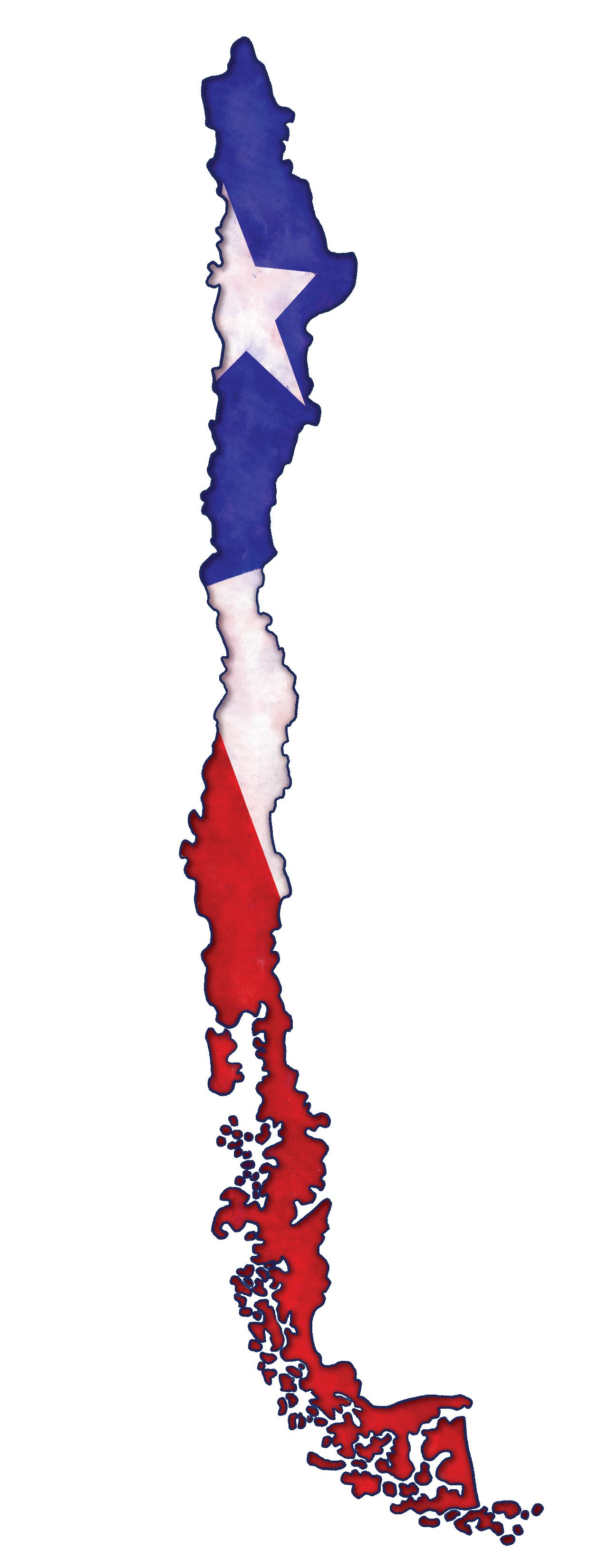
The touch of cheeks brushing to greet strangers and tight hugs at family gatherings, of the grass, cool and freshly watered, on morning walks to Jacaranda Plaza, of abuelita’s soft wrinkled arms embracing me before we leave, again.
My mother’s country, Chile, is my second –and at the same time my first – home.
It lingers in my senses, etched into my body and soul.
Fragments of a nomadic life filled with love, loss and adventure,
that leave me longing, aching, yearning to return.
[Translation notes: Chile has many words not used in other Latin American countries: cochayuyo is a thick seaweed found along the Pacific; pepino dulce is a fruit also known as pear melon; lúcuma is a fruit only found in Chile and Peru with soft, yellow flesh with a dry texture and flavour like a mix of sweet potato and butterscotch; manjar is a type of caramel known as dulce de leche in other Latin American countries; locos are a carnivorous shellfish found only in Chile and Peru, also called abalones in some countries; machas a la parmesana are oven-baked clams in their shells with parmesan cheese; humitas are a dish made of crushed corn, onion and spices wrapped in plantain leaves and boiled; porotos granados is a type of bean stew made of Roman beans, corn, pumpkin and spices; Chilean empanadas are oven-baked patties filled with beef, raisins, onions, black olives and hard-boiled eggs; marraqueta is a type of bread also known as French rolls, like four small, joined baguettes; the cordillera is a mountain chain, often used synonymously for the Andes; an organillero is a street organ player and a chinchinero is an urban street performer who plays a drum-type percussion instrument strapped to his back with a cymbal and with long drumsticks; and abuelita, means grandmother]
University of Arkansas – Fort Smith 47
Cuba
Regresaré a ti—
Y mientras te derrumbas
Te aguantaré en mis brazos
Y besaré tu tierra, sosteniéndote en tu agonía, recogeré los pedazos de tu alma con mis manos sangrientas y trataré de resolverte como un crucigrama, como un rompecabezas, sin solución, pero sin juzgarte, —siempre seré tu hijo.
en la sangre por Lázaro Gutiérrez
dime—quién puede mezclar este sabor; este guarapo frío y dulce. El sabor de este trigueño es un son Cubano. Sandunga, salsa, guanabana y mojito,
nacido del mambo, del guaguancó, nacido de la rumba, hijo de Celia, café con espumita y pan con aguacate, un guajiro de corazón, un guajiro de Pueblo Nuevo—
vengo de la tierra de las amapolas, de chirimoyas y maracuyá. La tierra de los orishas, de Oshún, de Elegua.
Hijo de un campo humilde; de guayabas y marañones, heredero de Martí, canto de la Guantanamera, soy agua clara caribeña, lluvia fresca de primavera. Criado con malta y tostones, potaje de garbanzos, yuca, caldosa, arroz blanco y huevo frito—
Y tú—me preguntas, ¿Quién tú eres? ¿Quién soy? Con esta bravata, esta audacia, este pavoneo natural—se derrocha de mí, hierve
por Lázaro Gutiérrez
en mi sangre, en la profundidad de mi centro. Sangre caliente, sangre caribeña que quema. ¿Quién soy? ¿Quién cojones soy yo?
Soy un papi chulo, Cubano de corazón, un manguito de chupete, soy un cojonú como mi padre, un buen machete, un caballo fuerte, buena pinga, buena lengua, labios ardientes, crema de ron derramando de mi son,
Soy cañaverales verdes verticales, prú de los orientales, soy el hijo de los campesinos, descendiente de Montañez, nacido en el marabú. En la Perla de las Antillas, soy el hijo de Esmeralda, el príncipe de Camagüey, mira mi corona
aquí en mi cabeza, mis joyas son tabacos enrollados a mano,
mi sabor es tamarindo, café con leche, mis palabras
fluyen con convicción inigualable, “asere, qué bola?”
mis pasos el sonido de tambores, maracas, de Palmas y Cañas, ¡oye mi canto! En el se encuentra la dulzura de mamey y anoncillos, en mi espalda la guayabera—orgulloso como el verano donde quiera
soy el dominó contra la mesa; soy un bolero romántico,
soy el ritmo del cha-cha-cha, con la camisa abierta y mi pecho al aire,
Soy los exiliados, los refugiados, los balseros, los pies secos y los pies mojados,
Soy la rabia de una madre encarcelada gritando
Azahares – 2024 48
por libertad, pero aún sonriendo, erguida, llena de vida, Soy hijo de un reino que se desmorona; cediendo, dejado a morir, pero no olvidado; aislado pero no solo, Soy hijo de Abelardo, soy hijo de Estrella,
Yo soy el hijo que se fue pero no olvida a su madre— yo soy y siempre seré: Cubano de corazón.
Y mi Cuba, mi vieja Cuba mi Cuba se está muriendo, mi isla se muere de hambre— y yo sin verla otra vez, y mientras sus hijos se van, ella en un hospital de mierda—
le ruega entre cucarachas a sus santos—paz ’pa su tierra.
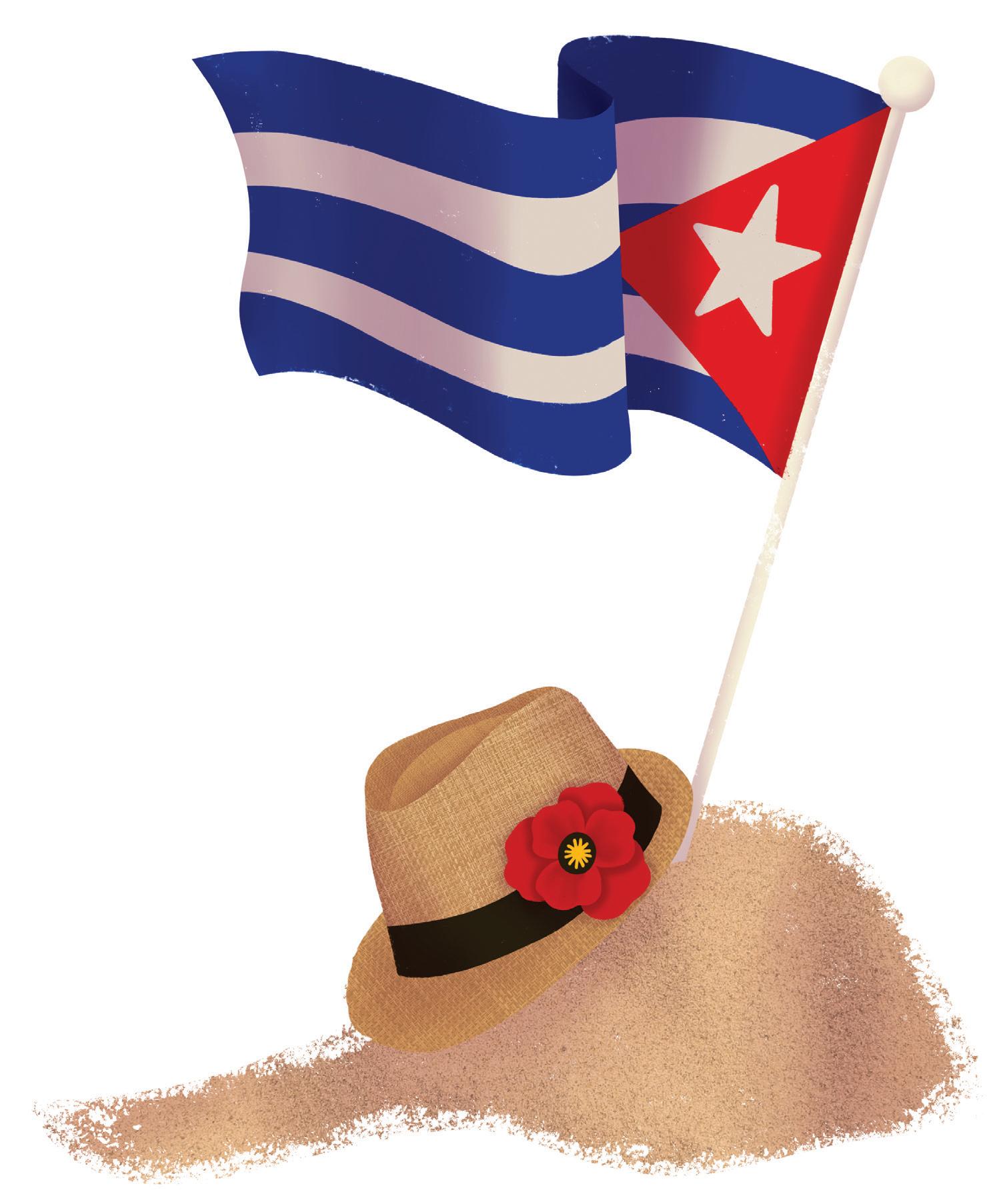
University of Arkansas – Fort Smith 49
El licenciado aprendió a llorar
El licenciado Gómez, después de dos horas en el autobús, porque solo los campesinos le llaman guagua, llegó al viejo campo donde hacía una eternidad de años había empacado sus maletas y le dijo adiós a esa tierra negra y fértil, a la que cambió por el concreto duro y gris de Santo Domingo, donde los carros ya volaban con alas propias. Estaba al pie de la cuesta que lo llevaría hacia adentro de las lomas de Cayo, a su viejo hogar donde todos los vieron crecer, pero nadie lo esperaba.
Sabía que llegaría tarde. El correo, para aquellos que sabían cómo escribir direcciones correctamente, tardaba semanas en trasladarse por los campos y cordillera de aquel país.
Cuando la carta arribó a su puerta, junto con la factura de aire fresco y agua de lluvia, la abrió curiosamente al reconocer las letras y faltas ortográficas de su hermano mayor. “Papa e’tá muy enfeimo,” leyó Gómez. “Ben si lo quiere vei vivo.” Si tan cerca de la muerte está, pensó Gómez, ya tiene que estar muerto.
Las calles eran más pequeñas y claustrofóbicas de lo que recordaba y aún no habían sido asfaltadas. Los motoconchos y los vehículos de cuatro ruedas bailaban su diario vals como padres e hijas en días de quinceañeras. En esas viejas calles todavía se olía el polvo calentado por el fuerte sol del medio día.
La tierra reconoció a su hijo olvidado y mostró su regocijo haciendo danzar los arboles de un lado hacia otro. Gómez estaba demasiado asqueado con el sudor de su cuello y las miradas de aquellas personas impresionadas por
por Alex V. Cruz
ver a un hombre con saco y corbata, para darse cuenta del baile sincronizado de las amapolas y sus largos bohucos.
Ignorando las miradas largas de su audiencia, se echó a caminar por el atajo que tomaba de niño para evitar el sol de las doce. Aunque el caminito no era secreto, más de medio mundo que vivía en las entrañas de las lomas de Cayo lo tomaba, la insultada tierra decidió borrar el camino hecho por la gente, barriendo las hojas secas de cacao y café por todos lados.
Para cuando Gómez se dio cuenta de que estaba perdido, ya la tierra lo había desviado en tantos círculos que ni ella misma estaba segura de donde se encontraban. Al fin Gómez llegó a un pequeño manantial, donde tomó asiento en un peñón y bebió agua de sus manos encopadas. Después de contemplar el agua por unos momentos, mojó su cuello manchando la delicada tela de su camisa. Al pararse del peñón, la tierra carcajeó silenciosamente al ver el embarre de lodo que el licenciado llevaba en los fundillos del pantalón.
Este manantial, pensó él, tiene que ser el mismo.
Su mente viajó décadas para recordar como todas las mañanitas salía antes que el sol a buscar agua para el baño de su padre, su hermano, y el suyo mismo. Un galón en cada mano y uno balanceado en la cabeza. Aunque el camino aún seguía escondido, recordó que al llenar los galones de agua, giraba media brújula cuidadosamente para no echar a volar el galón de su cabeza. Con el camino visualizado, comenzó a navegarlo sigilosamente.
Azahares – 2024 50
Gómez trató de no perder la concentración, pero cuando la tierra se percató de que talvez él sabía hacia donde se dirigía, le revolvió el camino como huevo en ollita de freír y el desgraciado se echó a maldecir al darse cuenta que el sol estaba de regreso a su espalda. Fue en aquel momento que terminó en la colina de las piñas.
Para ese entonces ya no existía el manto verde y espinoso de las plantas de piñas como cuando él era un jovencito, pero recordó bien como su padre le tenía prohibido no solo comerse las piñas de la colina, sino hasta pisar suelo en esa propiedad. Era el único pedazo de tierra por todo esos lados donde se sabía con certeza que tenían dueñas: las ciguapas de la loma. Las ciguapas, con sus largas cabelleras y sus pies mirando hacia atrás, eran despiadadas y esperaban con cautela que una pobre alma pisara su propiedad para degollarla y ensancocharla.
Después de dar unos cuidadosos pasos hacia atrás, el licenciado corrió como cuando era niño, alejándose lo más posible de esa maldita colina. Cuando por fin paró, tanto el licenciado como la tierra estaban sin aire. Fue entonces que la tierra decidió que era de niños el guardar rencor y reveló el camino que la encaprichada ocultó.
“Pendeja,” dijo Gómez.
Con el camino de regreso a casa totalmente libre de hojas, la tierra lo dejó retomar su travesía en paz, y nunca se supo si la rama del tirigüillo que apareció de la nada y fuetió a Gómez por la espalda fue pura coincidencia o represalia.
Después de un corto caminar, donde cada paso fue uno previamente caminado, Gómez llegó a ver la casa en la que vivió toda su infancia y adolescencia. Era más pequeña de lo que recordaba. Los montorrones de gingeres rojos y caña de azúcar secos de tristeza y soledad.
La cerradura en la puerta de madera de pobres se sentía diferente, más pesada de lo que recordaba. Al empujar la puerta con sus dedos largos, encontró una casa extrañamente vacía, despojadas hasta de los pocos buenos recuerdos. Los muebles que quedaban aún se encontraban alineados contra la pared como residuo del velorio. Todo lo demás había sido repartido entre familiares y uno que otro ratero oportunista. Hasta la única habitación de aquella pequeña casa, la que compartía con su padre y su hermano, con una cama grande y dos pequeñas, parecía un cascarón de huevo de gallina criolla.

University of Arkansas – Fort Smith 51
Pero fue en esa habitación vacía que se percató de un diminuto brillo en la pared de tablas carcomidas. Con sus dedos trazó la madera alrededor del brillo y se dio cuenta de que la casa estaba en el proceso de tragarse la pipa de madera del difunto padre. De repente, un olor fantasma llegó a su nariz del humo intoxicante de esa pipa.
Gómez en ese momento vivió claramente las noches donde se sentaba en el suelo a comerse sus guineítos y huevo sancochado mientras escuchaba el radio de baterías de su padre. En ese instante fue donde pudo comprender que no vería a su padre de nuevo. Nunca iba a oler la peste de aquella pipa inundando la pequeña casa. Nunca iba a ser regañado por acercarse demasiado a la colina de piñas. Nunca iba a correr con galones vacíos para llenarlos de agua para su familia. Esa época terminó y no regresaría.
Solo fue una la lágrima que sus ojos produjeron, pero cuando vio a su hermano mayor, encaminado por la tierra para el reencuentro familiar, su pecho de desencajó y con cara plegada, lloró un pequeño rio cuyas aguas saladas se unieron al manantial de su niñez. Su hermano mayor, que ya había llorado a su padre, abrazó a su perdido hermano y consoló su llanto.
“Ven,” le dijo el hermano mayor. “Conoce a tus sobrinos.”
Azahares – 2024 52
La Oruga
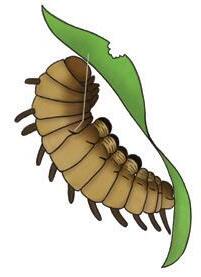 by Casandra Hernández Ríos
by Casandra Hernández Ríos
When I was twelve, I dreamt I was a mariposa, but was still only a small oruga, inching carefully around you, far enough from danger but within reach of your hard love for sustenance. When my wings didn’t come in, you made it my fault because I was always hungry, always soft, attaching myself to the wrong thing for cariño. You were dura for my good, you said, but it wasn’t you who I belonged to either. Seasons came and went, and my evolution stalled at caterpillar. I would never splay golden wings under a boundless sky. I would never take flight because even with alas, I was afraid to soar. The dream ended, but at twelve, being awake was just as difícil as being in that dream. Days were tainted with dread, weekends were laborious, and I was never enough. Those years with you were my chrysalis. El frágil caterpillar you almost extinguished with your cold transformed into a mariposa. She surfaced from the crisálida that was her childhood with grandiosas alas amarillas.
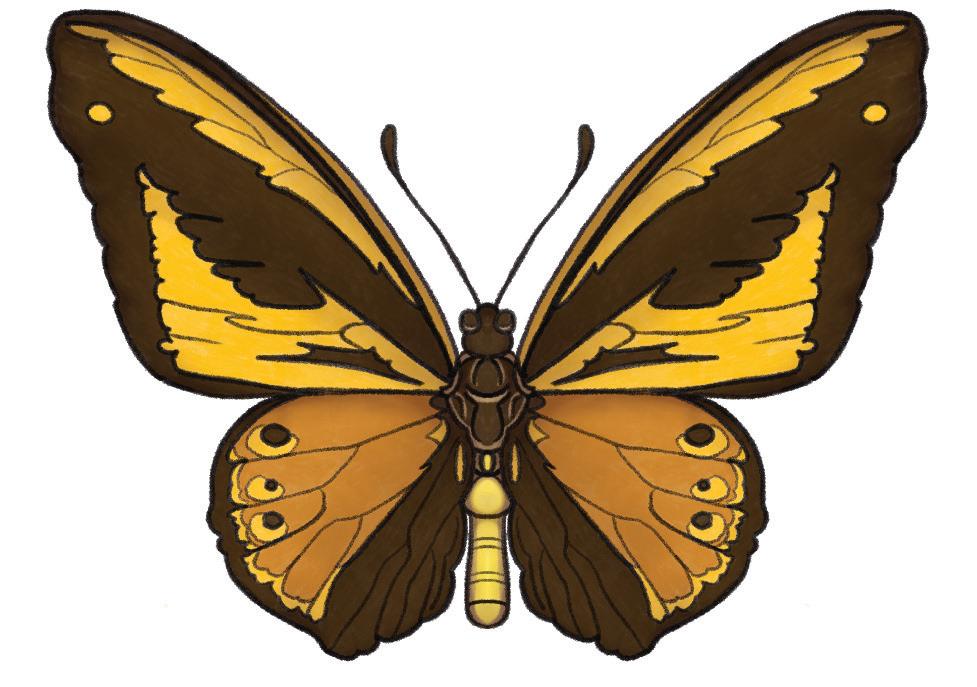

University of Arkansas – Fort Smith 53
En el calor
El verano llega y con él la desesperación que el calor trae. El resplandor del mediodía impide que la gente piense o trabaje, quizá por eso aún se toman siestas en tu pueblo, se usa el sueño como escape. Sin embargo, a ti el calor te encanta, buscas refugio en abanico, disfrutas del agua de coco y comes hielo para sobrellevarlo. Mientras todos se quejan, tú piensas en el frío, la nieve y el hielo que te esperan al regresar al extranjero; así que lo disfrutas y fantaseas con vivir en lo cálido, pegajosa, siempre.
De doce a las dos de la tarde no hay nada que hacer, entonces miras el televisor con tu prima, quien al igual que tú no duerme. ¡Chisme! La programación para esa hora se centra en la farándula y entre las pausas de segmento las animadoras bailan. Las chicas menean la cola en minifalda y te recuerdan que el país no ha cambiado, que sigue siendo el lugar sexista que dejaste hace años, que aquí no hay progreso a menos que no te cases con un viejo o seas cirujano plástico. ¿Por qué se prestan para eso? Desvías la mirada, evades la indignación pensando en los libros que dejaste en casa por no pagar sobrepeso, ¡tremendo error! En este pueblo no hay ni biblioteca ni librería y el internet es súper lento. ¿Cómo avanza un pueblo que no lee, cómo crece, cómo experimenta nuevas ideas? Te maravilla que aunque a la mayor parte de la gente aquí no le interesan las letras no carece de carácter, de cierta gracia, ¿cómo sería su vida si...Tu prima sube el volumen del televisor. Al parecer alguien famoso tiene un amante, más de lo mismo, pero en este caso la infidelidad fue cometida por la mujer y entonces la transgresión es percibida como aún más indecorosa. En el video aparece el
Por Carisa Musialik
marido poniendo al sol los trapitos que debieron tenderse en casa. Le llama puta, zorra, sin alma y llora con los mocos afuera delante de las cámaras. «¡Qué escenita!» «¡Mujercita! » dicen los comentaristas. Se ríen, se burlan mientras que tú te alegras de que esta sea su venganza, porque es mejor que la humille a que la mate. Nadie se atrevería a negar que el número de feminicidios ha incrementado en tu pueblo.
Al terminar el show, tu prima fantasea con lo que hubiese hecho en la posición del transgredido o del amante. No te interesa pero de todos modos prestas atención. Tu prima, exaltada, da tres o cuatro hipótesis de lo que debió haber pasado. Luego, hace un recuento de lo que ocurrió el mes anterior cuando Ana, su jefa, descubrió que su esposo le había sido infiel, y que una de sus clientas era su amante.
Le dañó el pelo, muchacha. Creo que le quemó hasta el cráneo. Le puso alisado en vez de un tratamiento capilar. La tipa se quejó varia vece pero la jefa le dijo que «el que quiere moño bonito aguanta jalone» y se lo dejó por un bueeeen rato. No sé cómo no no dimo cuenta porque se quejaba y se quejaba. Cuando se paró del lavapelo toa no quedamo con la boca abierta. Solo tenía una cuanta mecha pinta de blanco y al tocarse la cabeza se le cayó una. Se miró al espejo y como gallo endiablado le voló encima a la jefa. La tumbó al suelo y se enredaron como culebra. Tratamo de separarla pero no pudimo. La jefa hasta le mordió la oreja y ecupió un pedazo. ¡Gritamo como loca! Le pedimo que pararan pero llevaban el demonio por dentro. Nunca había visto a la jefa enojarse así. Voceaba, berreaba,
Azahares – 2024 54
parecía una chiva. !Jesú! ¡La jefa parecía que tenía el diablo! ¡Era el diablo que tenía! La arrastró por el suelo, la sacó a la calle, con la uña le desbarató la ropa y la dejó solo con el brasier. ¡Qué vergüenza! ¿Tú te imagina ? ¡Pobre jefa! ¡Qué sinvergüenza! ¡Qué decarada! ¡Abusadora!, dijo.
Respiras profundo. Tanta información te deja aturdida. Te sudan las manos. Empieza a molestarte el calor. Mueves el abanico y tratas de abanicarte con las manos. No dices nada porque eres amante y sabes muy bien que las cosas son más complicadas de lo que la gente cree, que cuando lo miras a los ojos su esposa desaparece y te conviertes en su mujer. Sabes muy bien lo que es estar con un “hombre ajeno” pero no te importa. Sabes que te echarán la culpa de que su matrimonio disfuncional “no funcione”, de quitarle la felicidad a quien en realidad nunca la tuvo porque nadie puede dar o quitar felicidad, por eso lo escondes. No compartes tu alegría, la engullas. A su lado te sientes comprendida, tranquila, feliz, a salvo. A su lado tienes la certeza de que las almas gemelas existen, ¡la encontraste! Con él puedes hablar de todo y de nada a la vez. Te tragas tu felicidad y esta baila en tu pecho cada vez que piensas en él. Poco a poco te acostumbras a no tener con quien compartir los días festivos, a no celebrar la navidad en casa, a compartir su tiempo con alguien a quien no conoces, quien no lo ve como tú lo ves, a verlo llorar porque por agradecimiento y amor a sus hijos no puede despertar a tu lado, a dormir sola en el frío y no tener, cuando más lo necesitas, su calor. Eros ganó la batalla, sucumbiste y ahora vives llenas de secretos, callada, feliz pero
con un nido vacío, sin esperanza de cumplir con la misión de la naturaleza, de reproducirte, porque cuando sus hijos ya estén listos para irse de casa, para tu sistema reproductivo será muy tarde. Respiras. El sudor recorre tu pecho. El calor se está haciendo insoportable. Tienes náuseas y pena por esa mujer, pero no te atreves a vociferarlo.
––¡Ay Dios mío!–– Es lo único que te sale.
Muchacha, la cosa no termina ahí. Toa la clienta salieron a la calle. En frente del negocio hay una mata de mango y se lo arrancaron to. ¡No no dejaron ni un manguito! ¡Se lo tiraron a la mujer! Cuando vi a una arrancar una varita llamé al esposo y por milagro contestó. Llegó volando.
––¿ Y el hombre? ¿Qué hizo? –– preguntas media desesperada, esperando que se haya hecho lo correcto y que el cuento termine con un final feliz.
—— ¿ Y crees que iba a hacer, mija? ¡Lo típico de to’ lo’ hombre’! Se bajó de la jeepeta, separó el pleito y se llevó a su mujer.
—-¡Diablo, qué calor!
University of Arkansas – Fort Smith 55
This Our Barrio
Those them boys, skateboardin' down Main, Carry cans, high gloss spray paint. Fill them pots with cocks get chased by cops. Next day, the city fills them in.
Those them girls, bandanas, tight fit, Anarchy patches, hoop er’rings. Rims-engraved, gold chains, manicured, red lips, Mark up los gringos, bright paint.
Those them scholars, an honor, hood made, Wear their caps, reppin’ Padres, SD. Khakis creased, there ain’t no other way, this degree is for us, it’s homemade.
Those them riderz, on Highland, beep beep Raise banderas, the eagle and snake, Bumper to bumper they line up for miles, Work real hard on them cars, show them off.
Those them buildings with stories, red brick, concrete, murals, warm bread, dulce, tamal y café, cinnamon on our tongues, Mexican
This our Barrio, it’s been flourishing. Guadalupe, the bells, let them ring!
Those our elders, the Doñas y Dons, raised our babies, raised our moms, built this hood with a fight for what’s ours, took their beads and prayed for us.
by Alejandra Herández
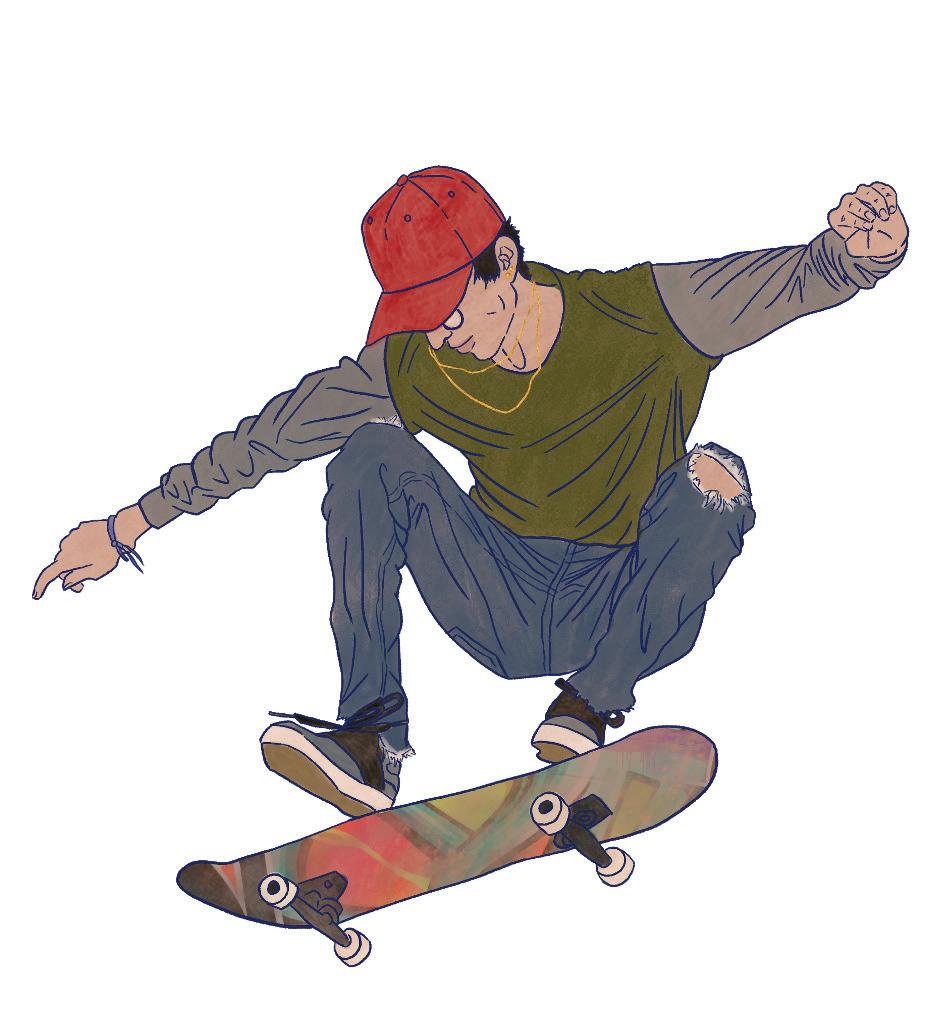
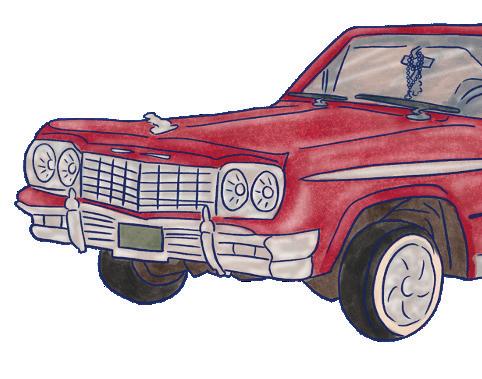
Azahares – 2024 56
Mexican & American

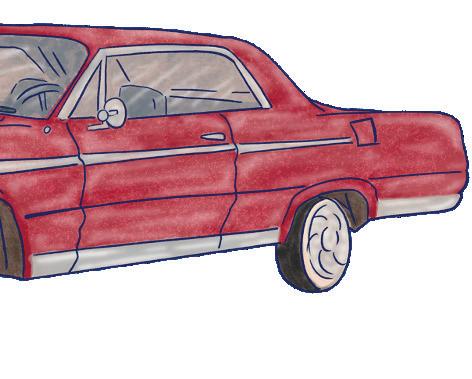 by Alejandra Herández
by Alejandra Herández
There is something I know that you don't understand because you are Mexican and American in an official way where as I was 'just born.'
Who am I?
The Mexican? Mexico would say no. The American? America says no. My parents are Mexican, and legally, they are American.
When I speak Spanish at the supermarket, they switch their expressions, they didn't know: I am gente, just like them.
I make sure to saludar, siempre en español, that's the only way that they will know I am like them.
There is something you don't understand —
When you are Mexican and American, you aren't Chicano, you don't claim that, but I do
Chicano means I've arrived from Latino-America
in my mother's womb. Chicano means I've forgotten the Spanish that dictated my life before school Chicano means I am just like you
Pero también, soy como tú.
University of Arkansas – Fort Smith 57
Quinceañera
by Alejandra Herández
& what would you tell that fifteen year old? that warm, mellow night at the end of May a quinceañera dress hanging by the window thorns & stems stencil a not-yet yellow fence — when the moon hits, roses are sprinkled in it. Out, in the kitchen, there’s laughter, the girls arrange their pink tailored dresses, the boys their black banded-collared blazers, waistbands matching the pink of her bedroom. Her oldest girl-cousin took her to get her nails & eyebrows done at the salon for the first time — discounting the time Azucena and Paola from next door used tweezers, made skin blush, the rush felt that her mama wasn’t there to say no, a sharp hum — a french tip.
Esta noche bailamos
by Allan G. Scherlen
A long strand of cable tied with rope to poles, brought free power from a neighboring town. By sunset, electricity was flowing - colored bulbs
and raucous music cascaded across the village, brightly energizing the town for a fiesta; music from houses blended with songs from the plaza. In the park,
families’ laughter echoed through trees, and children chased one another, as grandparents smiled indulgently. And around the plaza, everyone enjoyed the fiesta - couples sang along, “esta noche bailamos,” and danced to salsa playing on the radio, powered by borrowed energy.
Azahares – 2024 58
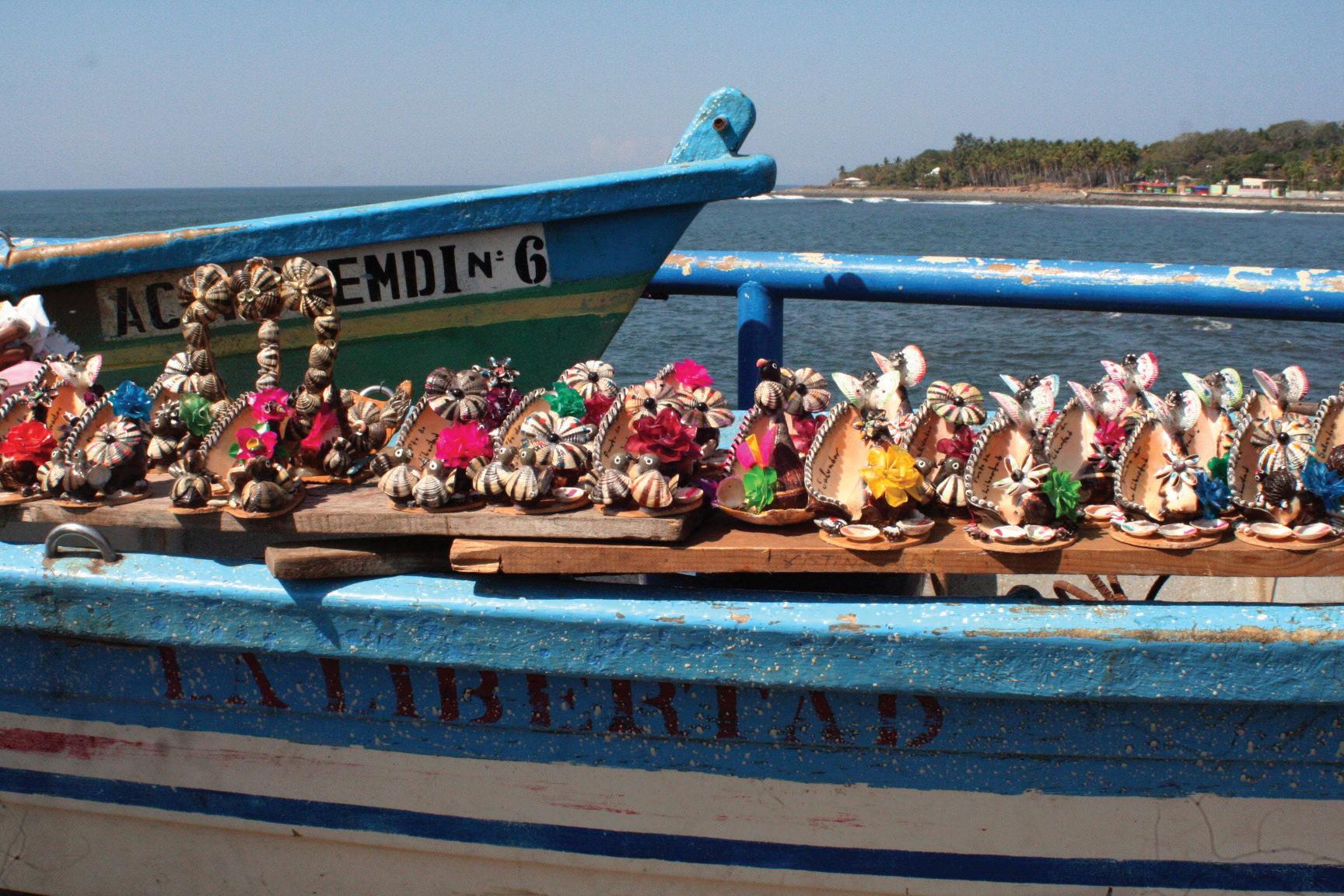
of Arkansas – Fort
59
University
Smith
Miroslava Arely Rosales Vásquez - La libertad - El Salvador
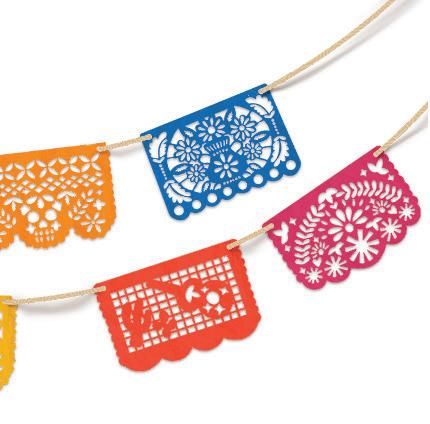
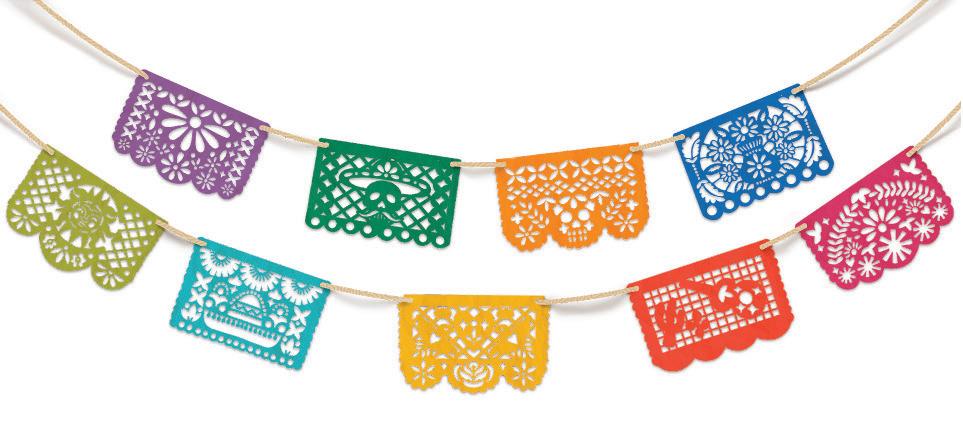
Los límbers
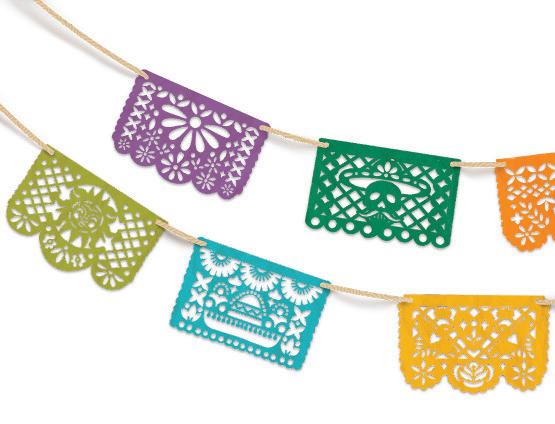 por Gabriella Hernández Donato
por Gabriella Hernández Donato
De crema, de cherry, de parcha. Esos eran los sabores que mi paladar añoraba en nuestras excursiones cada semana.
De uva, de china², de parcha. Esos eran los sabores que el paladar de abuelo pedía.
“¡Doña Lydia! ¡Limbers!", gritábamos abuelo y yo para agarrar la atención de la vecina. Gritábamos desde ese portón que se parecía a la muralla China.
"¡¿De qué?!", nos gritaba doña Lydia de regreso. Abuelo escogía por mí, "¡de crema!"
Y yo por él, "¡de parcha!"
Nunca nos equivocábamos de lo que cada uno quería. Hasta que las memorias de abuelo se fueron volando.
Se olvidó de sus sabores.
Se olvidó de los míos.
Se olvidó de doña Lydia.
Se olvidó de los limbers.


Cuánto quisiera que esas memorias volvieran a aterrizar en esa cabeza de abuelo.
Pero, aunque se hayan ido, todavía viven en mí.
De crema, de cherry, de coco.
De uva, de china, de parcha.
¿Qué limber escogeríamos hoy?
Azahares – 2024 60
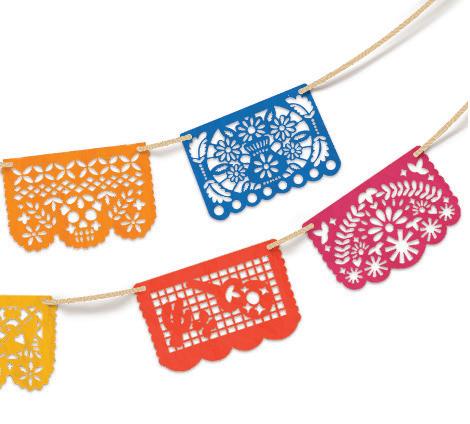

Los días en México
Los días en México eran simples
La familia salía al centro
Buscando nieve o taquitos
Cuando salíamos de misa
Nos parabamos por un raspado de limón
Estábamos contentos y llenos de comida
Los días en México eran más simples
Ahora no salimos
Nunca tomando nuestro tiempo buscando
Buscando nieve o tacos
Regresando a la casa después de misa
Olvidándonos de lo que antes teníamos
Los días en México no eran tan simples
Todos los recuerdos que tenía
Mi mente infantil los hizo más bonitos
Más simples de lo que eran
Pero en realidad
La vida en México nunca era tan simple
Los días en los Estados Unidos tampoco son simples
Pero, por lo menos tenemos nuestra familia
Con un gato y una perra
Buscamos comida China y comida Americana
Hacemos tamales y pozole para navidad
Los días no son simples pero estamos felices y llenos
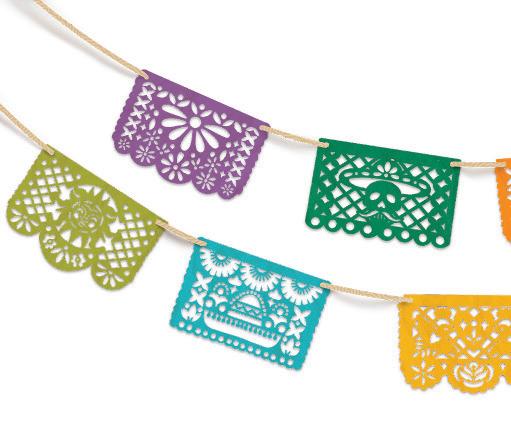
por Athziri Romero

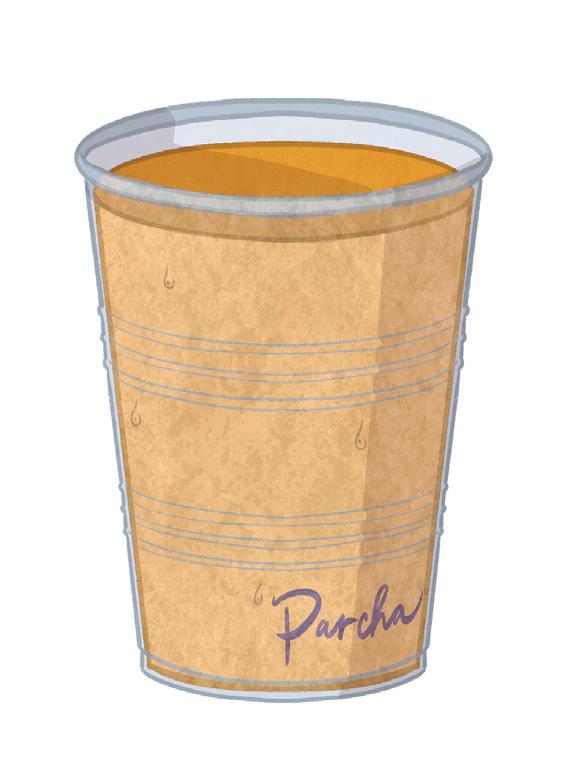
University of Arkansas – Fort Smith 61
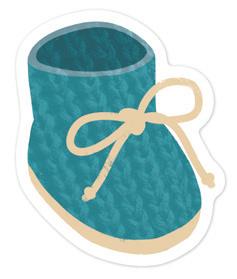
Las Hermanas and Dad
 by Gloria Lopez
by Gloria Lopez
“Go to the hen house. Get twelve of the best eggs. Don Agosto smiles and winks at Grace, “las muchachas ya me pagaron.”
Las muchachas lived next door to Grace and they were not muchachas, they were two old spinster sisters— Amelia and Berta Garza. People in town called them las Hermanas Locas. It could be because Amelia wore hats, and by hats, she wore two or three on her head at the same time. She also wore her bright red lipstick outside the line of her lips. Berta liked peering into people’s windows, sticking out her tongue, cackling, then sticking her tongue out again. They were the town’s crazy old ladies, and no one paid them much attention. In the evenings they walked along the main roads waving at people in the passing cars. Some would wave back, most would not.

Grace’s grandmother knew them when they were young. She said that the parents only loved the boy. He was the prince in that home. He never worked. They made those poor girls go to work as soon as they could hold a broom. Abulita always ended the story with, “pobres muchachas.”
Both sisters worked as janitors at the elementary school until they were told to retire. They never married and never left San Roman. It was just the two of them after their parents died.

Abuelita said they worked to pay for their brother’s schooling and when he married la gringa, he forgot who paid for his diploma. He forgot who paid for his car. He forgot who paid for his food and clothes. He forgot his sisters. They were not invited to his graduation, nor his wedding, nor the baptisms, and birthday parties. She’d shake her head saying, “pobres muchachas.”
Grace’s father sold them a dozen eggs every Monday. Grace placed the bowl of a dozen fresh eggs and a handwritten note. Texas heat or cold, hurricane warnings, or tornado watches, the eggs appeared at the sisters’ home on the bench to the left of their front door. Sundays, the bowl appeared on Grace’s doorstep. The bowl was never empty, it contained, bottle tops, buttons, small clean mole jars, some chewed up plastic toy soldiers, cracked sunglasses, gum wrapper foil shaped into rings, feathers, a baby footie, a Bic pen with no ink and other small pieces of junk. For as long as Grace could

Azahares – 2024 62


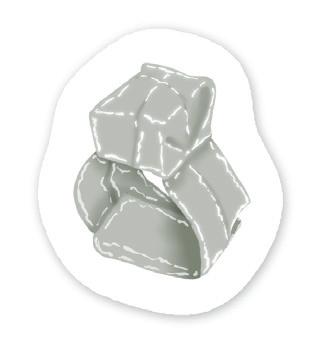
remember, her father exchanged eggs for trinkets. Don Agostos’s workshop cabinet held hundreds of small plastic bags filled with trinkets. Each bag had a date of payment written on it. Monday evening her mother, Doña Martina, asked, “¿ Cuanto te pagaron?”
“Unas plumas, dos fichas, y la cabeza de una Barbie.” He smiled as he reported the payment. Doña Martina sighed, ‘I’ll get the plastic bag.”
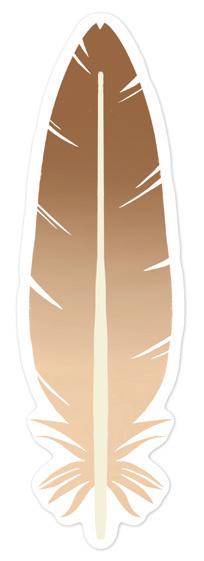
Grace remembers asking, “Papi, why don’t you throw those things away? The Barbie head is scary, and the other things they sent you are junk—mugrero.”
“Grace, hija mia, they go through people’s garbage to find these treasures. Now, how would you feel if you found what you had given me in the trash? They do not want the eggs for free. They do not want charity. I would be throwing away their gratitude and their pride. The fichas and the doll head took a lot of work for these two to find. You don’t dispose of a person’s work. The note I send with the huevos, have you ever read it? It is a receipt. Look, this is for Monday morning’s bowl of eggs. “Léela”.
“Señoritas Amelia y Berta Garza, departe de Agosto Leal y famila. Pagado: dos fichas, una pluma de paloma y una cabeza Barbie por una docena de huevos. Gracias.”
“Mija, the Garza sisters do not have much, but what they find to pay me, in their eyes, is valuable, and for me—they are valuable.”
Grace looks at her father placing the note at the bottom of the bowl. She sees a good man—a man of value.
“Go to the hen house. Get twelve of the best eggs. Don Agosto smiles and winks at Grace, “las muchachas ya me pagaron.”
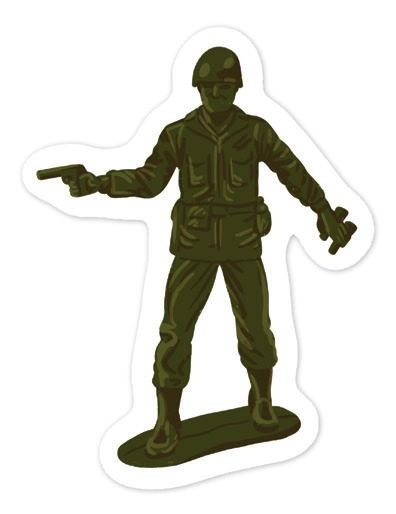
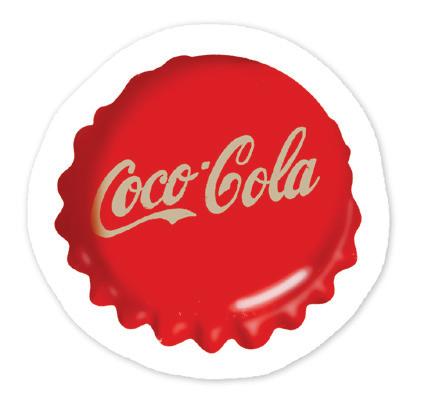

University of Arkansas – Fort Smith 63
La lucha de ser mujer
por Lila Chapman
Es difícil ser mujer
Tienes que vestirte de cierta manera.
Tienes que actuar de cierta manera.
Respirar de cierta manera
Mirar de cierta manera.

No puedes usar demasiado maquillaje o es un problema.
No puedes hacer lo que hace un hombre o es motivo de preocupación.
Eres un cuidador.
Si no sabes cocinar, limpiar o cuidar a un hombre, no vales nada.
Si tienes un trabajo mejor que el de tu marido o pareja es un problema.
La lucha por ser mujer es una mezcla de expectativas sociales y la perspectiva de cómo un hombre cree que debería ser una mujer.
Azahares – 2024 64
De colores
por Richard D. Mahoney
Estos son los días de cristal
De soles suaves, de lunas mojadas
De una niebla blanca que cubre
Todos los dolores de esta vida
Estos son los días de rosas
De colores penetrados por amores
Hasta el fondo
Donde hay un rocío bebido
Por los benditos de fe
Hora después hora
Me voy volando como un pétalo
Arrebatado por ráfagas de colores innumerables
Hasta finalmente me acostaré
Para brillar y sonar en una tarde azul y eterna.
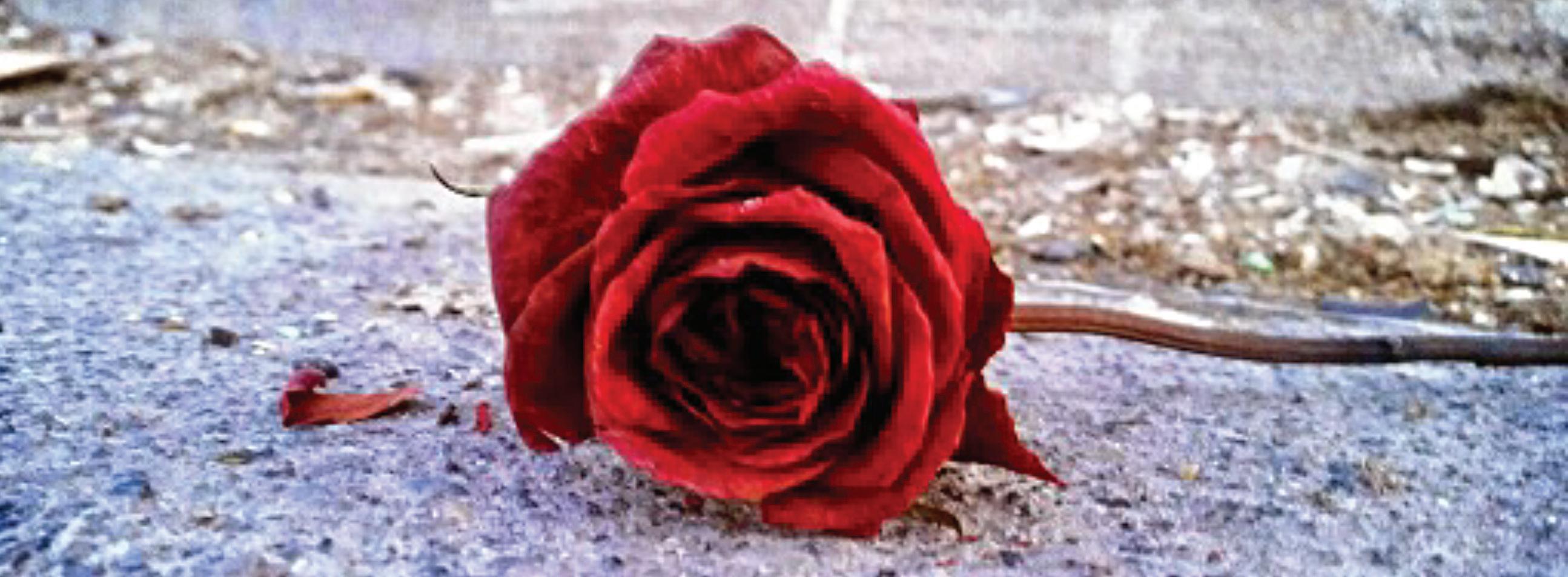
of
–
65
University
Arkansas
Fort Smith
Cauldron
Soups are spells
stews are supernatural dishes stir spices, sprinkle herbs ponle sazón!
dash, dice, and dip
root vegetables, sacrificial meats a route to your roots, linage, and genealogy
by Karina Guardiola-Lopez
Your great-grandmother’s recipe is speaking your grandmother’s prayers are still healing your mother’s magic is manifesting caldero, cocina y cultura this dish serves as a reminder it took a village to create you this cauldron is more than a pot it’s your history
Saffron, sage, salt, and two types of squash shock tongues, soothe souls, and lift soles
say a prayer
keep stirring
sip slowly, slowly swallow serve while steaming
listen
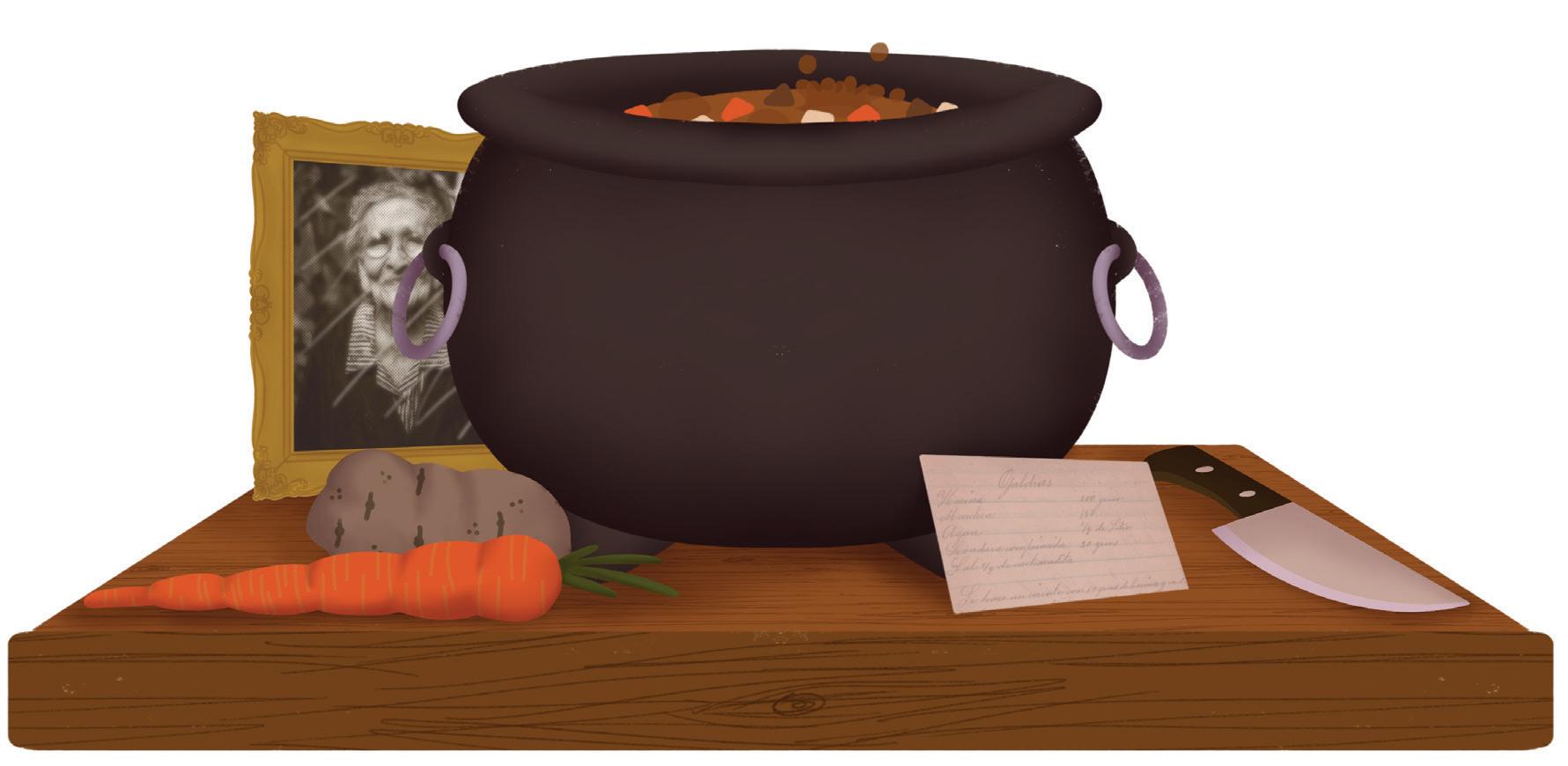
Azahares – 2024 66
Margaritas on a Mysterious Island
There has been some confusion as to the reality of the island of Bermeja (Isla Bermeja, an ancient name which may allude to a sunset refuge). Isla Bermeja lies in the Gulf of Mexico, northwest of the charming city of Mérida and the lovely beaches of Mexico’s Yucatan Peninsula. The island has been on maps for hundreds of years, going back to the Iberian explorers, and can be seen on some maps available today. Yet many people, often in positions of technical authority, claim Isla Bermeja doesn’t exist.
The way I got interested in this puzzle was that, while visiting Mallorca, off Spain, some time ago, I noticed that a local magazine for expats, PalmaToday, featured fantastic photographs of Isla Bermeja. The article, by a Brit from Cornwall, was explaining that, at a certain point, for various reasons, the Mayan civilization was collapsing in economic and military anarchy, so an enterprising and savvy Mayan leader simply took his followers and their classic Mayan culture from what is today Mesoamerica to an island off the coast, Isla Bermeja. The island, because of several factors—unpredictable sea currents, rafts of seaweed, hurricanes, drifting, foggy marine layers—is extremely difficult for outsiders to locate consistently, and that may be the source of the controversy about this fabulous locale.
What really drew me to Isla Bermeja was the realization that here, just off the coast of Mexico, existed, in effect, a miniature laboratory showcasing classic Mayan culture in modern garb. If anyone wondered what a brilliant example of one of the greatest civilizations of all
por Steve Davidson
time would look like updated, Isla Bermeja was there to display it.
Few civilizations can compete in magnificence with Mayan cities, with their glistening limestone palaces, plazas, stone causeways and canals slap-bang straight through the shadowy jungles. The Mayans were highly aware of nature, and the cycles of the seasons, which they tracked with observatories and advanced astronomy. Thereby, they carefully and successfully planned their planting and harvesting, which provided them with copious food. Mayan mathematics included the elusive zero, an unusual intellectual accomplishment. They not only had a written language but produced many books, such as the communal work, the PopolVuh, the story of Good triumphing over Evil. Skilled artisans made astonishingly clever paintings and pottery figurines, elegant sculptures, as well as glorious-looking buildings, radiant with romance and mystery.
The distinctive and delicious cuisine included tamales, chilies, fish, shrimp, conch, honey, chocolate, cinnamon, and vanilla. Feasting, music, and plays provided breaks in the agricultural routine. Governance was shared, and networks of trade linked the numerous cities of southern Mexico and Central America in a thriving Mesoamerican community of artistic beauty, intellectual genius, and fruitful prosperity.
However—how to connect with anyone on Isla Bermeja?
Fortunately, from my point of view, Mexico and the United States are in a bit of a
University of Arkansas – Fort Smith 67
brouhaha over this exact section of the Gulf of Mexico. The reason? Oil. There may be a substantial amount of oil in the area, beneath the water. Publicizing the existence of, and the rights of, Isla Bermeja would enhance Mexico’s claim to the oil. Consequently, it was less difficult than I would have imagined to arrange a visit to the island, and, at lunch, to interview one of the Mayan governors, specifically, a Prince Pakal, about this fantastically interesting and unusual place.
I arrived at the dock of the harbor of Progreso in Yucatan, at the edge of the Gulf of Mexico, on a misty morning, on time, and found, waiting for me, a Mayan-looking fellow in a white and blue sailor outfit. He smiled and waved pleasantly at the stranger wandering about. “So, you are off to see our Ahau, our Wizard!”, he remarked. “Vámonos!”, he exclaimed, as I carefully boarded his small, golden submarine, the María. We cruised smoothly, well under the waves, over the reefs, among the curious multicolored schools of fish, the sharks and the rays, even above a couple of large Mayan sculptures looming magically in the turquoise waters. “They keep the Gulf safe”, the captain explained laconically. After an hour or so of fast cruising, the seabed rose before us, we surfaced in a blast of seawater, floated over to the Bermeja dock, the hatch was opened, and I deboarded.
I was really stunned at the panorama spread out before me. Here was Isla Bermeja—huge white limestone Mayan-design pyramids glistening above the deep green palm trees and purple and yellow tropical vegetation, all rising behind glittering white beaches and turquoise water. Not a Shining City on a Hill, rather a ShiningCityontheSea.
An attractive lady, a Mayan government representative named Xoc, met me at the island quay. In her zippy Vuhl Mexican sportscar, we purred down the straight, smooth, white, limestone streets towards the restaurant Palenque.
I was astonished at the magnificence and perfect maintenance of the island architecture, and the cheerful, buzzing orderliness and extreme cleanliness of the city, reminiscent, in its civic elegance and hygiene, of the splendid coastal Basque city in Spain, San Sebastian. The basic design of Mayan architecture is stepped pyramids. In a nod to modern times, a limestone layer is alternated with bronze-gold colored, reflective glass, behind which sat offices and condominiums, all the way up to the top, where presides, typically, a square penthouse of pillars, glass, and flat roof—often a CEO office, a prize condominium, or a restaurant. The white limestone layers are decorated with Mayan glyphs which, I was informed, say things like, “Education first!”, “Let’s dream big!”, and, “We can do it!”
The Mayans conceive of themselves as parts of nature, so are partial to cars with animal names. Therefore, down the streets of Isla Bermeja prowl Jaguars, Panthers,
Stingrays, Barracudas, Thunderbirds, and Vipers painted in Mayan colors of red, turquoise, orange, white, black, or gold, and often in combination.
As we rolled past a miniature limestone pyramid, sitting in the center of a lush park on the main avenue, Xoc, performing as a responsible tour guide, explained this was symbolic of the Sacred Mountain. It was surrounded by a rainwater moat, fed from a cistern, which was symbolic of the Great Sea.
Azahares – 2024 68
Soaring high behind the pyramid is a handsome ceiba tree, called by some scholars the Axis Mundi, the Tree of Life. The small building on the top of the pyramid contains a crystal skull, supposedly that of Lady Rainbow, consort of the Sun. At the exact moment of the spring equinox, a beam shines through the narrow doorway of the building at the top, and lights up the crystal skull, which can be seen through the generous windows of the building by the surrounding crowd below. The assembled spectators traditionally clap and cheer at the moment of illumination. Folk rumor has it that, on that day, once a year, the Sun dances with his Lady Rainbow, and so begins again the eternal dance of life, and so also begins an Easter season festival, with flutes, drums, and copper bells, and singing, dancing, and fabulous outdoor dining.
Eventually Xoc delivered me to the restaurant, and thus I found myself seated, waiting, in a setting more than a little suggestive of paradise. I was sitting on a stone verandah, under the shade of numerous palm trees and a brightly colored, woven Mayan awning, at a wooden table decorated with fresh-cut tropical flowers. At exactly noon, as I sipped a margarita, a black and gold Jaguar pulled in front of the restaurant and parked between two Mayan glyphs which read, I would guess, something like:
“Reserved-for-royalty-so-don’t-park-here-oryou’ll-be-in-big-trouble”. An athletic-looking gentleman of early middle age stepped regally out of his car, quickly scanned the veranda, caught my eye, waved, and ambled over.
“Buenos dias!” said the prince (a reigning, though elected, royal, an Ahau), in a warm and sincere voice. “I am Prince Pakal, but I also
carry the name Manuel, therefore please feel free to call me Manny! I am quite happy for your visit, por supuesto, as we are in the midst of thinking about adding a tourist slice to our, largely secret, economy.”
The prince is about five foot, nine inches tall, with the slim but fit look of an acrobat, say, of someone who plays a tough game in a Mayan ball court (of some kind). Dark hair, piercing eyes, radiant smile, infectious laugh. A portrait of charm and power.
He was wearing dark leather huaraches, baggy white cotton trousers, and a loose, traditional, elegant Mayan white shirt. Tortoise-shell Balenciaga sunglasses and a yellow and black Breitling dive watch marked him out as a man of taste, wealth, and action. Around his neck, on a bright gold chain, was a Tau cross of jade. Casual in manner, but polished in thought, speech, and equipment. Because part of his education was at the University of California, his English was excellent.
This being a prince, there was no need to order. A profusion of wait staff packed the table with an iced pitcher of margaritas, handmade, pale green glasses, and bright, hand-painted pottery dishes holding sopa de lima, ceviche, grilled chili shrimp and chicken fajitas, corn tortillas, tamales, chocolate mole sauce, guacamole, and quartered fresh limes, with dessert of dulce de papaya and a small jade dish of cinnamon chocolates. A feast fit for, well, royalty.
A pleasing young lady (an Ahau intern, as I understood it, a royalsquire, so to speak) in red half-heels, short multicolored Mayan skirt, white blouse, and gold and jade Mayan necklace waited attentively by the door to provide anything the other four or five wait staff might have forgotten. As we dined, I asked questions
University of Arkansas – Fort Smith 69
continued
which occurred to me, and the prince provided answers altogether sensitive, conscientious, and well-informed.
I: This city is a Mayan vision! It’s magnificent. How do you manage that?
P: Entonces, it’s not so secret. Our architects go to school in Mérida, and learn construction basics. Then they come back here, and get a master’s degree in traditional Mayan design. Then they blend the two—innovativeengineering matchedtothattraditionalMayan look you have noticed, which we all love, which is us. If we lose that, we lose ourselves.
I: And everything is so clean and well kept up, with an air of safety. How is that?
P: [Laughter.] Gracias! Our people are good-hearted. Warm and caring. We call that the golden heart. El corazón dorado. We apply the golden heart to every thing we do. Education, entertainment, parenting, health care, gov ernance, police, financial planning, city planning—everything. We expect the people and the activities of our Mayan home to show ev idence of el corazón dorado, throughout. We, in the palace, want to see good intentions, successfully accomplished, and carefully preserved, wherever we turn.
I: And if you don’t find that?
P: [Laughter.] If we don’t find that,
ay caramba! Permits are not is sued, or renewed. Funds are not provided. Government assistance is not forthcoming. Interns are not assigned. Fines are levied. Some body’s bad manners come to a halt!
It’s right, or it’s wrong. We keep it simple for everyone. We’re fair, but firm!
I: But how do you get it going? How do you make it happen so well, here?
P: There is a myth in the world— “pernicious”—as I suppose you might put it, that a people have to wait for good things to happen to them. This is not so.
We here on Isla Bermeja choose to live well, honestly, with caring, and communal hard work. Because we choose it, it happens. We believe it, we teach it. Along with our native, calm gravitas, we are cheerful and friendly. We like people like that, so we are people like that.
People raise the kind of children they want to have, and build the world they want to live in. This is the world we want to live in, so, we build it. Every day.
I: Ah, perhaps I begin to get what you’re talking about. You start with the golden vision. Then you spell that out. Then you teach that to each generation as it comes along. Then everyone shares in creating your good world. Is that close?
P: Exactamente! This how we live la vida dorada!
I: Speaking of bringing up the next
Azahares – 2024 70
generation, I hear stories about something called a Mayan Vision Quest. What is that?
P: [Laughter.] Sí,sí—the Coming ofAge. A crucial part of our culture. Very exciting, not easy. The changeover from childhood into adulthood.
I: How does it work?
P: At the age of fourteen boys and girls are expected to go on an indi vidual trek—supervised by a wise mentor of their choosing, often an aunt or uncle. On their Vision Quest initiates have much alone time, then many campfire discussions with the mentor.
I: What are they supposed to achieve out in the jungle?
P: Initiates are expected to accomplish two things.
First, they are expected to identify a Shared CommunityMission—what will they do to help their people? How will they make a contribution to the health and livelihoods of their family and friends? This is very broad. Some choose medicine, some choose art, some choose agriculture, some choose business. There are many fields from which to choose. Some, naturalmente, will choose to be home and raise the children, which is, in a way, our community’s highest calling. The
mentors help guide the initiates, through dialog, toward areas which are useful, and in which the initiates have talent.
I: And second?
P: Second, Questers, as they are often called, are expected to identify a Personal Passion. This is the specific section of their Mission about which they have especially high hopes and deep interests.
This is more narrow.
I: For example?
P: A Quester with a talent for medicine, might choose to narrow down to maternity care. A Quester with a talent for business, might choose to narrow down to entrepreneur ship. Some are passionate about teaching, or caring for children. Every choice must have a communitybenefitandapersonalbenefit, and must be likely to succeed, likely to bring honorandreputationtotheindividual,andhealth andprosperitytothecommunity.
I: What if the initiates never come up with a mission or a passion?
P: We leave them in the jungle! Just kidding, porsupuesto.
It’s not a problem. Our young people hear from their early years about the Vision Quest, and they anticipate it with great joy.
I: Why?
P: Por qué? For the usual reasons. Every child wants to grow up. As soon as possible!
University of Arkansas – Fort Smith 71
continued
The Vision Quest is the signpost of the formal entry into adulthood and adult privileges, and most children respect and desire that. In addition, when the Questers complete their initiation, and return home, they receive gifts from friends and family at a traditional ceremony of sacred fire and songs, at which time each new adult receives a new suit of handmade clothes.
That ceremony, naturalmente, is followed by a party, which everyone enjoys!
I: It seems like, in dealing with kids, everyone wonders . . . what are they really thinking? How do you know your messages are getting across?
P: Entonces . . . we held a contest recently, for secondary school students, asking them to share their “Finest Mayan Thought”. Permit me to tell you what the winners said. I have it here on a piece of paper, simply to remind myself of the wonderful generation growing around us:
RODRIGO TIKAL (14)
“We are a great and fine people. We should allow our greatness to shine forth to all the world.”
MARIA UXMAL (16)
“To stand with our head tall among nations, we must be strong. To be strong we must be brave, and have great knowledge. Knowledge is our torch in the darkness.
On our journey, it is our light.
ERNESTO CARACOL (17)
“To be a good person, and to live a good life, is to share. There are those who would refuse to share. We must ever be on our guard against those who would condemn their community to ignorance and to poverty, to suffering and to hopelessness. We must be bold, and also generous, to realize our dreams and our future.”
I: How wonderful. It sounds like, in those cases, your teaching found fertile ground.
One of the things people wonder about the Mayans, since their civilization lasted so long and it was so extensive, all over southern Mexico and Central America, is— did the Mayans have a political philosophy which kept every thing glued together, at least, for a long time?
SOFIA TULUM (15)
“I love my family, my school, my community, and my country. I want people to see my love and happiness, so that love and happiness between all people will grow and grow.”
P: Porsupuesto! Can one imagine an exceptional culture without an exceptional philosophy? It was true then, and is true today—as with Rome, Greece, China, and Perú, we have an upliftingandunifying, prosperousandharmoniousphilosophy of life. We don’t think of it as good as Confucius or Marcus Aurelius . . . we think of it as better!
Azahares – 2024 72
I: Could you tell me about some of that?
P: Naturalmente, with pleasure. This is contained in the TúumbenPopol Vuh, our new version of the ancient CommunityBook, telling the stories and myths of our people, which bind us together, give us our dignity and contentment, and guide us through the day, and across the cosmos. There are nine rules, as there are nine platforms of life, as there are nine platforms on our pyramids.
We pass the Nine Rules out to children as soon as they reach school. They memorize them, and they live them . . . iftheyexpectto gaintherespectofthecommunity! I have brought you a copy, translat ed, por supuesto:
THE NINE RULES
1. RULE OF THE CREATOR: I created science andlearning,booksandwriting. Isaytothee, everylifeisprecious. Isaytothee,ensurethe oneIhavegiventheeisaPearlofEternalBeauty. BethatPearlforMe,andbethatPearlfor thyfamily,andbethatPearlforthyself. Iam watching. Iamlistening. AndIdonotforget. So know the Wise.
2. RULE OF THE TREE OF LIFE: In the Great Distance, far from human habitation, I grow, the Axis Mundi. I grow from the Seed of All that Is. In the Circle Voyage of Life, I am the Beginning of the Beginning, and the End of the End. I am the place from which you Depart, and I am the place to which you may Return.
As I lift up my arms to the infinite and eternal stars, I shade you from Evil.
Verily, I am the Home of all Souls. Believe in Heaven. Have faith. Do not despair.
3. RULE OF THE JESTER: The sun rises, the sun falls, and so there is darkness. The rains appear, the rains disappear, and so there is drought. In the Wrong Times, those who should live, do not; and those who should not, do. I, the Jester, am the author of the unlikely and the unjust, the sad song of emptiness and the shrill laughter at midnight. Wail at life, if you will, at its misfortunes. Yet, when all else abandons you, laugh. I shall hear you, and we shall laugh together.
4. RULE OF THE MORNING STAR: See your day ahead in your eyes. Look with good cheer at all the things you may do before the sun goes down, at all the goodness you may share with your people today, and every day. See your time stretching before you, then live it well and truly. Every fresh morning, you and I shall step onto the Road of Life.
5. RULE OF THE SUN: Know joy. I grant you light, and warmth, and energy that you may grow in your strength and wealth. As the trees and crops prosper across the land, as the fish flourish in the sea, make your life a bounty. Take up the gift of harmony and happiness. Be my company. We are one.
6. RULE OF THE CORN: I am the Rule of Causes. Whatever you desire to cause, harken to my words. I am the wisdom that shines forth in the darkness. I am the steps up to the jade alter. I am the golden fields, shining in the sun, of your health and prosperity.
University of Arkansas – Fort Smith 73
continued
In whatever your plan, first, gain knowledge; second, plant wisely; third, harvest fruitfully. Then will you know abundance and jubilance.
7. RULE OF THE JAGUAR: I am powerful, and I am clever. I slide through the jungle with stealth and grace. Be like me. If you must strike, strike when the hour is proper, in justice, and in courage. Then, beside you I will be.
8. RULE OF LADY RAINBOW: I am the sunlight, and I am the sea. I am the Love of the Earth, and the Love of Humanity. As there is Glory above, so is there Glory in your hearts. I share the Love with you, that you may share it with others. Reach out to me, and carry me wherever you go. May peace and beauty reign among you. Be merry.
9. RULE OF THE MOON: When your crops have been planted, and harvested, your home cleaned, and your food cooked, and eaten, when the sky turns to indigo dressed in its cascade of Heavenly stars, it is time to rest. Be blessed. It is the hour to sit by the fire and drink chocolate with cinnamon and honey. It is the hour to tell, and to hear, your stories, and the stories of your family. I am with you, above, shining in the sky, and below, reflected in the water. I am all around you. Sleepin comfort and contentment.
From a distance came the sound of classic Mayan trumpets and the beating of drums. “The changing of the guard at the palace”, remarked the prince, checking his watch. With that, he stood up, smiled, looked at me, and mentioned, “The oyster has a hard shell, therefore, most people pass it by. But inside the oyster is a pearl. We are the pearl of our land.”
Then he raised his hand in graceful farewell, saying, “MaymyWordscarryyouinPeaceon yourJourney”. Then he turned, strolled with his refined poise toward his golden Jaguar, and drove serenely away.
I don’t know that I have ever talked to anyone with as much emotional depth, intelligence, and kindness as this Mayan Prince Pakal, this Prince of Peace.
It all reminded me, finally, of that wonderful Christmas op-ed from long ago, written by Francis Church. Isla Bermeja is an eternal symbol of a lush life, lived by good people, governed by wise leaders. Yes,world,thereis a Prince Pakal.
Azahares – 2024 74
Lista de contribuidores
Jessica N. Arzola-Grissom lives with her husband and son in a small Texas town. She enjoys writing, reading, yoga, tea lattes, bookstores, libraries, old journals, and traveling.
John L. Bieber, a retired agricultural economist, lived in Paraguay in the 1970s. The art submitted here are Paraguayan indigenous lace pieces called “ñandutí,” a Guaraní word meaning “spiderweb.”
César Vladirim Brizuela Zelaya - Su poema fue escrito para una tarea de lenguaje cuando estaba en su primer año de residencia en los Estados Unidos.
Roger Camp vive en Seal Beach, CA. Su trabajo ha aparecido en Pank, Rust+Moth, Gulf Coast, Southern Poetry Review y Nimrod.
Irene Cantizano Bescós is a writer and immigrant from Spain lost between two languages. Her work has appeared in Black Hare Press, Moria, Five Minutes, (mac)ro(mic), Tales to Terrify, and elsewhere.
Lila Chapman is a 21-year-old Arkansan. She is a female in the Army National Guard and an advocate for women in power. She has always had a passion for Spanish language and culture.
Alex V. Cruz is a Paterson-born Dominican Magical Realism author. Alex graduated from Columbia University with a Creative Writing and Hispanic Studies degree. Instagram and Twitter @Avcruzwriter.
Dr. Steve Davidson is a California clinical psychologist who writes non-fiction and fiction about mental health issues. His specialty is human operations--behavior relative to higher values.
Robert René Galván,born in San Antonio of Indigenous/Mexican heritage, resides in New York City where he works as a professional musician and poet.
Fabián González González, nacido en El Charco, Urinagato, GTO., México, ha sido publicado en revistas literarias como Notre Dame Review, Laurel Review, ¡Pa’lante!, y Penumbra, entre otras.
University of Arkansas – Fort Smith 75
Jake Linden graduated from Washington University in St. Louis in December of 2022. He writes poetry, short stories, and translations from Spanish. This is his first publication. Twitter: @LaundryKaZoom.
Karina Guardiola-Lopez is a writer from NY/NJ. Her works have appeared in La Liberta Online, For Women who Roar, Acentos Review. and many others. For more information visit www.kglopez.com.
Lázaro Gutiérrez is a Cuban writer, poet, and essayist. His work has appeared in Tint Journal, Snapdragon: A Journal of Art & Healing, Discretionary Love, Molecule - A Tiny Lit Mag, and Frontera Lit.
Alejandra Hernández is a poet from San Diego, California.
Gabriella Hernández Donato es una estudiante de la Universidad de Arkansas en Fort Smith. El lenguaje y la cultura puertorriqueña son las pasiones más grandes que tiene.
Casandra Hernández Ríos received her MFA from CSU Long Beach. She was born in Ciudad de México, raised in Los Angeles, California, and now writes fiction and poetry from Denver, Colorado.
Katie Hughbanks’ photography has been recognized internationally with honors from London Photo Festival and photos in Peatsmoke Journal, In Parentheses, and L’Esprit Literary Review.
Gloria Lopez is a retired school teacher. She is currently in the Lindenwood University MFA Creative Writing Program. She lives in Edinburg,Texas.
Elizabeth Jiménez Montelongo is a Xicana poet and visual artist. She earned a BFA in Art and BA in French from SJSU. She is widely published. Founder of La Raíz Magazine. www. ejmontelongo.com/poetry.
Richard D. Mahoney was the Secretary of State of Arizona from 1991 until 1995. He is currently the director of the School of Public and International Affairs at North Carolina State University.
Azahares – 2024 76
Evan McClellan is a dedicated University of Arkansas – Fort Smith student and Spanish teacher at the LCOWA with a passion for culture and language. He’s committed to fostering love for Spanish, and creating meaningful connections.
Carisa Musialik nació y se crió en Rep. Dom. A los quince años emigró a EE.UU. Estudió letras en NY, Argentina y España. Ha publicado en varias revistas y tiene un libro para niños titulado A dormir, a soñar.
Zoe Nikolopoulou is a self-taught watercolor illustrator, poet and translator. She discovered the magic of watercolors and continued to experiment with them. Soon after, she opened an NFT account.
Rachel Nuñez is a junior at the University of Arkansas - Fort Smith. She is majoring in Political Science with a minor in Spanish. Her goal is to attend law school and become an immigration lawyer.
Flor Ortega is a senior Psychology major at the University of Arkansas – Fort Smith with a minor in Spanish.
Athziri Romero is a twenty-year-old student who has been enriched by her Hispanic heritage and has embarked in a journey of determining where she stands in her Mexican American culture.
Miroslava Arely Rosales Vásquez es escritora y académica salvadoreña radicada en Alemania. Estudia el Doctorado en Romanistik (Bergische Universität Wuppertal). Es Maestra en Literatura Hispanoamericana (Universidad de Guanajuato).
Jen Ross is a Chilean-Canadian journalist who spent 10 years working for the UN before moving to Aruba, where she now lives and works as a freelance writer, editor, translator and university lecturer.
Claudia Santos (Colima, 1998) es escritora y fotógrafa. Es tesista y estudiante del diplomado Actualización de Literatura Hispanoamericana de la Dirección de Literatura también de la UNAM.
77
University of Arkansas – Fort Smith
Allan G. Scherlen spent his early life in San Antonio, Texas and Mexico and is now a librarian at Appalachian State. He discovered the courage to share his work after a stroke. Published in Vermilion and Progenitor.
Madeleine (Maddie) Silva is a bi-racial writer who currently works in the motion picture industry. Maddie’s poems have been featured in Altadena Poetry Review, Block Party Magazine, and various art galleries across Los Angeles. Maddie tried to escape the Inland Empire but only got as far as the San Gabriel Valley.
Jocelyn Soriano is from Fort Smith, Arkansas and is a Spanish major with a minor in creative writing. She enjoys writing and reading in her free time.
Diane Waite is an English/ESL teacher originally from Fresno, California with an M.A. in Linguistics. She currently lives in the Bay Area where she practices language learning and xenophilia.
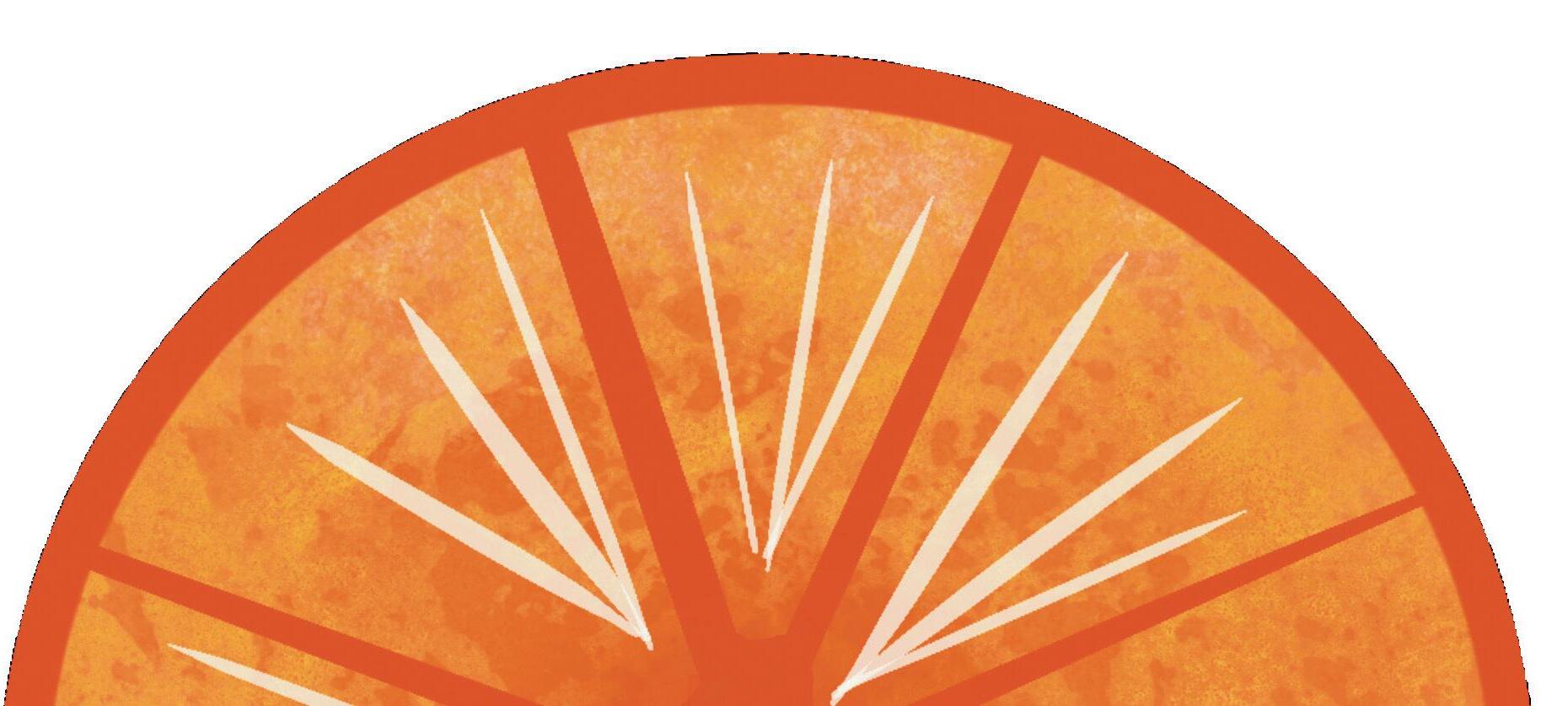
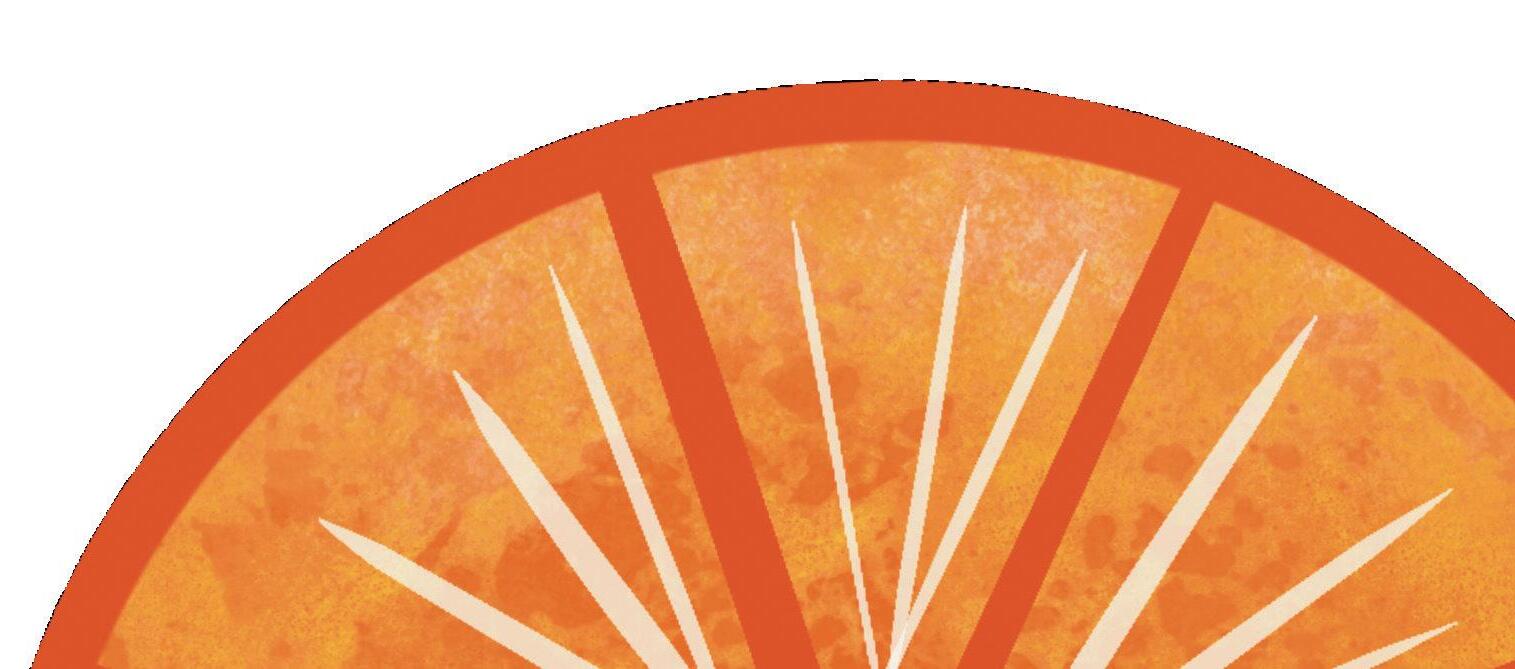
Azahares – 2024 78
The World Languages Department at UAFS
The literary magazine Azahares forms part of the array of professional opportunities which the World Languages Department at the University of Arkansas – Fort Smith provides its students and the greater region. The Bachelor of Arts in Spanish prepares students to meet the qualifications for employment opportunities in medical, business and government service, as well as to complete graduate work in Spanish. As part of the graduation requirement, semester study-abroad options provide Spanish majors with immersive experiences in the language and culture of Latin America.
As part of the focus on preparing students for success in a global society, the World Languages Department offers a Certificate of Proficiency in Spanish for the Helping Professions, with a specialization in either social services or healthcare. This certificate is open to current students as well as members of the larger workforce. In addition, students can obtain a Teaching English as a Second Language (TESL) - Certificate of Proficiency, the TESL minor, and an endorsement for Teaching English as a Second Language, grades P-12. This program of study exceeds the minimum credit hour requirements for the Arkansas Department of Education and addresses all the competencies identified for the licensure area. TESL Certification allows teacher licensure candidates to add an Arkansas state ESL (English as a Second Language) endorsement to their teaching license. Current UAFS students can add these courses to enhance their future employability. Teachers already working in the field can add this endorsement as well. TESL Certification is also designed for international students who are preparing to teach English as a Second Language abroad.
For more information on the World Languages Department at UAFS, please feel free to contact Dr. Mary A. Sobhani, Department Head, at Mary.Sobhani@uafs. edu. Visit us at www.uafs.edu or find us on Facebook @UAFS-World Languages Department and @UAFS Azahares.


79
University of Arkansas – Fort Smith
Call for Submissions
Azahares 2025
At Azahares, we’re looking for fresh work about the Latin@ experience: poetry that transports us into new perspectives; prose that makes us laugh or cry or sigh with satisfaction; art that lifts us towards the sublime or soothes us like un chocolatito caliente on a cold evening. We particularly enjoy publishing works that illustrate the best of what it means to be human.
Azahares is University of Arkansas-Fort Smith’s award-winning bilingual creative literary magazine. The primary purpose of this magazine is to provide community members and students with an arena for creative expression in English or Spanish, as well as a literary space for writing that presents the themes of the Latin@ experience.
The azahar, or orange blossom, is a flower of special meaning. Representative of new life and purity, azahares form part of the iconic tradition of the Latin@ world, embodying a freshness of spirit and perspective captured with this publication.
To view past issues:
https://uafs.edu/academics/colleges-and-schools/college-of-arts-and-sciences/ departments/resources/azahares.php
Submissions are open to all members of the community. To submit:
https://azaharesliterarymagazine.submittable.com/submit Azahares – 2024
80
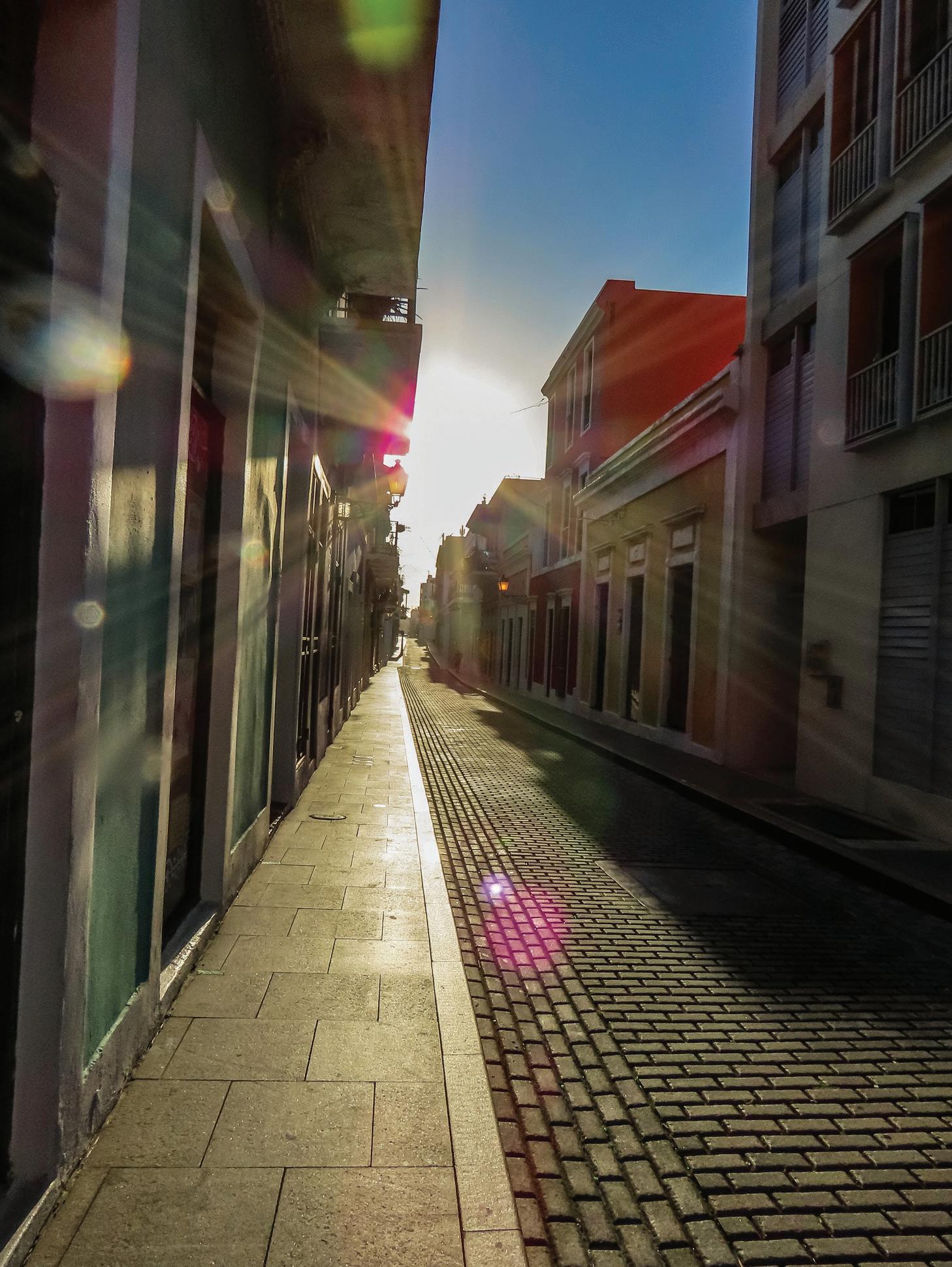
81
University of Arkansas – Fort Smith
Katie Hughbanks - Viejo San Juan Cobblestone - Puerto Rico
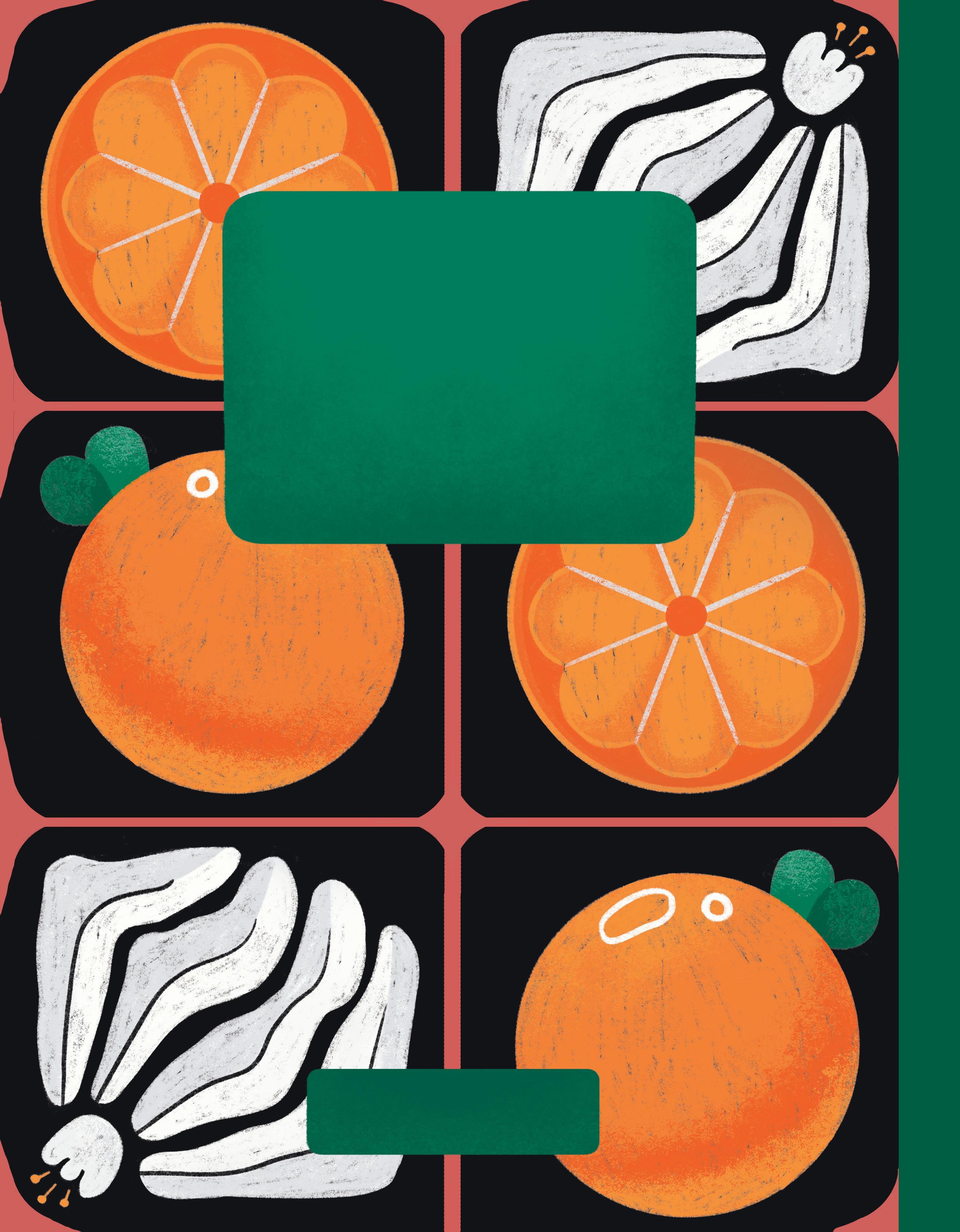
Lo que diferencia azar de azahar, lo que hace que el uno no huela a nada y el otro sí, es la h, que es una h de perfumería.
— Ramón Gómez de la Serna, Greguerías
 2024 Spanish Literary Magazine
2024 Spanish Literary Magazine
 Amanda Hubbard – El sabor de la tentación
Amanda Hubbard holds the copyright to uncredited artwork featured in this publication. Any use or reproduction of these images requires her explicit permission. For inquiries regarding the use of this artwork, please contact her directly at amandamchubbard@gmail.com
Amanda Hubbard – El sabor de la tentación
Amanda Hubbard holds the copyright to uncredited artwork featured in this publication. Any use or reproduction of these images requires her explicit permission. For inquiries regarding the use of this artwork, please contact her directly at amandamchubbard@gmail.com






























 by Casandra Hernández Ríos
by Casandra Hernández Ríos





 by Alejandra Herández
by Alejandra Herández



 por Gabriella Hernández Donato
por Gabriella Hernández Donato







 by Gloria Lopez
by Gloria Lopez


















